Union win

Big pay rises for long day care staff p2







The newspaper of the Independent Education Union of Australia NSW/ACT Branch (vol 44 #6) August 2024











































Big pay rises for long day care staff p2







The newspaper of the Independent Education Union of Australia NSW/ACT Branch (vol 44 #6) August 2024









































The IEU welcomes the historic announcement on 8 August that the federal Labor government will provide $3.6 billion to fund pay increases that will mean teachers in long day care centres throughout Australia will get a 15% pay rise above the current rate in the modern award – with 10% in December 2024 and another 5% a year later.
The pay increase also requires long day care centres to limit fee increases to parents to 4.4%.
The long day care sector provides quality early childhood education and care services to hundreds of thousands of children and parents all year round. Under the modern award, an experienced teacher in a long day care centre is currently paid $93,000 a year. The new top rate after the 15% increase will be more than $107,000. For this highly feminised sector, it’s a vital step towards closing the gender pay gap.
Sector-wide success
“This is an historic outcome of unions, the federal government and a group of 64 employers working together to lift pay and conditions across the long day care sector,” said Independent Education Union of Australia NSW/ACT Branch Secretary Carol Matthews.
“The education and care of our youngest children is important and indispensable work. These long overdue increases better reflect the valuable work of early childhood teachers in laying the vital foundations for our children’s development and lifelong learning.”


ieunswact
Newsmonth is published eight times a year (two issues per term) by the Independent Education Union of Australia NSW/ACT Branch.
Executive Editor Carol Matthews, Secretary, for and on behalf of the IEU Executive and members
Managing Editor Monica Crouch
Journalists Katie Camarena
Monica Crouch
Lucy Meyer
Sue Osborne
Katie Camarena
Photo Journalist
Graphic Design Chris Ruddle
Proofreader Helen O’Regan
Contributions and letters from members are welcome. These do not reflect endorsement if printed, and may be edited for size and style at the editor's discretion. Write to:
Newsmonth
485-501 Wattle Street
ULTIMO NSW 2007
GPO Box 116
SYDNEY NSW 2001
Tel: 8202 8900
Toll free: 1800 467 943
Email: ieu@ieu.asn.au
www.ieu.asn.au
This publication was produced on the unceded lands of the Gadigal People of the Eora Nation. The IEUA NSW/ACT Branch acknowledges the Aboriginal and Torres Strait Islander peoples as the traditional owners of the land, and pay our respects to their Elders past and present.
The pay rises, to be funded by the federal government, will help ease critical teacher shortages in long day care centres across the country. Early childhood teachers have been leaving in droves to take up roles in schools and other sectors where the salaries and conditions are substantially better.
Recognition from PM and Minister In announcing the funding, Prime Minister Anthony Albanese said to the media: “Unless we do something about wages in this sector, we won’t have a workforce. Early educators shape and change lives. We can never thank them enough for what they do, but we can make sure they are properly valued and fairly paid. Today our government is doing just that.”
Minister for Early Childhood Education
Dr Anne Aly said: “Properly valuing the early childhood education and care workforce is crucial to attracting and retaining workers.”
Minister Aly joined the IEU for a roundtable in late 2022 (pictured below), during which members shared heartfelt stories with her about how low wages, intense workloads and workforce shortages were impacting their lives.
Strong start but more to do
“While these pay rises are most welcome, more work still needs to be done,” Matthews said. “The gap in pay and conditions between teachers in the early childhood sector and those in schools is still too big. Teachers are teachers no matter the age of their students,
and we will keep fighting until there is equity between teachers in the early childhood education and care sector and those in schools.”
The IEU is currently discussing with the federal government how the funding will be distributed and the mechanisms to ensure the full increase in funding is passed on to teachers and educators as pay rises. It is expected this will occur through the proposed new enterprise agreement which will include not only the pay rises but other improved conditions aiming to boost workforce attraction and retention, professionalism and service quality.
The IEU joined with the United Workers Union (UWU) and the Australian Education Union (AEU) to access the supported bargaining stream in new industrial relations laws passed as part of the Secure Jobs Better Pay Act in 2022. The provision enables unions to bargain for enterprise agreements with groups of employers in a sector rather than in individual enterprises. The laws aim to address the long-term failure to properly value work in feminised sectors such as early childhood education and care.
“This outcome better values the work that teachers in long day care centres do every day,” Matthews said. “Long day care staff, children, parents and the community are all better off because of this decision.”
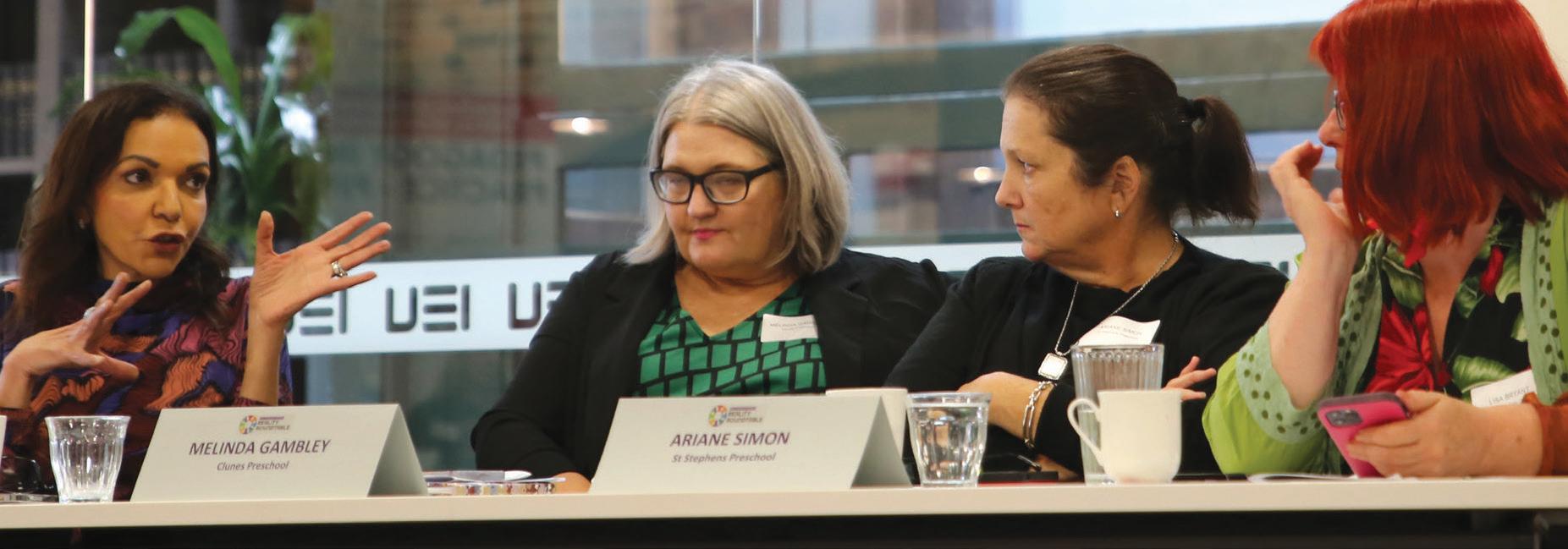
Liz Heggart Vice President Systemic
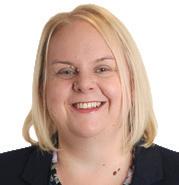
Workplace assaults are never acceptable, so let’s talk about making our schools safer.
A study into workplace injury undertaken by Monash University in 2022 found that staff in Australian schools claimed workers compensation for mental health conditions and assault-related injuries at higher rates than other professions.
As well as having a negative effect upon the health of teachers, dealing with these issues is also limiting the work of teachers. In July this year, the ABC reported on a Queensland government survey of 15,500 teachers and principals in which 50 per cent of respondents said the main issues taking time and attention away from educating students was student behaviour and reporting of incidents.
Assault-related injuries are not just physical; they also include verbal and online attacks that can have a detrimental effect upon a staff member’s psychosocial health.
A recent phenomenon exacerbating this problem is the misogyny and sexism experienced by mostly female staff at the hands of their male students. No one should have to put up with this or any other kind of abuse in their workplace.
The fact that teachers and support staff work with children is often seen as a reason to excuse it – but that’s not satisfactory. The union movement has long fought for respect and decency at work for everyone.
Record all incidents
To challenge the current state of affairs, the first step is recording these incidents. In the Parramatta diocese we have an Assault Register for staff to report incidents. This includes student-on-student incidents as well as student-on-staff incidents.
Information on the internal Oscar site states: “The Assault Register should be completed when the actions of a student have resulted in
harm occurring to staff and/or students, or where a student’s actions may have had the potential to cause harm (that is, harm narrowly avoided).”
It goes on to say: “The information entered into the Assault Register can assist with identifying any suitable support mechanisms and may help to develop appropriate student management strategies in consultation with relevant parties (for example, the Student Wellbeing and Behaviour Team).”
Of course, all schools have their own online management systems, such as Compass, to record incidents. The problem is that data from these records is not accessible in a way that is useful to staff.
If we are to combat assaults on staff, it’s crucial to ensure that all employers are aware of the impact of assaults and that they take action.
Through my work as an IEU rep and attendance at sub branch and Council meetings, I’d like to ensure staff know about their respective Assault Register and its relevance to their protection and wellbeing.
Employers must act
Whether physical or verbal, assault is not a failure of classroom management or behaviour policy. It’s a serious incident that needs to be addressed by the employer. Your employer has a responsibility to deal with matters of assault.
Under the NSW Work Health and Safety Regulations, there is an expectation that the person conducting a business or undertaking must implement control measures for both physical and psychosocial risks (from 1 October 2022).
If incidents occurring in schools are reported through the Assault Register, it compels our employers to take action to provide meaningful and effective measures to minimise the risks, both physical and psychosocial, and therefore to improve safety for all staff.
I urge all members to record all assaults in the Assault Register. Don’t hold back on the detail, insist on action from your leadership teams and together let’s make our workplaces safe again.
In other dioceses, I urge you to check the process for recording assaults at your school, and follow up with your rep if there isn’t one –everyone’s safety depends on assaults being dealt with appropriately.
Carol Matthews Secretary
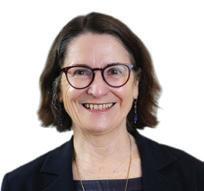
The latest bargaining meeting between the IEU and the Association of Independent Schools (AIS) concerning proposed new multi-enterprise agreements (MEAs) for teachers and professional and operational staff employed in NSW and ACT independent schools was held on 7 August.
Pay offer for teachers
At the meeting, the AIS provided a copy of the proposed teacher pay scale from February 2025 and advised further pay rises of 3% per annum would occur in 2026 and 2027.
This pay scale was also distributed to teachers in independent schools on the same day.
Model pay structure in 2006. Other teachers were deemed Band 3 because if they had been classified as Band 2, they would have suffered a pay reduction on moving from a government or Catholic school. It is unreasonable to penalise these teachers now by denying them access to the proposed Accomplished Teacher allowance of approximately $5000.
Movement to the new scale
The AIS advised the IEU about its draft proposal for teachers to move to the new scale.
Under this draft, some existing experienced teachers would not move to the new scale based on their qualifications and experience but instead would go to a lower step as a cost-saving measure.
The IEU expressed strong opposition to this proposal as it would mean those teachers would continue to be paid less than the NSW government school rates and would not receive the rates suggested by the table above.
The AIS has not put this proposal formally and has stated it is prepared to review it based on IEU feedback. We will provide more information to members when the AIS confirms its position.
The AIS is proposing to increase existing promotions allowances by 3%. It is not clear whether, in the future, Coordinators and Deputies would be eligible to receive both their Coordinator/Deputy allowance and the new Accomplished Teacher allowance (remembering that only teachers who have gone through the ISTAA process would get this Accomplished Teacher allowance).
There are some changes proposed to definitions of promotions positions and other provisions that may affect teachers in promotions positions in Hybrid Model schools.
The rates in the offer are 6% above the rates applying in NSW government and Catholic systemic schools in October 2023. But we expect these teachers will gain further increases in October this year (anticipated to be 3% to 4%). After this increase, the margin between the proposed AIS rates and NSW government and Catholic systemic schools’ rates will be much smaller, possibly only 2% to 3%.
The proposed AIS rates are also below the current teacher pay rates that apply in NSW Catholic independent schools.
This pay offer is unacceptable.
In the ACT, the scale would include one more step to reflect the classification structure in ACT government schools.
Band 3 experienced teacher
The AIS is proposing that teachers who are classified as Band 3 but did not go through the ISTAA process because they were ‘deemed’ Band 3 would be treated less favourably than those who were accredited by ISTAA.
Many deemed teachers were employed prior to the start of the Standards
The IEU is still discussing our claim for improved conditions with the AIS. The AIS has not withdrawn its proposal to remove 15 days personal/carer’s leave on commencement at a new school and regulation of work required during school holidays.
Professional and operational staff
The union has not received a pay offer for this group. The AIS informed the IEU that a pay offer may be provided by the next meeting on 23 August.
meetings
Pay and working conditions define the quality of your working life. It is crucial for members to engage with this process for the new MEAs. Your IEU organiser is happy to meet with members at your school to unpack and explain the negotiations so far.
Please also discuss these issues with colleagues in your school who may not yet be IEU members and encourage them to join. The more members we have, the stronger our bargaining power.
David Towson Deputy Secretary

The Organisation for Economic Co-operation and Development (OECD) has reported in its Employment Outlook 2024 that real wages in Australia are almost 5% lower than they were before the pandemic. The OECD says real pay is 4.8% lower than in the fourth quarter of 2019 and that this is one of the largest drops in real wages among OECD countries.
Not just for the love of it
On the day the IEU held a media event to file the preschool supported bargaining application with the Fair Work Commission, a question was put to NSW Premier Chris Minns about the IEU’s claim for a 25% wage increase for preschool teachers to help community preschools address the chronic teacher shortage in this sector.
Minns told 10News, “That’s fair enough, but there’s limits to what we can provide in terms of where the money will come from. Nobody would pursue that job because they want to become rich, they do it because they passionately believe in the work that they’re doing.”
The IEU’s Vice President for Early Childhood Services, Michelle Thompson, appeared in the same 10News report saying, “Working just for the love of it is not going to pay our exorbitant rent or mortgages or provide for our own families.”
Public funding priorities
Our members are acutely aware of the importance of strong wages growth for our colleagues in government schools. This is why IEU members in
Catholic systemic schools took joint strike action in 2022 with members from the NSW Teachers Federation. The award for government school teachers expires in October this year, as does the Catholic Systemic Schools Enterprise Agreement.
What the NSW government is thinking in respect of pay rises for government school teachers is anyone’s guess. The government is speaking about constraints around government sector funding, reflected in the Premier’s comments above.
Such concerns are not unfounded, but as with all decisions about public funding, the question is one of priorities and, in our view, education must be a high priority.
The NSW government has offered public servants a 10.5% wage increase (inclusive of a 1% increase to superannuation) across the next three years. Public sector unions are seeking a better deal.
Industrial action not taken lightly
Members of the NSW Nurses and Midwives’ Association have been taking rolling stop work action at hospitals across the state seeking pay rises to address their concerns that nurses are moving interstate for higher wages. There has been industrial action in the light rail service in Sydney and elsewhere as essential workers seek cost-of-living relief after years of wage suppression and recent inflationary spikes.
Working people do not take industrial action lightly and, as our members know, there are significant hurdles to clear before protected industrial action can be taken. As inconvenient as stop work action can be for the public, the workers themselves are the ones most inconvenienced by the need to take such action.
Saving capitalism from excesses Economist Ross Gittins recently wrote in the Sydney Morning Herald, “When it comes to industrial relations, it’s always the unions that look bad, never the employers. That’s because the world is run by bosses. When everyone does what the boss tells them to, there’s never a problem … It’s always greedy workers who strike and make you walk to work, never intransigent bosses. The media almost invariably fall for this characterisation.”
Gittins explained: “Not enough people understand the unions’ role in the economy and how they go about advancing their members’ interests. The mistake is to imagine that the bosses represent capitalism, whereas the unions represent anti-capitalism …The true contest is between the representatives of the two main ‘factors of production’: capital and labour.
“So unions are an integral part of the modern capitalist system. They’re a countervailing force that helps keep the system in balance. Take out the unions, and capital ends up with almost all the money, and the households whose income comes from selling their labour have very little. In which case, the capitalists have no one to buy their products. Unions save the capitalists from their own excesses.”
Workloads are still a primary concern for our members in schools, but without attracting people into the profession and holding onto current staff, work intensification issues cannot be resolved.
We must continue to press for decent rates of paywhile addressing other concerns of workloads and conditions if our members are to be able to pay their exorbitant rent or mortgages and provide for their families. We do this best when we are united with purpose.
Amanda Hioe Assistant Secretary

Rights hold their value because they are enshrined in legislation or other enforceable instruments. When rights can be taken away, they become mere privileges.
For IEU members, our rights are contained in the various enterprise agreements that we negotiate on your behalf. These rights are not permanent unless we actively fight to maintain them.
Every time we engage in bargaining, all those rights that we have won through longstanding campaigns are under threat. This is why we need our members to unite to do two crucial things: protect existing rights to beneficial working conditions fight for better rights to improve our working conditions.
Protecting existing rights
A simple glance at our NewsExtras will show you that in every bargaining session, employers try to take away the rights we have won. For instance, in our current independent schools’ campaign, employers are attempting to remove 15 days of paid personal leave available to teachers upon the commencement of their employment. When union members stand together, we increase our bargaining power to protect these rights.
Fighting for better rights
Each bargaining process presents an opportunity to create more rights. Our members inform us about the important issues that can improve your working lives in schools and other workplaces.
How to be more engaged There are numerous ways to get involved in the union and have a greater say in shaping our way forward:
Encourage your colleagues to join the IEU: Our membership density is the source of our power to protect and fight for your rights. Joining is easy: ieu.asn.au/why-join-us
Attend your chapter meetings: Chapter meetings are the perfect settings to identify issues at your school and discuss how matters will impact you at the school level. Attend sub branch meetings: These meetings provide a great opportunity to network with colleagues from schools and workplaces in your local area. Sharing your story can reveal that you are not alone in your experiences.
Finally, remember that ‘union’ is not a dirty word. You are part of the union because you believe in protecting your existing rights and securing them for those who come after you. Most importantly, being part of a union means belonging to a community of your fellow professionals.

Lyn Caton Assistant Secretary
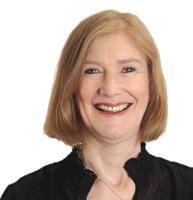
On 24 July, new K-6 syllabuses were released for teachers in NSW. The transition from a skills-based curriculum to one emphasising knowledge and ‘explicit teaching’ represents a shift in pedagogical philosophy for NSW.
Explicit teaching involves a highly structured approach where teachers provide clear, direct instruction followed by guided practice. This method aims to ensure that students understand foundational concepts before moving to independent work.
In contrast to inquiry-led learning, where students explore topics and discover knowledge independently, explicit teaching requires teachers to break down information into manageable parts and systematically build students’ understanding.
It is scripted, with the expectation that specific content and knowledge are delivered in a consistent manner. For example, in an English class, vocabulary and context are explained before reading a text, enabling students to grasp the material more fully.
Lessons from Canberra
Explicit teaching has been in place in the Catholic Archdiocese of Canberra and Goulburn since 2020 – providing an insight into what these changes may mean for NSW. Explicit teaching was introduced through the Catholic Education Canberra and Goulburn (CECG) Catalyst initiative, which aimed to embed evidence-based teaching practices.
Over 1700 teachers and 21,000 students have participated in this journey. Buzzwords such as repetition, interleading and spacing are the catchcry shared by some of our members with experience in this space.
Teachers were initially given 30 minutes additional release time and allotted pupil-free days to support Catalyst’s implementation. Resources were gradually developed and shared to alleviate the increased workload.
Member feedback
Members in this process will tell you that while this support was provided, along with some resources, initially there was a huge increase in workload as teachers were creating their own resources for some curriculum areas. From dialogue with members in the ACT, as well those in NSW who have trialled explicit teaching, the feedback is clear: to make this transition work, adequate time, support and resourcing are essential. Despite the initial challenges, the response from staff has been largely positive. One teacher member noted, “You need to check what you think you know at the door and be prepared to try it –when you see the data, it is a no-brainer.”
Explicit teaching has proven effective in improving student outcomes, with teachers reporting significant time savings and improved student confidence and learning retention.
A controversial transition
While there has been some positive feedback on the Catalyst initiative, explicit teaching remains divisive. Critics argue that it
stifles creativity and critical thinking, essential components of a holistic education. Others worry about the potential for increased teacher burnout due to the intensive preparation and delivery required. Teacher members have made such comments as:
“It is too prescriptive and doesn’t respect the teacher’s professional judgement.”
“I have no voice at the end of the day.”
“It’s a sausage machine approach.”
“We need time to prepare resources – it’s a massive increase in workload.”
However, proponents point to the clear structure and focus on foundational knowledge as key benefits. The success of explicit teaching hinges on its implementation. As one teacher observed, “Some of it is counterintuitive, like going faster and doing more to support attention, instead of slower. That’s not to say you can’t go slow and there are of course times that warrant it.”
Opportunities and challenges
In light of the experiences of members in Canberra and Goulburn Diocese, the new NSW curriculum and the explicit teaching model represent a bold step towards reshaping education.
While the transition brings both opportunities and challenges, it is essential to continue evaluating its impact on teachers and students. As we navigate this new terrain, the voices and experiences of IEU members will be crucial in shaping the future of teaching and learning in NSW and the ACT.

IEU members are invited to apply on behalf of their schools, colleges or early childhood centres for one of six grants of $3000 each, sponsored by Teachers Mutual Bank (TMB) and the union, to help with environmental projects.
TMB and IEU have a proud history of funding education projects that bring sustainability initiatives to life.
Typical projects include habitat conservation; biodiversity and tree-planting; outdoor learning areas; vegetable gardens; water and energy saving; waste, recycling and composting; and Aboriginal and Torres Strait Islander environmental projects.
Eligibility criteria include the viability of the project, a link to a broader environmental education strategy, and effective project management.
Applications open: Monday 22 July 2024
Applications close: Friday 11 October 2024
Winners will be announced in October 2024, with a formal presentation at the AGM on 26 October.
Successful applicants are required to provide photos, videos and a project update in September 2025 so we can see the progress and benefits of the project and report on it at the 2025 AGM.

SCAN THE QR CODE TO APPLY NOW
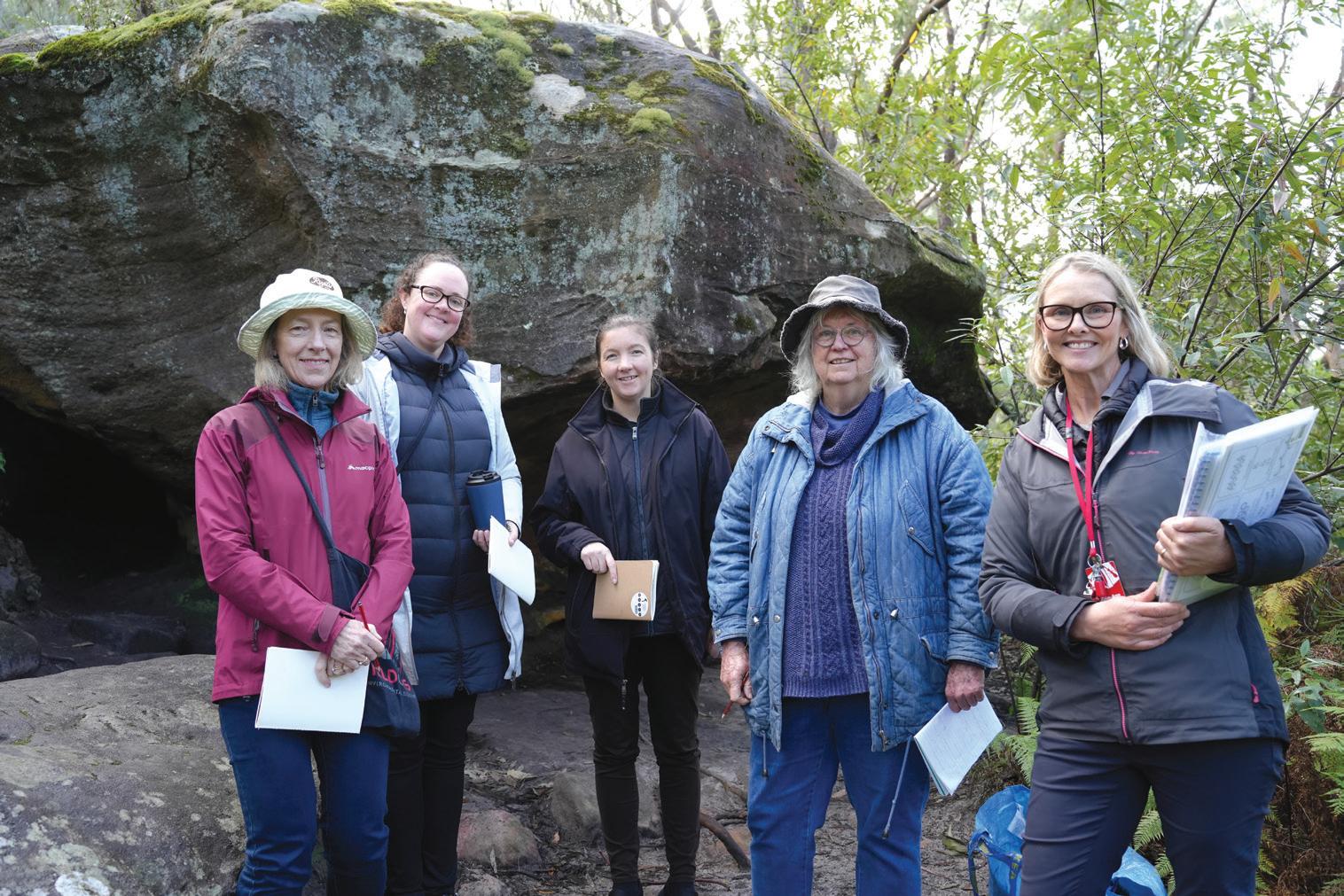

In early August, IEU members from far and wide gathered among towering eucalypts at the Field of Mars Environmental Education Centre on Wallumedegal Country for a day of professional development in the great outdoors.
Early childhood, primary and secondary school teachers explored the world beyond the classroom through engaging workshops and hands-on learning experiences.
After starting the day seated around the fire, we moved on to a multi-sensory walk along the wetlands, starting under the ancient Casuarina trees.
Local Aboriginal elders say these trees hold great cultural significance as grandmothers would tell children to come to the tree for protection if they got lost. Casuarina seeds act as dream catchers – children would pick them up, rub them between their hands and put their bad dreams into the seed. The seeds were thrown away with the bad dreams inside.
During the walk, we immersed ourselves in activities that reignited our sense of awe and wonder. One activity involved using a small magnifier to zoom in and observe nature through a different lens, with the lens acting as a gateway to connect the viewer to the natural world.
After morning tea, IEU members broke into groups to further explore ways to take core curriculum learning outdoors.
Early childhood teachers: Connecting with Country Through a series of fun activities designed to support inquiry learning, members began their hands-on workshops by building a bird’s nest, leading to a broader discussion about bird behaviours.
Next, we headed into the bush carrying journey sticks, which are used to tell the story of our walk through the items we collect and attach to them along the way. Other activities included scavenger hunts, bush bingo, making paint from rocks, memory games and building a miniature national park.
Throughout the day, members shared information about environmental initiatives at their centres. Driven by her passion for nature pedagogy, Leanne from Charlestown Child Care and Early Learning Centre added regular bush walks to her centre’s program. “The benefits have surprised me,” Leanne said. “Children

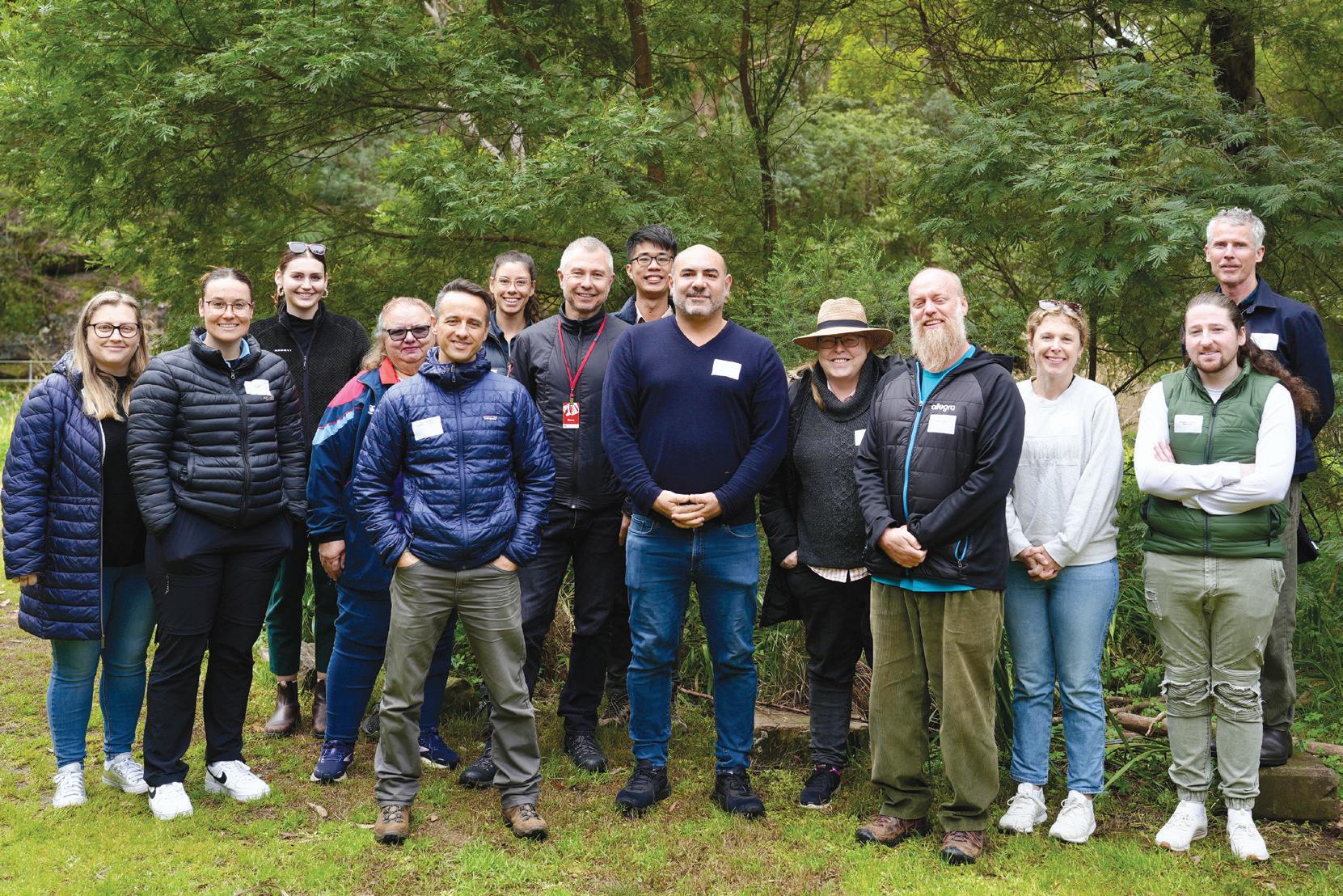
go home and take their family on a walk; they are being the leaders.”
Amanda and Annette from West Epping Preschool have developed close relationships with local Dharug knowledge holders and introduced Dharug language into their preschool’s Acknowledgement of Country and other areas of learning.
Children at their preschool begin the day outside all year round. “We talk a lot about Country and caring for Country,” Annette said. “We start outside and part of that is to give children predictability and structure. It allows them to feel the difference in the seasons and what the environment looks like.”
Lisa and Rita from Sutherland Presbyterian Preschool said environmental education is embedded in everything they do – from recycling and water tanks to worm farms and compost. “Connection to the land is important to us,” Lisa said. “We get lots of birds and we teach the children to care for them,” Lisa said.
Lisa has been an IEU member for 30 years, having joined when she was at university. She says it’s important to promote sustainability “not only in the centre, but also with families and the broader community”.
Primary school teachers: Connecting with curriculum
Through nature-based activities, primary teachers explored ways of connecting nature to the English, maths and science curriculums.
Joanne, from The Waldorf School in Armidale said she attended the conference to get more ideas and to see what other schools are doing. “Our garden is the heart of our school and from that comes our environmental program,” she said.
Reflecting on her day, Joanne said, “There is lots to learn and see. It makes everything feel more possible and you can see how easy it is. It’s not hard to do environmental stuff. It feels hard and it can feel like just another task. But you’ve just got to get out there and do some activities.”
Tracey, a member of the inclusive learning team at Roseville College, spoke about the importance of outdoor education for mental health and wellbeing. Tracey was looking for ways to incorporate environment education into inclusive learning settings.
“I have a love of environmental sciences and also try to incorporate Aboriginal learning into the curriculum,” she said. “This type of learning is something you can implement no matter where you are.”
Secondary teachers: Connecting with field work
With a focus on multi-sensory fieldwork and place-based discovery, secondary science and geography teachers explored new ways of integrating outdoor learning into their teaching programs. Activities included measuring the height and circumference of trees to tracking bandicoots and analysing soil using different methods.
Dany and Benn came down from Allegra College in Coffs Harbour, which provides students in Years 9 and 10 with a safe and inclusive space to study. “It is great to see nature connection taught in a secondary setting – until now, I’ve only seen it talked about in a primary setting,” Benn said. “So to tie it in with the field work we do and add depth to that, that is why I am here as a science teacher.”
Dany, who is on the executive at Allegra, said, “We’re very lucky to have a Botanic Garden in Coffs Harbour. Benn often takes the students out. We’re looking at how we can enhance our field work program and give students a more authentic learning experience.”
Nancy teaches geography at a Catholic school in south-western Sydney. She spoke about the connection between religion, geography and environmentalism. “I can see how you can link the geography and the religious syllabus, especially through the stewardship angle,” she said. “And for student wellbeing, outdoors is an ideal place to take them.”
Katie Camarena Journalist
Passionate about the environment?
Bring your sustainability ideas to life through the IEU’s 2024 Environment Grants program. See page 4 for details.
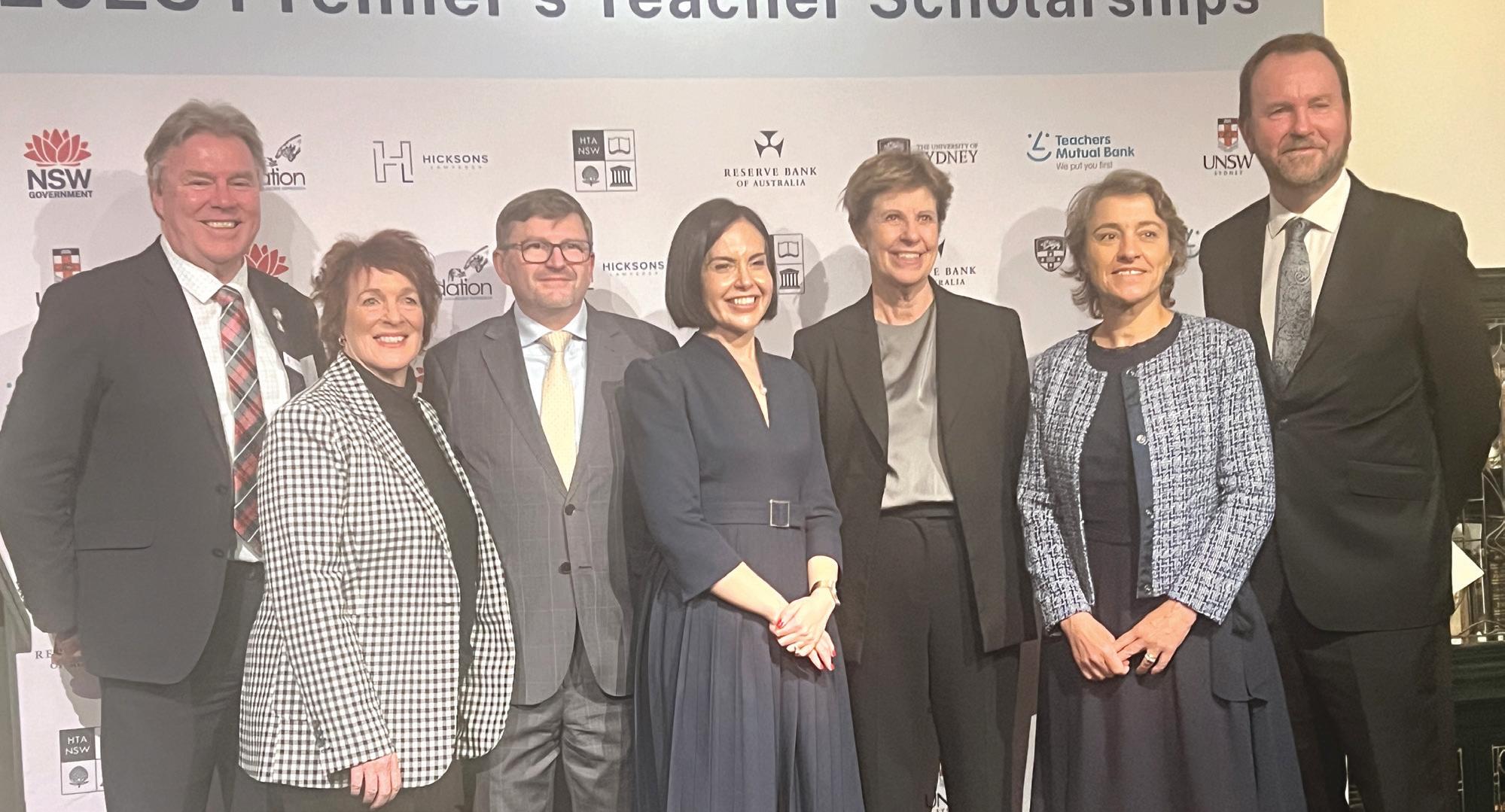
Congratulations to IEU members Yang Sun, Sharon Draper and Dr Geoff Gates, who were among 17 educators across NSW to receive a prestigious Premier’s Teacher Scholarship. The award recipients were announced at a ceremony held at the NSW State Library on Thursday 1 August. Scholarships are awarded to school-based teachers in NSW to explore best practice in their chosen focus area.
Yang, a teacher from Marist College Eastwood, was awarded the 2025 NSW Premier’s Anika Foundation Youth Depression Awareness Scholarship. Yang’s scholarship will enable her to explore ‘research-based strategies that every educator should teach’ as she seeks to ensure educators are well equipped with the professional knowledge and skills to provide holistic support to adolescents rather than predominantly focusing on an academic curriculum.
Sharon, a teacher from Calrossy Anglican School in Tamworth was awarded the 2025 Premier’s Reserve Bank of Australia Economics Scholarship. Sharon will use her scholarship to explore The right market conditions: The survival of economics in regional and rural high schools
Geoff, Director of Learning and Teaching at The Hills Grammar in Kenthurst, was awarded the Premier’s Creativity across the Curriculum Scholarship. This scholarship is for recipients to explore the multi-faceted concepts of creativity and innovation that can be applied to several fields in education through a variety of approaches and conceptualisations.
Katie Camarena Journalist
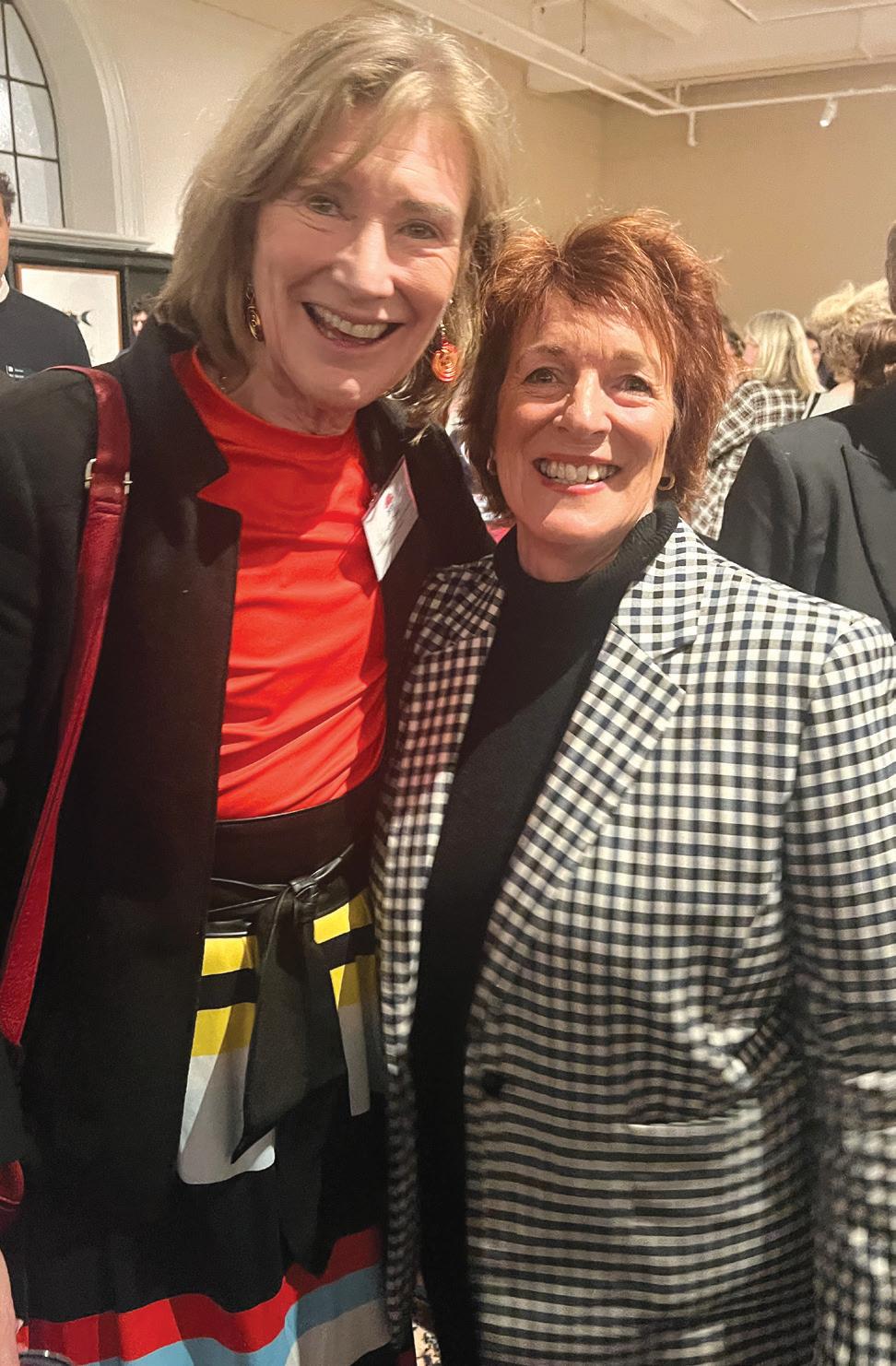
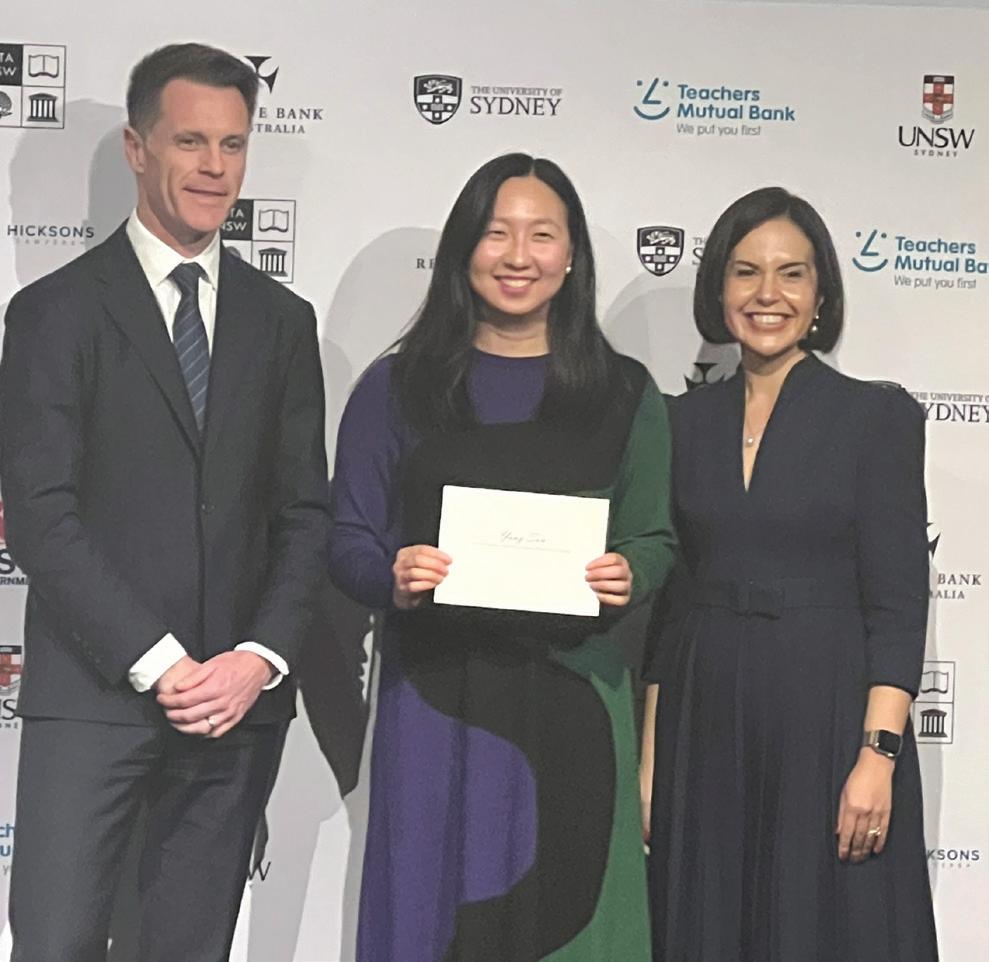
The world’s teacher unions met in Argentina for the five-day Edcuation International 10th World Congress in early August. EI is the global federation of teacher unions.
More than 1000 delegates from 380 organisations in 150 countries came together, representing more than 30 million members around the world. It was the first Congress since 2019.
Key business of the Congress centred on a 2024 UN Report, United Nations Secretary-General’s High-Level Panel on the Teaching Profession
The findings of the High-Level Panel reflect our daily experience in Australia: “The HighLevel Panel notes with alarm the persistent and increasing teacher shortages around the world. These shortages are exacerbated by the continued attrition of teachers, the use of contract and unqualified personnel to fill teacher gaps, the lack of professional development and support, inadequate working conditions and salaries, and the enormous hardship of teachers working in crisis contexts.”
The High-Level Panel made 59 recommendations to address the problem.
The solutions are familiar: investing in teachers; promoting equity, diversity and inclusion among the teaching workforce, with incentives and support for teachers working in hard-to-staff areas and in crisis-affected regions; elevating the status and dignity of the profession; ensuring teachers are well-qualified with good induction and mentoring programs for new teachers; and developing strong
and collaborative
Early childhood education was noted as requiring salaries commensurate with other levels of education, and the importance of gender pay equity was also cited.
The High-Level Panel called on the UN to develop an up-to-date international convention on the teaching profession and establish a global fund to support teachers in crisis regions.
It was clear during the Congress that even though we have much work to do to achieve these aims in Australia, the situation for teachers in some countries is much worse.
Delegates spoke of teachers’ union officials being arrested or forced to flee in some countries. A Turkish teacher unionist was arrested on his way to attend the Congress. EI has lobbied to support unionists in Haiti and Iran who have been imprisoned.
In other countries, the wages of teachers and education support staff are being cut. This is occurring in Argentina, where inflation is 200 per cent per annum, and education expenditure has been slashed drastically. In Argentina, many school building projects have been cancelled mid-construction and universities have lost all government funding.
Commercialisation of education
Speakers at the Congress addressed the trend towards commercial, for-profit delivery of education. This model removes the obligation from government to provide universal education and often allows private providers to charge fees and cut the quality of the education they provide.
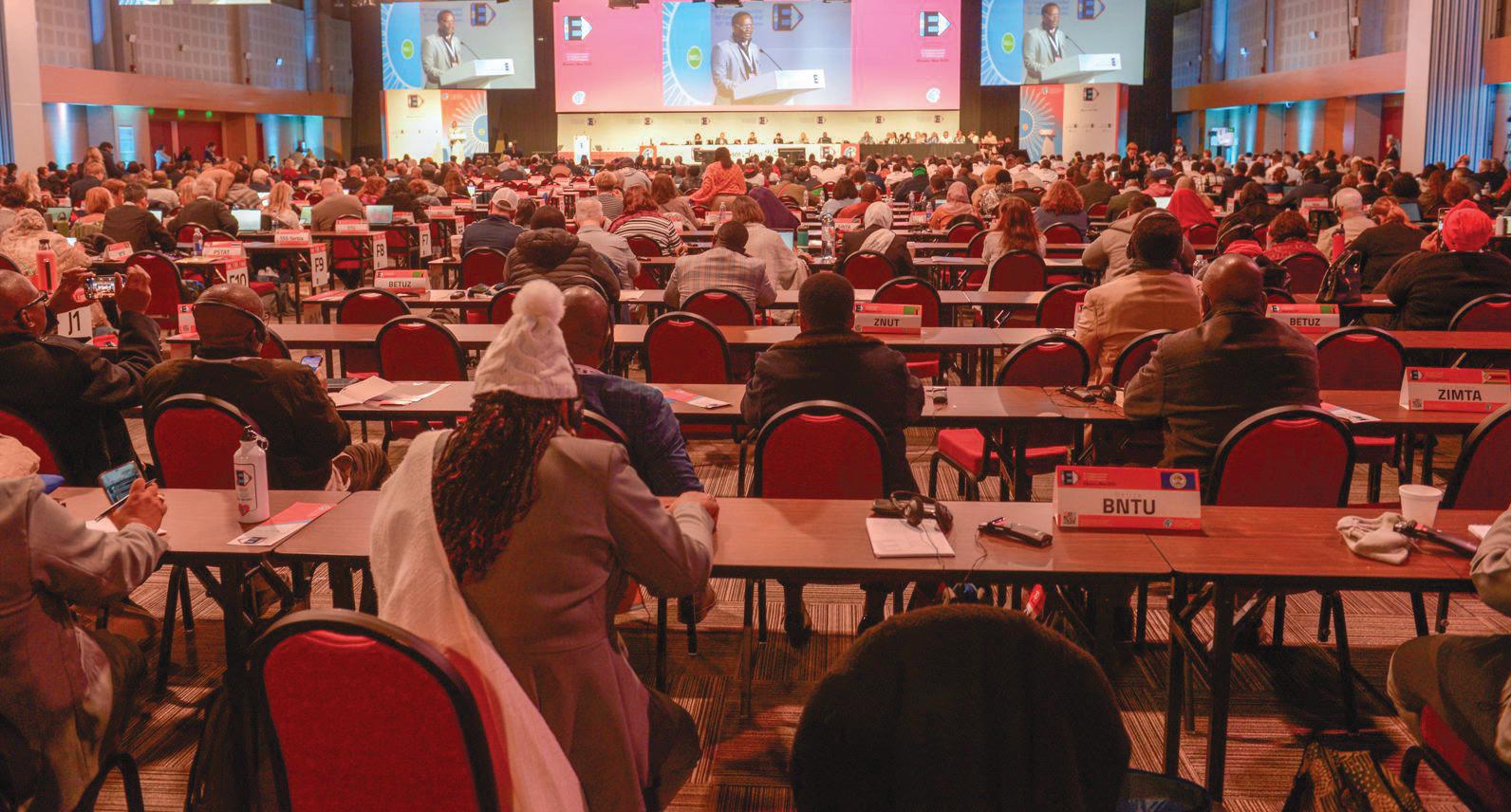
This has been proposed in Argentina, accompanied by the austerity program in public spending described above.
Unionists from Korea described risks arising from the commercialisation of education and public/private partnerships, including the potential for misuse of student data and the emerging trend to use AI to replace teachers by corporations providing school education.
Other issues
Issues such as pay equity for early childhood teachers, improving wellbeing of teachers, addressing violence and discrimination in education, gender equity in unions and the situation of teachers and students in Gaza were all discussed in workshops or plenary sessions.
Role of Education International EI provides support for teacher unions that face financial, logistical and political barriers in achieving fair outcomes for their members. Bringing unionists together for the Congress highlights these issues and provides endorsement of the work EI is doing in lobbying the UN and governments to address the crisis in the teaching profession around the world. Addressing these issues is as vital in other countries as it is in Australia.
Carol Matthews Secretary
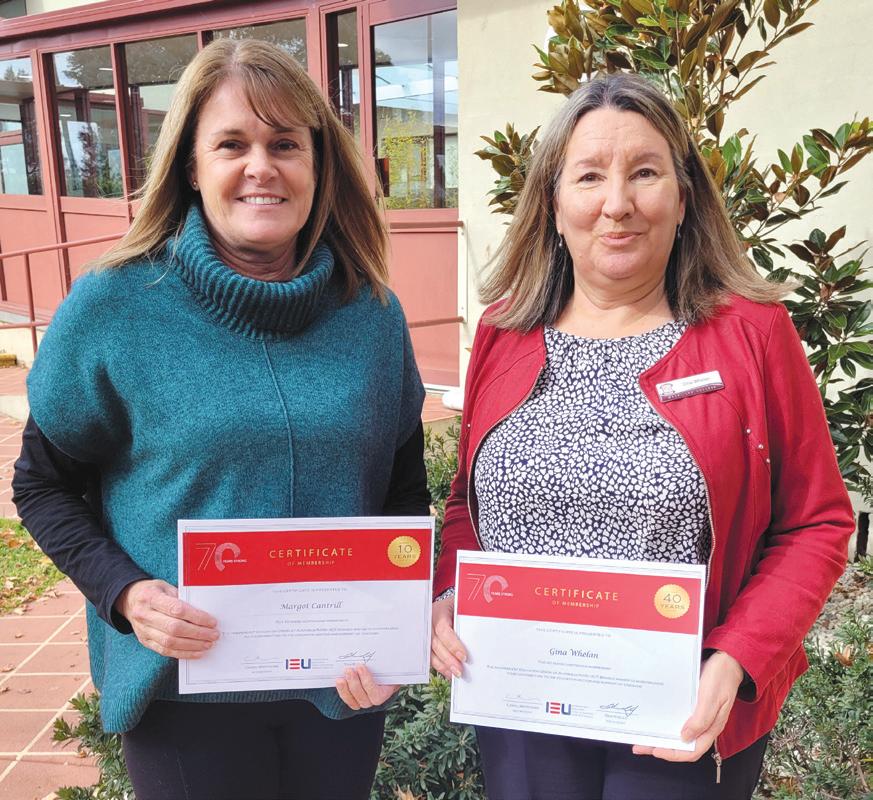

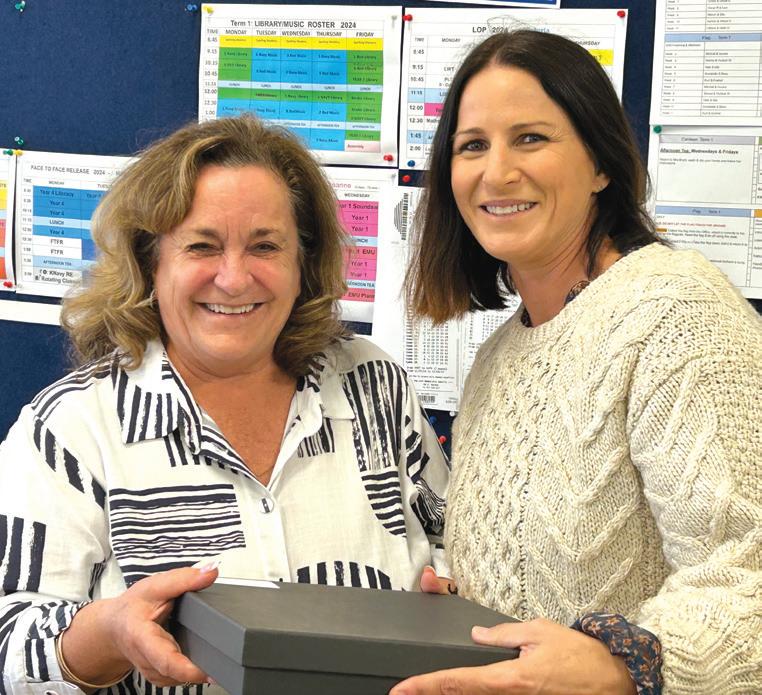
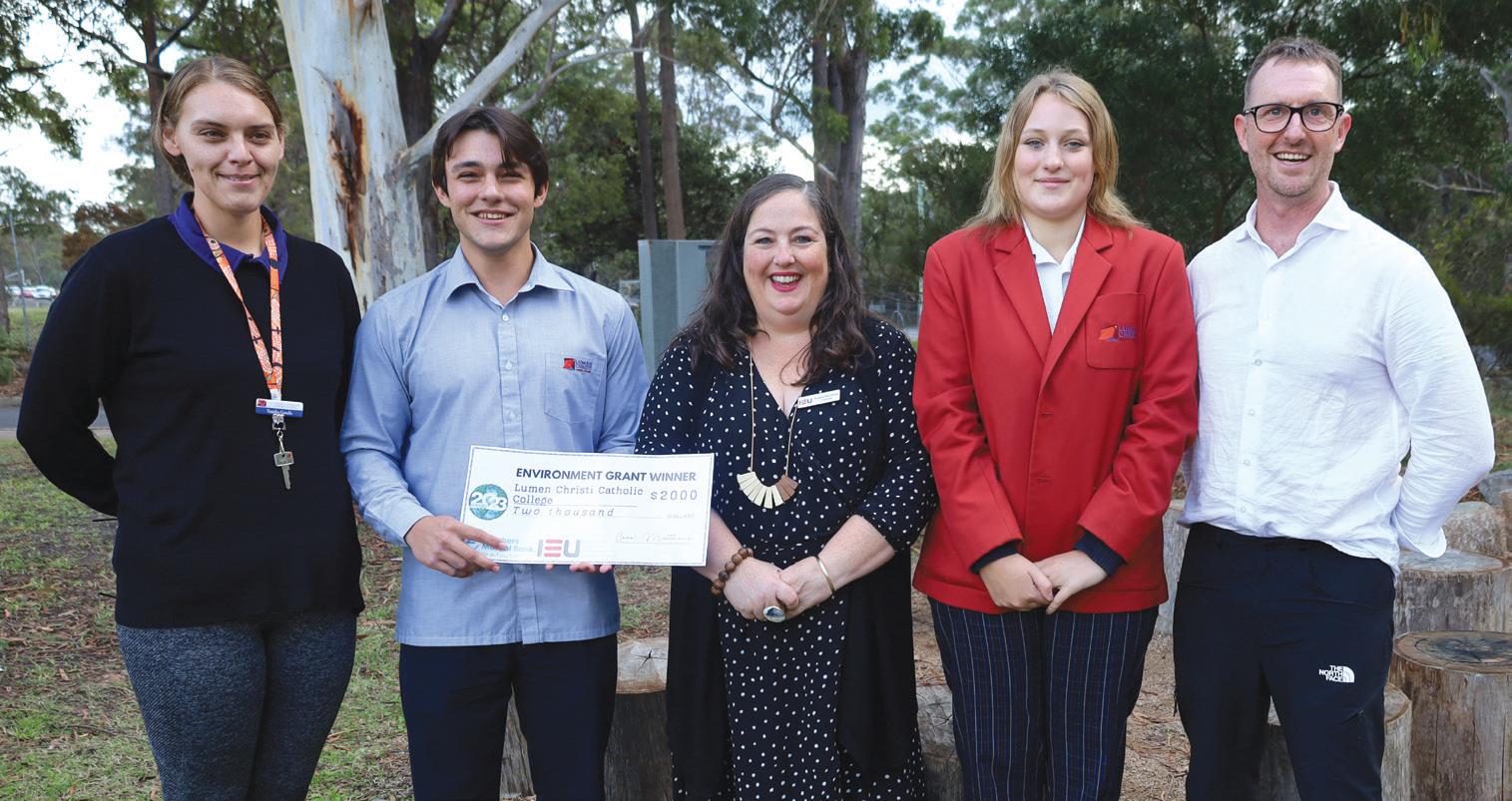



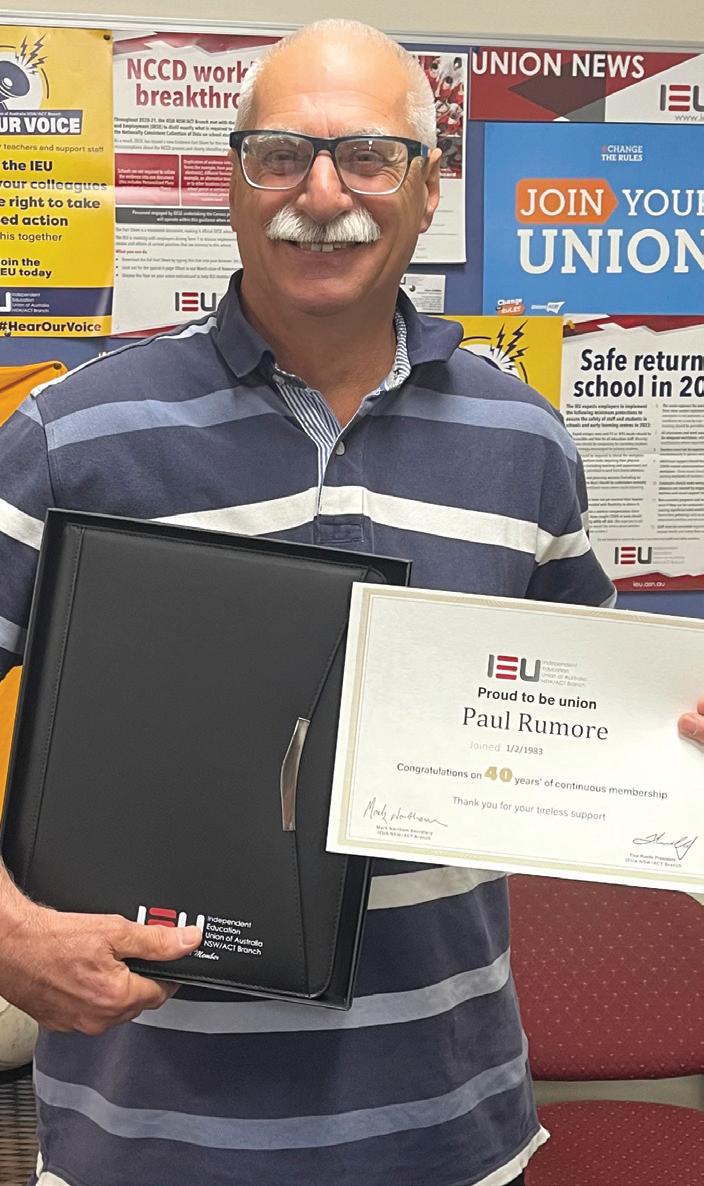
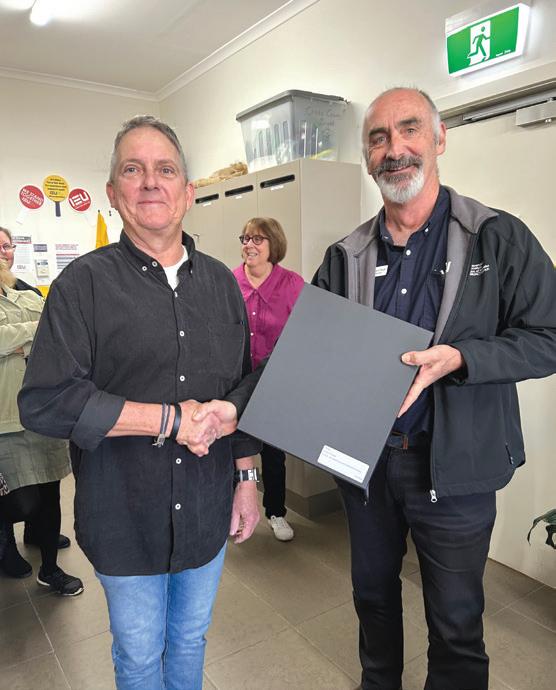
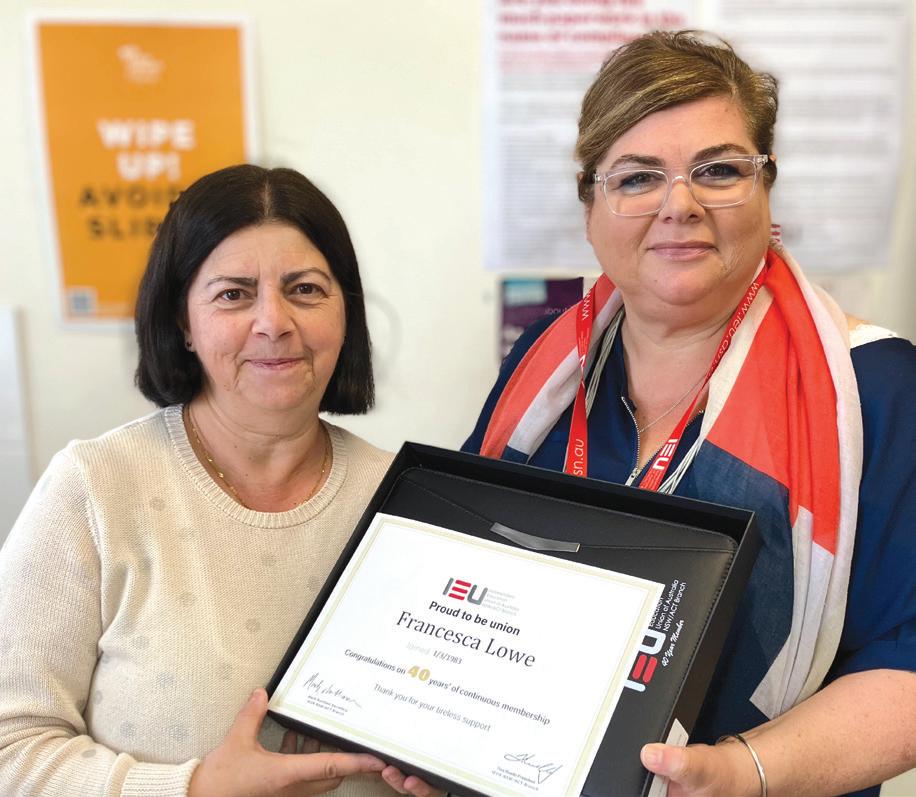
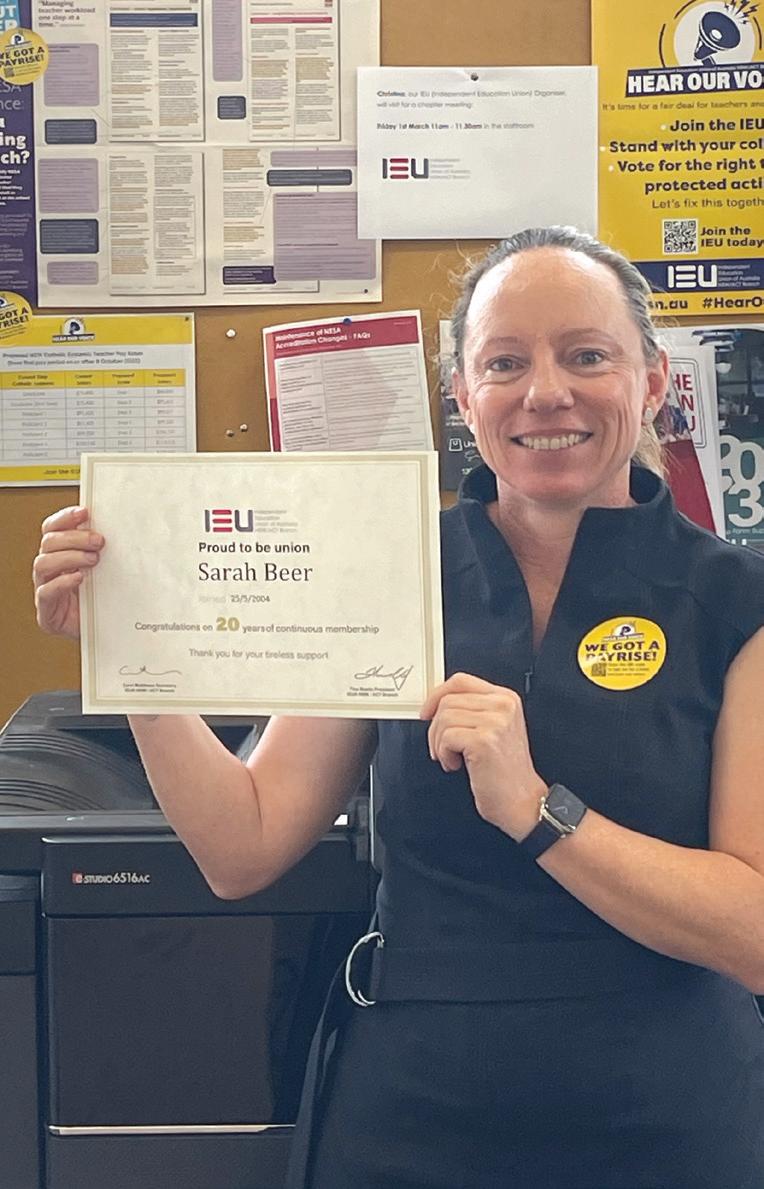
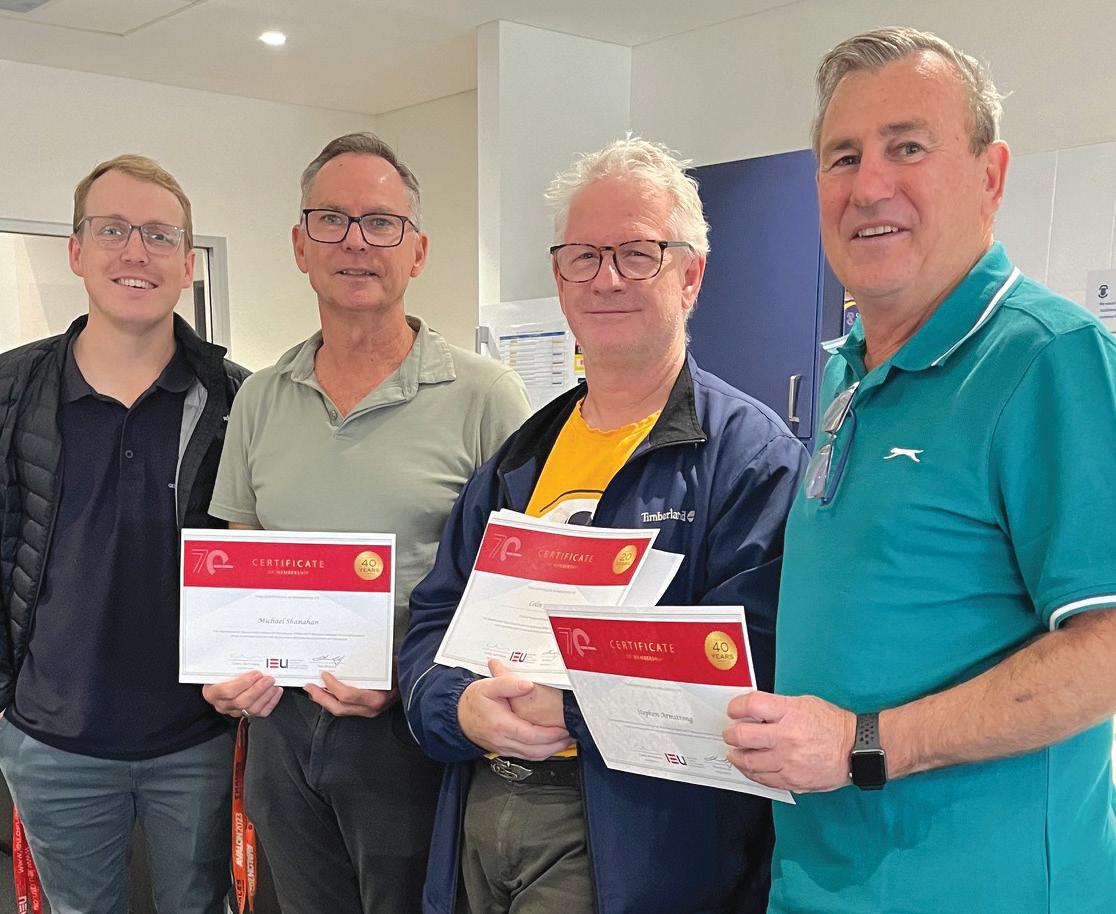
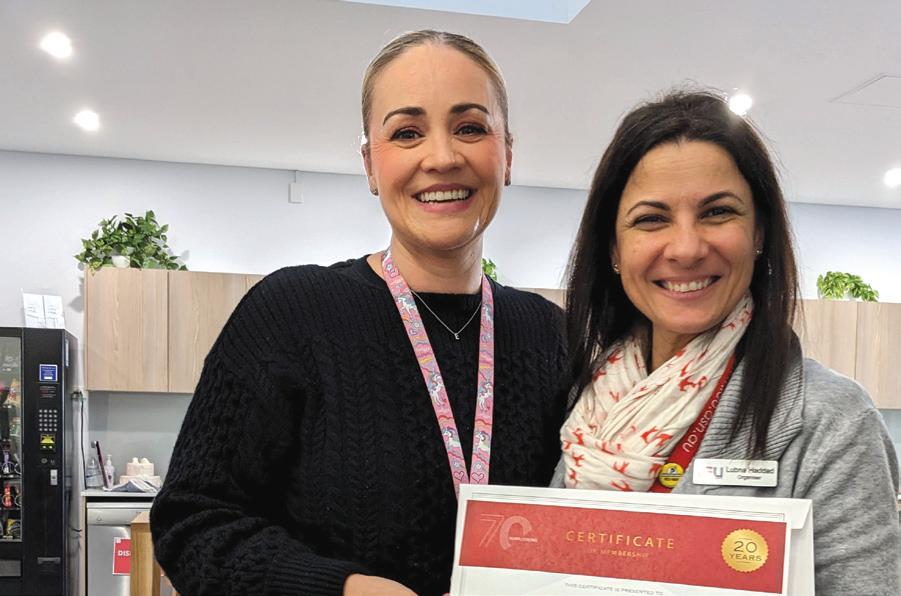
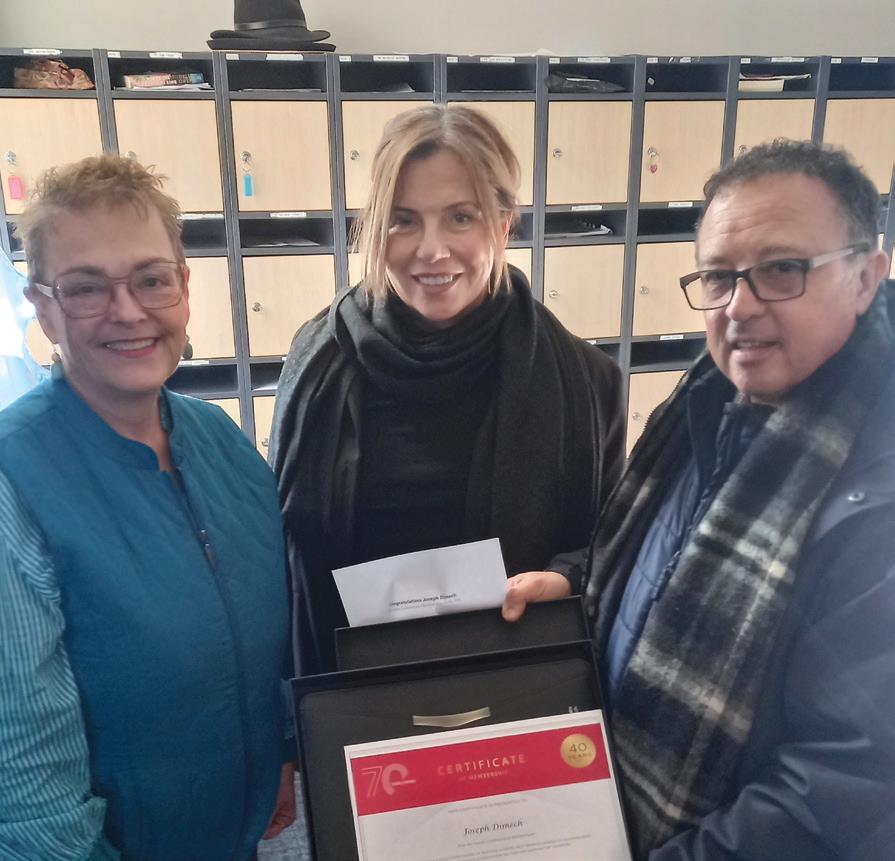

Former
Pam said: “The IEU is its members, and my happiest memories are of engaging with members, and empowering them to improve their work situation through campaigns and bargaining. A major part of my role was also supporting principal members who faced their own set of challenges in dealing with staff, parents, clergy and employers.
“Also of vital importance to me was the opportunity to contribute to advancing the women and equity agenda and to be part of the ongoing campaign for fairer and more inclusive antidiscrimination laws. Unions are at their best when they work with members and the community to enhance workplace equity, social justice and human rights.”
IEU members and officials filed an historic supported bargaining claim at the Fair Work Commission on 5 July on behalf of teachers in 100 community-based preschools in NSW.
The claim includes pay increases of 25% for beginning teachers and more for experienced teachers, to bring early education and care (ECEC) teachers’ pay in line with school teachers and ECEC teachers in other states.
The IEU looks forward to negotiating with the NSW government, which would fund the pay increases arising from an agreement.
In filing the claim, the IEU garnered extensive media coverage, including the main evening TV bulletins – 10News, 9News and 7News. Secretary Carol Matthews was interviewed on 2GB, 2SM, ABC Radio Illawarra and ABC Radio Newcastle.
Cronulla Preschool teacher-director Janene Rox was interviewed on 3CR for Stick Together, Australia’s only national radio show focused on industrial, social and workplace issues. The program can be heard nationwide on the Community Radio Network.
The event was covered in the Canberra Times, Sydney Morning Herald, St George and Sutherland Shire Leader, Ballarat Courier, The Daily Advertiser (Riverina area), The Irrigator (Leeton Shire), Workplace Express, Education HQ and specialist site The Sector, as well as various suburban newspapers throughout Sydney.
The IEU’s log of claims includes improved working conditions, such as paid parental leave and access to professional development. The IEU met with preschool teacher members to progress the claim last week, and the first hearing at the Fair Work Commission will be on 2 September.
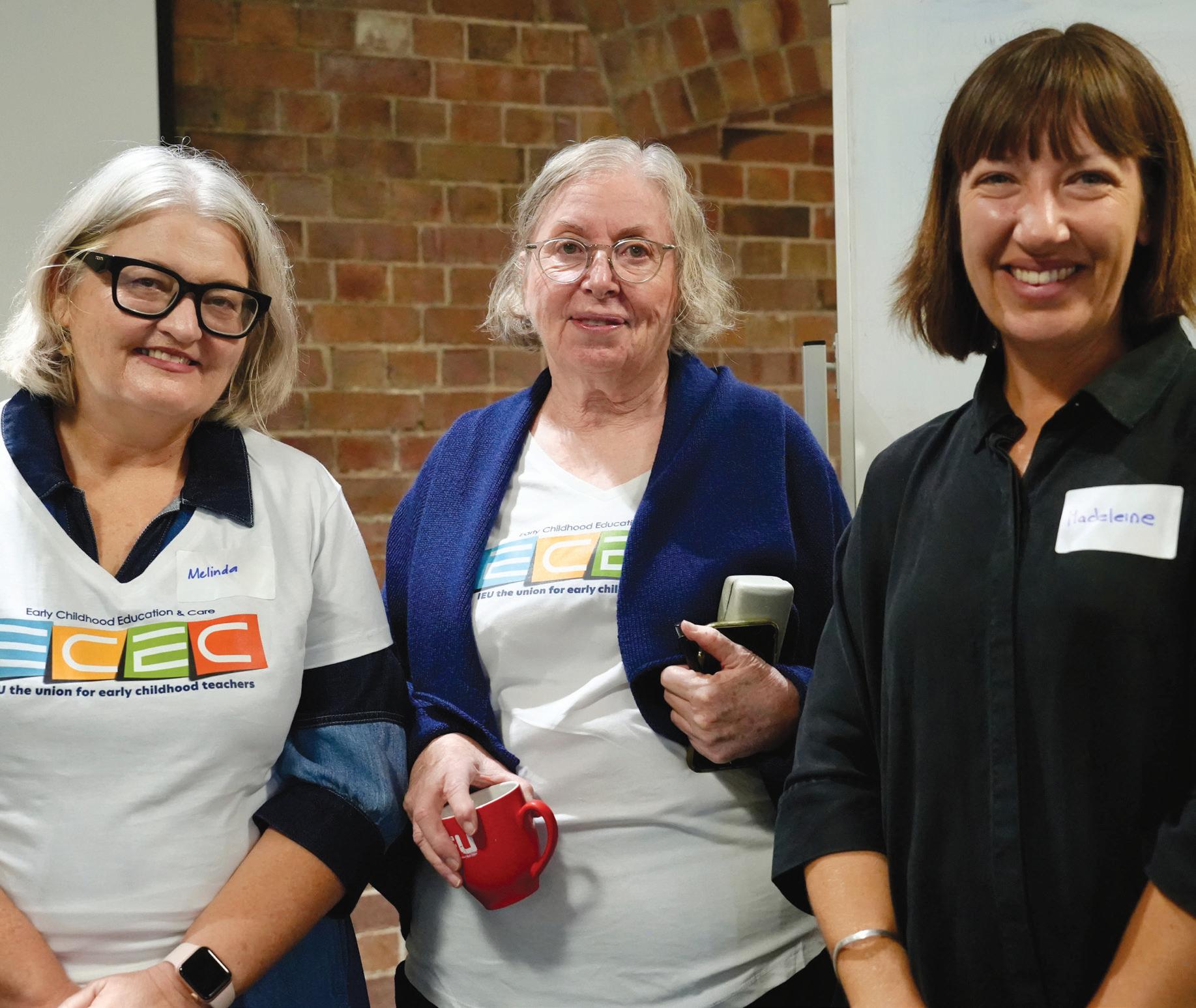
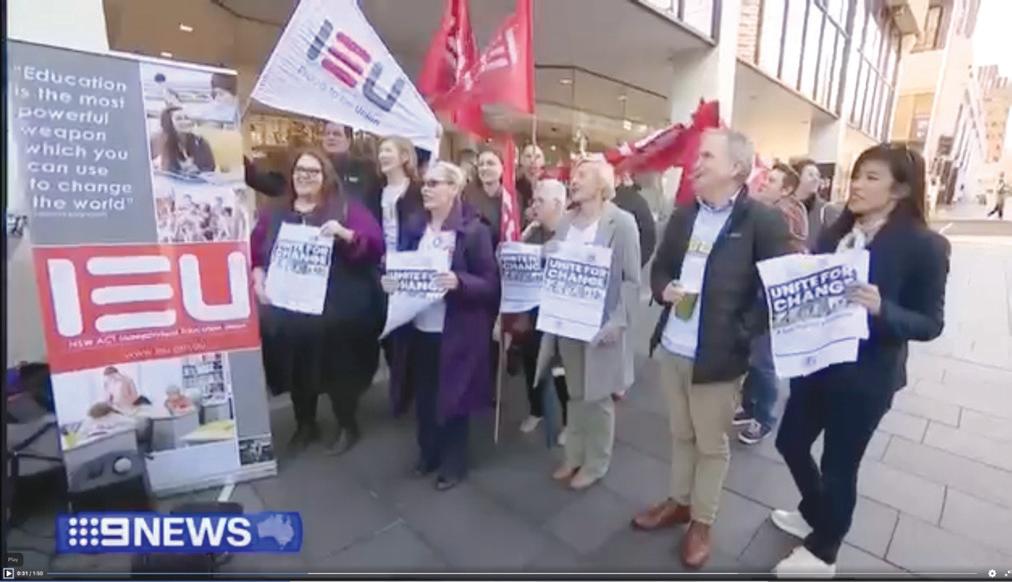



The IEU is farewelling Verena Heron after nearly 40 years improving the lives of teachers in the early childhood education and care (ECEC) sector.
After a few years as a teacher librarian in a Marist Brothers school, she joined the IEU as an organiser in 1986.
“Unionism fulfilled a dream that I could make a difference in people’s lives through my work,” Verena said.
“I got more interested in early childhood education and the impact it could have for children in the future.”
Verena said one of the reasons ECEC teachers’ salaries started falling behind salaries for school teachers was the advent of the modern award in 2010. Modern awards set out the minimum terms and conditions of employment on top of the National Employment Standards.
The common denominator in Verena’s recollections is standing with members in collective actions. She is hopeful for the future, with an upsurge in member action under way in the Unite for Change campaign for pay rises for community preschool teachers in NSW, and the federal government having just funded historic pay rises for long day care staff (p2).
IEUA NSW/ACT Branch Secretary Carol Matthews said, “I’ve worked closely with Verena for almost 40 years, and she’s always been dedicated to improving the pay and conditions of IEU members, with a focus on early childhood teachers.
“Verena is a strategic thinker who is highly regarded by members, employers and academics alike for her knowledge of and insight into early childhood education and care. For me, Verena is a good friend and union comrade.
“She will be missed by her colleagues at the IEU. Verena leaves the IEU as game-changing campaigns unfold for teachers in both long day care and community preschools.
“I know Verena is pleased by recent huge gains for long day care teachers (see p2) after so many years of struggle to achieve the pay and conditions our ECEC members deserve.”
IEU organiser Lisa James said: “Verena negotiated enterprise agreements for many early childhood members over the years, and they enjoyed better wages and conditions as a result.”
Former IEU Deputy Secretary Gloria Taylor, who worked with Verena for many years, said she helped members in small, hard-to-organise centres achieve significant outcomes.
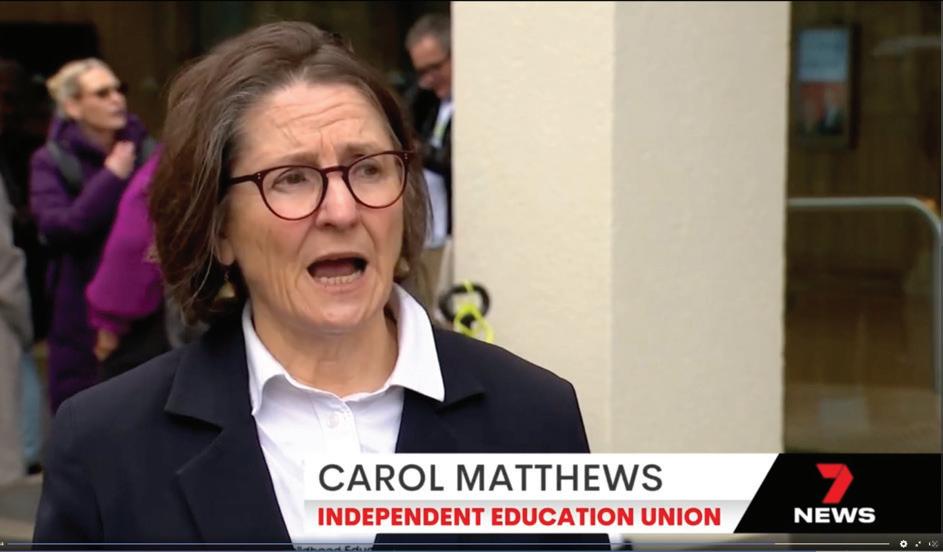


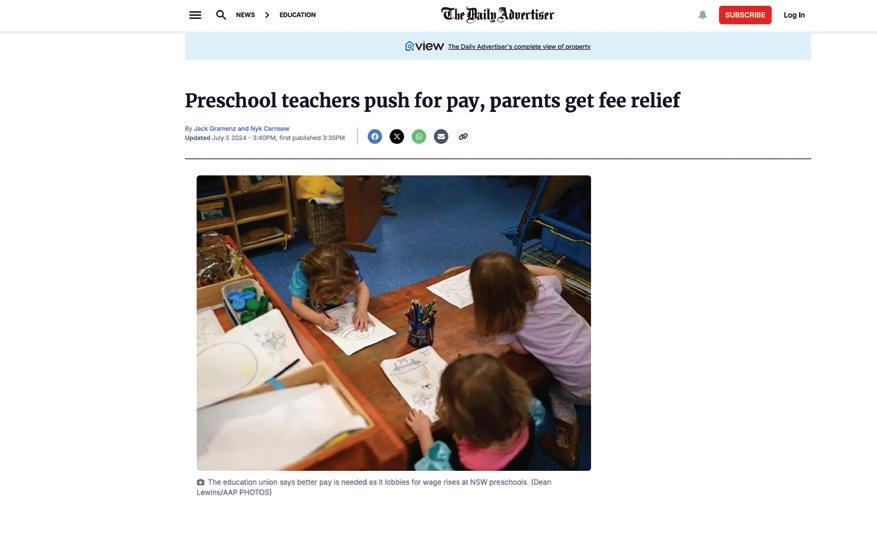
“The modern award didn’t reflect early childhood teachers’ work,” Verena said. “And it became difficult to get wage increases apart from the annual wage review. Conservative governments both federally and in NSW did not believe in funding the sector.
“When the Labor government was in power in the 1980s and 90s in NSW and federally, they were very consultative about the sector wanting to hear the views not only of employers, but also teachers.”
The union sat on several decisionmaking bodies. “We cultivated relationships with major employer groups and major representatives to promote the value of early childhood education, the need for better regulation and the need for appropriate funding,” Verena said.
“She has achieved so much in ensuring that the value of early childhood education and the vital role of teachers are on the agenda for governments and the community.”
“That changed dramatically with the Liberals both at a state and federal level. Under the current state and federal Labor governments we’re seeing positive change in the sector.”
Standouts from Verena’s career include the successful campaign to lower the staff-to-babies ratio to 1:4 in the early 2000s, and the 2012 petition to state parliament demanding better recognition for ECEC teachers, as well as the wages cases in the NSW Industrial Relations Commission and the recent pay equity case in the Fair Work Commission.
Former IEU Vice President Early Childhood Services, Gabrielle Connell, said: “I met Verena over 35 years ago when she did the ‘country run’, travelling around NSW, meeting with teachers, listening to issues and supporting us in any way she could. Her knowledge and passion will be greatly missed.”
Former IEU Assistant Secretary Pam Smith commended Verena’s dedication to supporting the interests of early childhood teachers.
“She has achieved so much in ensuring that the value of early childhood education and the vital role of teachers are on the agenda for governments and the community.
“I thank Verena as a friend and colleague for her inspiring activism and I wish her the very best for the future. Her legacy will endure in so many ways.”
ECEC consultant and long-time IEU collaborator Lisa Bryant said, “From the moment I met Verena, I knew she was passionate, skilled and relentless about improving pay and conditions. After years of tireless dedication, Verena leaves behind an inspiring legacy as a champion of ECEC teachers.
“Her fierce advocacy has elevated the profession. All of us in ECEC have benefited from her wisdom, compassion and relentless pursuit to ensure everyone agrees teachers are teachers, no matter the age of their students.”
Sue Osborne Journalist
From humble beginnings to our powerful present, we look back over some of the many changes to the industrial and education landscape the IEU has seen over seven decades.
On 24 September 1954, a group of male teachers held a meeting at Sydney Grammar School, adopted the draft constitution of the NSW Assistant Masters’ Association (AMA) and elected an interim committee of eight men to “conduct the AMA’s affairs”.
It is difficult to know whether these teachers knew they were reforming an association that was already in existence as early as 1919 but somehow foundered and disappeared in the 1930s.
A repeat of this scenario was quite possible for the reformed AMA as it struggled to find purpose and attract members in its early years. The committee thought the AMA needed a minimum of 150 members to be viable.
By mid-November 1954, membership of the AMA stood at 51. For its first decade, membership was only recorded above the 150 mark (with 157 financial members) in April 1955 and April 1960. It fell to as low as 20 in April 1963.
Voting yes for a union
The prevailing question for the AMA Council (its governing body) at the time was whether the association was to be a professional association and/or an industrial organisation.
In 1956, the AMA Council debated whether the association should apply for registration as a trade union. Six arguments, both for and against, were recorded in the minutes. Ultimately, 90 members voted in favour and 15 against.
In February 1957, the President reported to Council that an application for the registration of the AMA as a trade union had been made to the Industrial Registrar and, on payment of five shillings, the application was accepted. Nevertheless, there was great reluctance among the members to pursue an award.
Women welcomed
Over the years, staffing changes in faith-based schools have had a profound impact on membership growth and hence what the union could achieve.
In 1956, there was an average of only one lay person teaching in a Catholic primary school to 11 religious teachers (mostly nuns). The ratio in Catholic secondary schools that same year of lay teachers to religious teachers (mostly brothers and nuns but with some teaching orders of priests) was one to seven. By 1966, these ratios had fallen to 1 to 2.5 in primary schools and 1 to 2 in secondary schools. It would continue to fall in the years to follow.
The late 1960s were pivotal to the fortunes and direction of the fledgling union. In 1966, the AMA President agreed to draw up cases for and against membership of women teachers in girls’ schools for circulation prior to the March AGM.

Teachers from Catholic systemic schools also started applying to join the AMA. This included John Nicholson, a teacher from De La Salle College, Kingsgrove. Nicholson was to become the union’s first employee, then first General Secretary, and a driving force for pursuing an award (see page 10).
At the 1966 AGM, the amendment to alter the AMA’s rules to admit women teachers from girls’ schools was carried 21 to eight, and a motion to change the union’s name to the Assistant Masters’ and Mistresses’ Association (AMMA) was carried 18 to three.
With lay teachers working in increasing numbers in Catholic schools and with women from both independent and Catholic schools being invited to join AMMA, membership growth not previously known in the union’s history would follow.
By late October 1967, it was reported that male and female membership of AMMA was equal at 197 each; then in December, 61 applications for membership were received, all from women.
In 1968, female membership of AMMA reached double that of the male membership and membership passed 500 in total. Of our 32,000 strong membership today, 77 per cent are women.
Inclusive name reflects expanded coverage
The union began receiving applications from teachers working in what were then referred to as “schools for the handicapped” or “schools of special purpose”, and our membership grew again.
In the late 1960s, the Miscellaneous Workers Union (MWU) sought to expand coverage to include early childhood teachers. AMMA supported requests by teachers in the Kindergarten Union and the newly formed Pre-School Teachers Association to resist this incorporation into the MWU. Early childhood teachers would ultimately join AMMA, then the ITA. The IEU today has more than 1000 early childhood teacher members who are making great gains in the preschool and long day care sectors (see page 2).
The union remained the AMMA until 1972 when it became the NSW Independent Teachers’ Association (ITA). In 1994, it became the more inclusively named Independent Education Union, to reflect our coverage of support staff in non-government schools, and we have more than 4500 non-teaching staff members today.
Marking, meeting the Fed, conservation concerns
In 1967, AMMA published its first journal, Inter Amma. After considerable debate, the AMMA Council determined to seek an industrial award for non-government school teachers.
At the June 1969 Council meeting, the President reported positively on an AMMA Executive meeting with the Teachers Federation. It was resolved that AMMA would support the Teachers Federation claim for School Certificate and Higher School Certificate marking. The first School Certificate exams were held in 1965, and the first Higher School Certificate exams were held two years later.

Given the IEU’s current commitment to environmental issues (see page 5), it is worth noting that a motion put to the June 1969 Council meeting expressing concern about mining leases being granted in the Colong Caves area in the southern Blue Mountains was passed by the narrowest of votes: nine to eight.
A motion put to the May 1973 Council meeting expressing “strong opposition to atmospheric nuclear testing” in the Pacific was lost.
Winning the first award
Our union’s first award was finally won in 1970. It initially had different pay rates for “mistresses” and “masters”, but equal pay rates for female and male teachers were eventually achieved via the award by 1974.
While the award had hardly any of the conditions school staff today may take for granted, it did have a preferential employment clause favouring union members: “Preference in employment shall be given to suitable applicants with equivalent qualifications who are members of the Assistant Masters’ and Mistresses’ Association of NSW.” The past does indeed seem like a foreign country.
Since winning that first award, the union has made many significant gains and faced big legislative changes and challenges. While much has improved, much still needs to be done.
From employing our first full-time General Secretary in 1971 and our first full-time organiser in 1977, growth in membership has enabled the union to invest in campaigns, training and staff.
In 2024, the IEU employs almost 80 staff dedicated to enhancing our collective capacity to achieve positive outcomes for members. IEU staff include organisers, industrial officers, a membership department, a media and communications team, a finance team, a professional engagement team and administrative and professional staff. They can be found in five offices (Ultimo, Parramatta, Canberra, Newcastle and Lismore) that are owned outright by the IEU; that is, they are member assets.
Time has proven again and again that member-driven campaigns in our workplaces are the key to progress.
At this moment, it is worth reflecting on the hard work, dedication and sacrifices of the many great women and men who have joined in our campaigns and collectively achieved so much.
Our 70 continuous years of history show that our union can be both a progressive industrial union and a respected professional association. We thank and congratulate every single member – for making our union what it is today, and for your commitment to creating the next chapters in our history. Onwards and upwards.
David Towson Deputy Secretary
Two huge rallies, 26 years apart. School staff are dedicated, professional, patient and resilient. But when enough is enough, they rise up – together. On 23 April 1996, teachers and support staff from the IEU joined forces with colleagues in the NSW Teachers Federation for a 12,000-strong march on NSW Parliament House, calling for pay rises of 12% (left, SMH). Critical mass came again on 30 June 2022 as thousands of members from the two unions again teamed up across NSW and the ACT to take the state government to task (below). While the mood was electric the message was serious, with Catholic systemic teachers ultimately gaining pay rises of 8-12% and 6.5-20% for support staff.
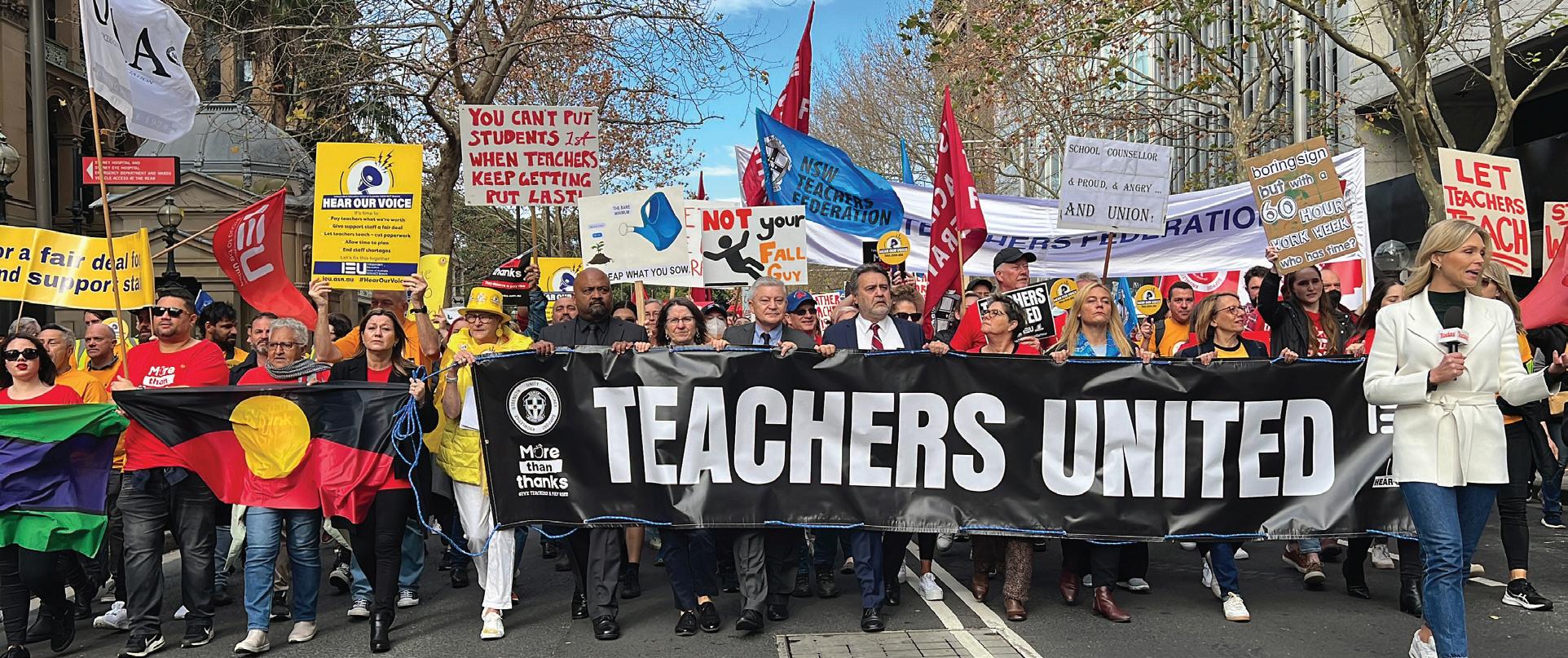
Since our foundation in 1954 as the Assistant Masters’ Association (AMA), the Independent Education Union of Australia NSW/ACT Branch has undergone enormous growth and change in its proud, 70-year history of representing the rights of teachers and support staff in non-government education.
Over the years, we’ve achieved pay equality for female and male teachers, and ensured teachers working in non-government schools are not paid less than their colleagues in government schools.
We have faced major legislative changes and run various campaigns informed by members and with members at the forefront.
From our early days as the AMA, then AMMA (Assistant Masters’ and Mistresses’ Association), the Independent Teachers Association and now the IEU, our membership has grown to more than 32,000 teachers and support, professional, administrative and operational staff.
Here are a few milestones:
1954 Founded as the AMA. In 1955, the AMA had 90 members. The founders advised that it needed a membership of 150 to survive.
1957 Registered as a trade union.
1954–1965 The AMA struggled for relevance, purpose and numbers; membership fluctuated from 157 to as low as 20 in April 1963.
Late 1960s Disagreement over the union’s direction: “traditionalists” wanted a greater focus on being a professional association over being an industrial body utilising industrial power to seek arbitrated outcomes beneficial to members.
1966 Name changed to Assistant Masters’ and Mistresses’ Association (AMMA) as women and lay teachers in Catholic schools join in significant numbers.
1967 Decision made at the AGM to seek an industrial award for non-government school teachers.
1970 First award made: Assistant Masters’ and Mistresses’ in Non-Government Schools (State) Award.
1971 The union’s full-time General Secretary, John Nicholson, leased offices in Chatswood. Membership hit 1000.
1972 Name changed to Independent Teachers’ Association (ITA); membership at 1084.
1977 First full-time organiser, Michael Raper, appointed; membership at 3954. He would become the union’s General Secretary in 1981.
1980 New Council and Annual Conference structure adopted with new constitution. Membership at 5603.
1981 The first edition of Newsmonth is published; the Daily Telegraph runs a story describing the ITA as “the fastest growing union in Australia”.
1984 Australian People for Health, Education and Development Abroad (APHEDA), known as Union Aid Abroad, is established. The IEU joins as a partner.
1985 Significant split in Executive and Council over union direction, Left v Right. Left wins most Executive positions.
1988 Independent Teachers Federation of Australia (ITFA) is registered as a federal union on 8 October. The ITFA was set up towards the end of 1983. In early 1984, an application was made to the Australian Conciliation and Arbitration Commission for registration as a federal union. The application sought rules for coverage of the broadest range of education staff in non-government education institutions. After extensive litigation, federal registration was achieved on 8 October 1988.
As the IEU celebrates its 70th anniversary, some of our elected officials past and present cast their minds back to share key changes and memorable moments during their time in office. A few themes remain the same over many years: strong member engagement is what wins the day in any campaign; sidelining staff and their union is ultimately to the employer’s detriment, as members always push back and the union grows stronger; and the more members we have, the more gains we make.

superannuation (Catholic school employers and the Association of Independent schools began contributing 3% in 1988).
All this was achieved through the legitimacy and strength provided by our ever-growing membership – we were over 15,000 strong by 1989.
In 1981, we implemented a fiercely democratic union decision-making structure, still in place today, based on workplace chapters through which all members can participate. We’ve continued to build our membership through communications such as Newsmonth and NewsExtras.


John Nicholson
President, 1969
General Secretary, 1970–1977
In February 1966, when I was 25, I joined the Assistant Masters’ Association (AMA). I’d been teaching at De La Salle Kingsgrove since 1959. My formal qualification was a modest pass in the 1957 Leaving Certificate. Not to mention my added qualifications: I was alive, Catholic, and had a burning desire to teach. But by 1966, I had seven years’ experience, an ACP diploma, a Teachers’ Guild Diploma, and I was happy with my job and my pay.
My colleague, Bob, a Teachers’ College graduate, joined the staff in 1964. In 1965, the Archdiocese struck, appropriating administration of salaries and evaluation of teacher qualifications for all parish schools. Bob’s salary in 1964 was greater than mine; but his 1965 pay was significantly less than mine. To make matters worse for him, my salary increased.
Bob was not alone. Many teachers were much worse off than in previous years. Pay-setting was opaque. Qualifications were not always recognised and no negotiation was available. I was outraged.
A colleague said to me: “Form a union. Get an award.”
“Me?” I asked.
“Yes, you,” he said. “To calm your anger, do something about it.”
After spending most of 1965 trying to do just that, I joined the AMA. I discovered there were already 51 members, but they weren’t keen to use industrial tactics to gain salaries that reflected our responsibilities and workloads. By April I was a member of Council [the union’s decisionmaking body] and recruiting members in Catholic systemic schools.
Meanwhile, women teachers in independent girls’ schools sought to join the AMA, necessitating a constitutional change in 1966 and a name change to become the Assistant Masters’ and Mistresses’ Association (AMMA). They were also keen for upgraded pay rates.
But Council and long-term members were reluctant to seek an award, rejecting motions in April and November of 1966.
An historic day came on 31 March 1967. At the AGM, teachers from Catholic systemic schools and independent girls’ schools were a majority of the 48 members present. This was no accident. The minutes show:
Moved by J Nicholson [DLS Kingsgrove], Seconded by M. Smith [Abbotsleigh] that the meeting instruct Council to take steps necessary to secure an award for teachers in Independent Schools and the Council be asked to pay close attention to the prevailing salary scale in Departmental Schools. Carried
This was the key to our call for salary justice. It was also the beginning of the IEU’s history of ensuring salary and social justice for thousands upon thousands of teachers, and later other employees within non-government schools. And it was the beginning of ensuring only qualified teachers could be employed in the independent schools sector. All of these achievements made a real difference – to members, school staff and students.
Building strength at the school level was, and remains, critical to the union’s success. Thanks for these great times!
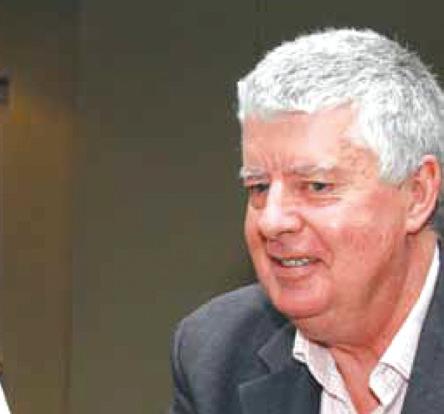

Dick Shearman
General Secretary, 1989–2012
Federal President, 1993–2014
During the period I was an IEU official and General Secretary, significant changes centred on building a stronger union presence within individual workplaces.
The campaign to win parity of long service leave conditions with government school teachers in the mid-1980s, while Michael Raper was General Secretary (below left), was the first to use school-based newsletters to members, with resolutions to be voted on in each school.
Both the Catholic and independent school employers thought this was provocative, preferring us to meet with their lawyers so we could endlessly discuss the Long Service Leave Act (NSW). And they were right.
This school-based campaign was successful because it pushed the boundaries. By 1989, members in schools had gained the confidence to participate in a half-day strike, the first Catholic and independent schools teacher general strike action by this union, over employers attempting to extract trade-offs on working conditions for a pay rise.
The strike so concerned Catholic employers that they engaged a former NSW Labor Council Secretary to give them a report on what went wrong. His report essentially said nothing had gone wrong! The union was just acting like a union in vigorously defending its members’ interests. It was this activist approach that fundamentally changed relationships with the employers. The Catholic employers and the Association of Independent Schools agreed to separate negotiations rather than tuck in behind low-fee school salaries and pay more by grace and favour.
We also saw some employers develop more progressive industrial policies and become more willing to work with a union focused on its members
The union won the battle against trade-offs on conditions in 1989 because members were actively engaged with their union’s campaign. Similarly, it was school-based actions that helped insulate the non-government schools sector from then PM John Howard’s regressive WorkChoices policy and other attempts to move to non-union agreements or individual contracts.
We were successful because employers had to deal with their own workers in their workplace rather than abdicating responsibility to a central employer with the pretence that anything that negatively impacted staff didn’t come from the school. This school-based approach has served IEU members well over the decades.
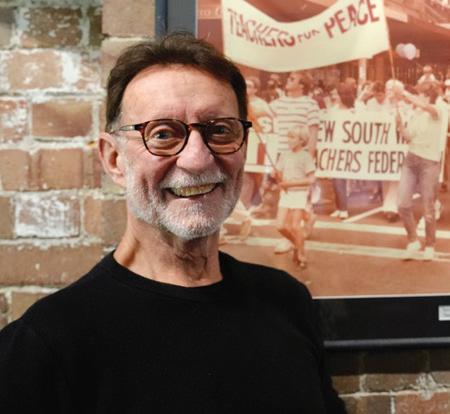

Michael Raper
General Secretary, 1981–1989
What an exciting, energised and productive period it was. In 1977, having signed up 90 new members to the Independent Teachers’ Association (a 10 per cent increase in the union’s membership at that time), the first General Secretary, John Nicholson (above) offered me the position of first ITA organiser, bought a Toyota Corolla and sent me out on the road. Four years and more than 100,000 kilometres later, ITA membership had grown from 900 to 5700 when I became General Secretary in February 1981.
The ITA remained the fastest growing union in Australia well into the 1980s because teachers throughout the non-government sector were determined to gain security of tenure; professional recognition and career development through a promotions structure; and fair reward through industrial strength to achieve better salaries and conditions.
Key battles and successes for members included: significantly improved job security through hundreds of reinstatement cases – challenging discrimination, privacy breaches, “no reason” dismissals and “non-renewal of contract” charades promotion structures in primary and secondary schools
salary parity with government school teachers, plus working conditions in the award improved and portable long service leave rights after a long, schoolbased campaign and threatening industrial action
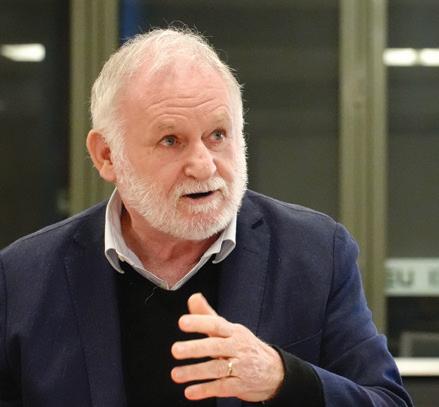

Patrick Lee
Federal Secretary, 1982–1988
Federal President, 1989–1993
Deputy Secretary, 1989–2003
The period from 1989 to 2003 saw some remarkable coming-of-age moments in the history of the IEU.
The 1989 general strike of Catholic and independent school teachers was a watershed, staring down a consistent practice of school employers trying to sideline the union and demand teachers’ loyalties be exclusively focused on their employers’ interests.
In 1990-91, the union ran a ground-breaking work value/special case in the NSW Industrial Relations Commission (NSWIRC). It established a new national benchmark top rate for all teachers, irrespective of sector, and merged the three-year and four-year scales, allowing the predominantly primary school teaching force access to the top of the single scale.
These outcomes and others then flowed on to teachers in NSW government schools – a first for the IEU.
Along the way to the next major case run by the IEU, the union secured substantial long service leave improvements (two weeks per annum after 10 years for teachers), the first paid maternity leave provisions, and a hardwon case in the NSWIRC to gain coverage of school support staff.
In 2003-04, the union again ran a major work value/special case in the NSWIRC that achieved substantial salary increases for all teachers and, on top of that, further increases for Catholic systemic principals, assistant principals and other promotions positions that a month later flowed on to NSW government school teachers.
These achievements were won on the back of strong member support and involvement with the leadership of the union and its specialist staff. It was a period of exciting and substantial achievements, often following entrenched opposition from school employers and religious institutions.

Continued from opposite page
1989 Dick Shearman becomes General Secretary. Membership at 14,104.
1989 Federal awards obtained in English colleges and the post-secondary college sector.
1993-1994 Union gains coverage of school assistants then clerical staff at both state and federal levels.
1994 Name changed to NSW Independent Education Union. Membership at 16,265.


John Quessy Secretary, 2012–2019
Federal President, 2014–2020
The IEU was deeply saddened by former IEUA NSW/ACT Branch Secretary John Quessy’s passing on 10 December 2023.
During his tenure as Secretary, John led highly successful campaigns for pay rises and improved working conditions in the Catholic systemic sector in 2013-14 and 2017-18, with the latter taking out the ACTU’s Campaign of the Year Award 2018.
John spearheaded the 2012 “Teachers are Teachers” campaign for pay parity for university-trained early childhood teachers with primary school teachers. This was finally resolved with considerable success in 2022. John had a keen interest in professional issues affecting the everyday lives of teachers and supported the expansion of the union’s professional development program for members.
At the conclusion of his term in office in October 2019, John said: “My years working with members have been fantastic and the last seven as Secretary especially rewarding. It has been an absolute pleasure to work on your behalf and to have met so many members face-to-face and online over the years. We have a union in which we can all be proud.”
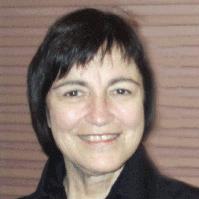

Gloria Taylor Deputy Secretary, 2004–2019
Early in my time as an organiser with the then ITA, a dispute erupted in Catholic systemic schools in 1991 in the Diocese of Wagga Wagga.
The Bishop of Wagga Wagga had commissioned a draft religious education curriculum that many teachers and parents saw as regressive, narrow and negative. Teachers were denied a voice in consultations and they reported feeling intimidated, with their job security at risk.
The union leadership and organisers took up a strong presence and engagement in resolving the consultation issue, pushing back threats to other industrial rights along the way. Media coverage was extensive.
In 1993, the interventionist Bishop sought to alter leadership and structural issues in Catholic independent schools run by religious orders. The school community again fought back, with union support, and prevailed. The “Battle of Wagga” was won and union membership surged across the Riverina region.
The strength of union membership was evident, and just a few years later, in 1996, an unprecedented number of teachers in Wagga took strike action supporting a statewide wage claim, improved conditions and a joint action with the NSW Teachers Federation. Similar action occurred across the state. A new campaign would again deliver for members.
Since those days, the IEU has tripled its membership to more than 32,000, enabling many advancements for members.
Strategic campaigning and strong industrial capacity at the IEU continue to be a winning combination in work across our membership.
The IEU works to improve status, pay and conditions for our very deserving teachers and education staff. I cherish having played a part in this dynamic organisation.
The campaign was a huge testimony to collective action, with teachers in NSW achieving pay rises of 8% to 12% (11% to 19% in the ACT over three years), and support staff gaining increases of 6.5% to 20%.
I’ve been privileged to represent the IEU at Education International Congresses (the global federation of 383 education unions from 173 countries) in Brazil, Berlin, Bangkok, Cape Town and Ottowa, and women’s conferences in Bangkok and Morocco. I’ve also represented the IEU at the Council of Pacific Education in Fiji, which provides advice and assistance on professional, industrial, legal and human rights issues for teachers, support staff and their union affiliates in the Pacific region.
Independence Day celebrations in Timor Leste on 20 May 2002 were especially memorable. The then Deputy Secretary, Patrick Lee (see opposite page), with the assistance of IEU members, worked tirelessly with Sister Josephine Mitchell to fund and donate textbooks to the Mary MacKillop Institute of East Timorese Studies (established in 1994 to develop literacy and teacher education). This very worthwhile project contributed enormously to educating many students in Timor Leste.
International Women’s Day was always a highlight, providing a way to celebrate the achievements of women. Conferences for staff in early childhood education and care and school support staff were also a high priority and a good way to connect with members in these sectors.
My association with both Teachers Health and NGS Super over the years has also been a rewarding way to serve IEU members’ interests.
1996 Joint strike of the IEU and NSW Teachers Federation (see page 9). “Hands were shaken, fraternal greetings exchanged and, shoulder to shoulder, some 12,000 members of the NSW Teachers Federation and the NSW Independent Education Union (IEU) marched on Parliament House in support of their 12 percent pay claim.” (SMH)
2006 The regressive WorkChoices policy took effect in March 2006, increasing activity in the federal jurisdiction, particularly in independent schools, as members unite to resist attacks on workers’ rights and conditions.
2009 NSW government referred industrial relations powers in relation to private sector employers to the federal jurisdiction.


Mark Northam Secretary, 2019–2023
In 2022, IEU members said “Enough is enough!” and took to the streets. Morale was low due to the artificial salary cap the NSW Liberal-National government had imposed on public sector staff for more than a decade. This wage suppression (maximum pay rise of 2.5% a year) included NSW government school teachers.
The link between NSW government teachers’ salaries and Catholic systemic teachers had never been so clear. Catholic employers would not budge from their long-held view of pay parity with government school teachers.
IEU members were deeply impacted by staff shortages driven by tight curriculum reform processes and shrinking numbers joining the teaching profession. Much effort was expended simply keeping schools operational at the expense of teachers and support staff.
Then came COVID. Members kept education afloat through their extraordinary goodwill. The teaching profession was under considerable pressure and replacing absent colleagues became a daily grind. Both the IEU and the NSW Teachers Federation were grappling with acute staff shortages, insufficient salaries and intensifying workloads.
Teachers and support staff were beyond despair that the government and employers were ignoring obvious problems. It was the job of their unions to drive meaningful change at a political level.
All this gave rise to the Hear Our Voice campaign. At its height, members in 581 Catholic systemic schools voted to take protected industrial action. They knew change was possible but only if they took their struggle to the streets. On 27 May 2022, thousands of IEU members rallied across NSW and the ACT to demand better pay and conditions.
2011 National benchmark set: Association of Independent Schools Multi-Enterprise Agreement, negotiated by the IEU, is the first industrial agreement in Australia to pay classroom teachers more than $100,000 per annum (with effect from 2014).
2012 John Quessy becomes General Secretary.
2014 Membership exceeds 32,000.
2014-2017 Major campaigns in Catholic systemic schools in 2014 over a proposal by employers to completely rewrite the enterprise agreement and strip entitlements won over decades. Union campaign triumphs.
2019 Mark Northam becomes Secretary in October.
2020 The union gains a surge in membership in the early months of the COVID-19 pandemic. The state-registered union (NSW/ACT IEU) is wound up, and the IEU operates only as a federal entity as a branch of the Independent Education Union of Australia.
2021 On 19 April the Fair Work Commission handed down an historic decision supporting pay rises of up to 10% for early childhood teachers – the result of an extensive eight-year campaign by the IEU.
2022 IEU launches Hear Our Voice campaign for Catholic systemic teachers and support staff. Wide-ranging successful industrial action takes place throughout NSW and the ACT on 27 May, followed by widely publicised statewide combined strike action with the NSW Teachers Federation on 30 June (see page 9).
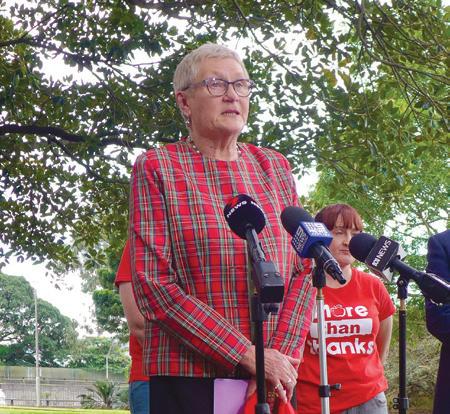

Christine Wilkinson President, 2001–2022
As I look back on my 21 years as President of the NSW/ACT Branch of the IEU, fond memories come flooding back, along with a realisation of just how things have changed in that time.
My agenda as President was always to put the members I represented at the forefront of every decision, every discussion and every campaign, and to get to know the members personally by attending as many sub branch meetings, events and Council meetings as possible.
When I became a Council delegate, Council meetings were held across Saturday and Sunday, the room was always full and discussions were lively.
The Hear Our Voice campaign of 2022-23 was a huge success, with thousands of members dressed in yellow joining rallies across the state to call for improved wages, reduced workloads and better conditions in Catholic systemic schools.
I was fortunate to address huge rallies of members, first at Sydney Town Hall on 27 May 2022, then outside NSW Parliament House on 30 June 2022. For the second rally, the IEU united with the NSW Teachers Federation for a huge march on Macquarie Street, preceded by interviews and a press conference at the ‘Tree of Knowledge’ behind NSW Parliament House.
These strikes and rallies were amazing to be part of and a way to support our members who were determined to have their voices heard.
From large gatherings in Sydney, Newcastle and Wollongong to Albury, Ballina, Tamworth, Wagga, Bathurst, Dubbo and everywhere in between, the message was serious but the mood was electric as members sang, chanted and played musical instruments.
An historic meeting of the IEU and the NSW Teachers Federation soon followed at which we agreed to take joint action. On 30 June 2022, IEU members assembled outside St Mary’s Cathedral before joining with their government school colleagues to flood Macquarie Street under the banner ‘Teachers United’, chanting ‘Hear our voice!’ and ‘More than thanks!’
The NSW Liberal-National government was bundled out in March 2023 and the incoming Minns Labor government finally agreed to a respectful pay deal that flowed on to strong gains in the Catholic systemic sector.
The numbers say it all: Catholic systemic teachers in NSW gained pay rises of 8% to 12% (11% to 19% over three years in the ACT between 2023 and 2025) and support staff achieved 6.5% to 20%.
Not only had our members attained these great outcomes, together with other unions, we had also smashed that salary cap.
2023 Huge salary wins for teachers (8%-12% in NSW; 11% to 19% in the ACT over three years) and support staff with wage parity with counterparts in government schools (6.5% to 20%) along with big improvements to conditions.
2023 Carol Matthews becomes first woman Secretary of the IEU on 28 October.
2024 The IEU celebrates 70 years! But there is no resting on our laurels. This year, long day care teachers have achieved historic 15% pay rises and we’ve filed a revolutionary pay claim for community preschool teachers; bargaining is under way for independent schools; and we’re developing a claim for teachers and support staff in Catholic systemic schools.

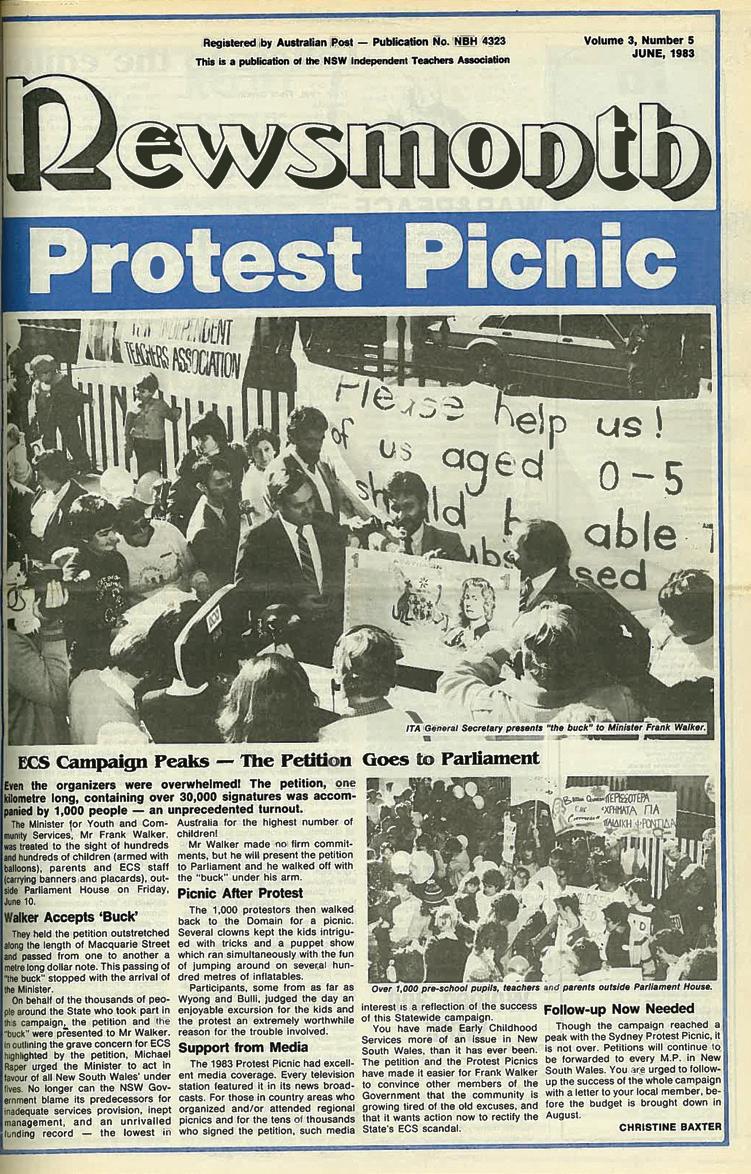
“It was the beginning of the IEU’s history of ensuring salary and social justice for thousands upon thousands of teachers, and later other employees within nongovernment schools.”
John Nicholson President, 1969 General Secretary, 1970–1977
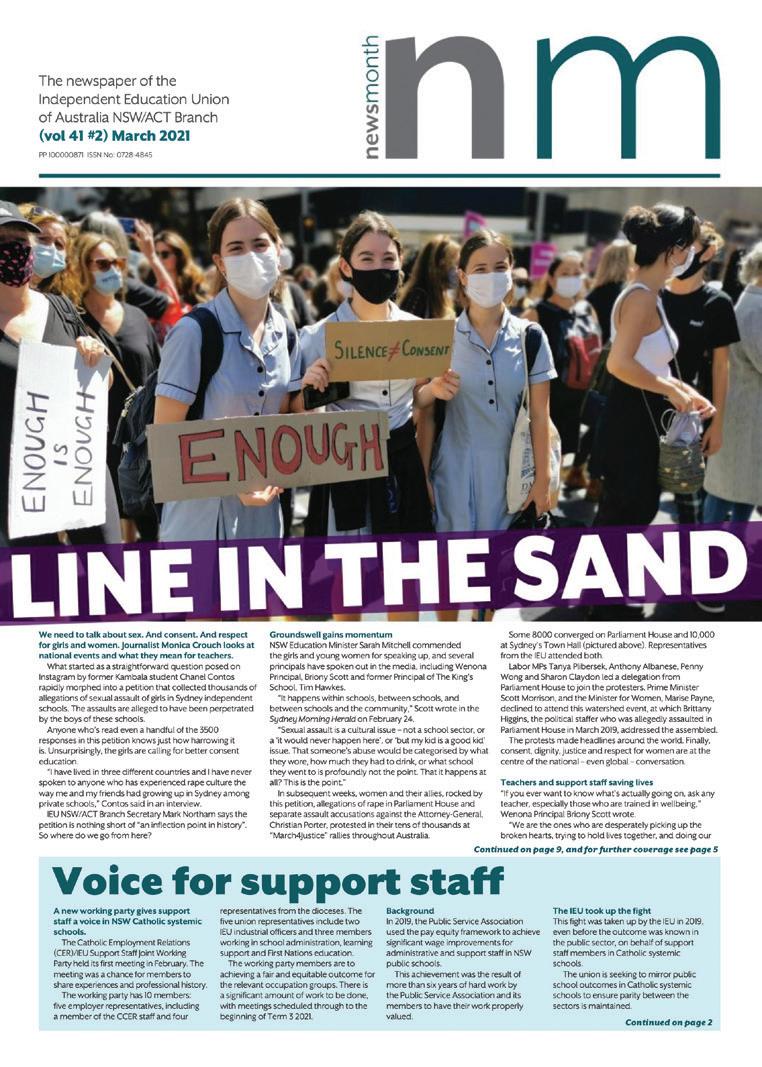
“Teachers throughout the non-government sector were determined to gain security of tenure; professional recognition and career development through a promotions structure; and fair reward through industrial strength.”
Michael Raper General Secretary, 1981–1989
The IEU began publishing Newsmonth in 1981. For our 70th anniversary, we rummaged through our archives to uncover just some of our actions and achievements over the past 43 years.

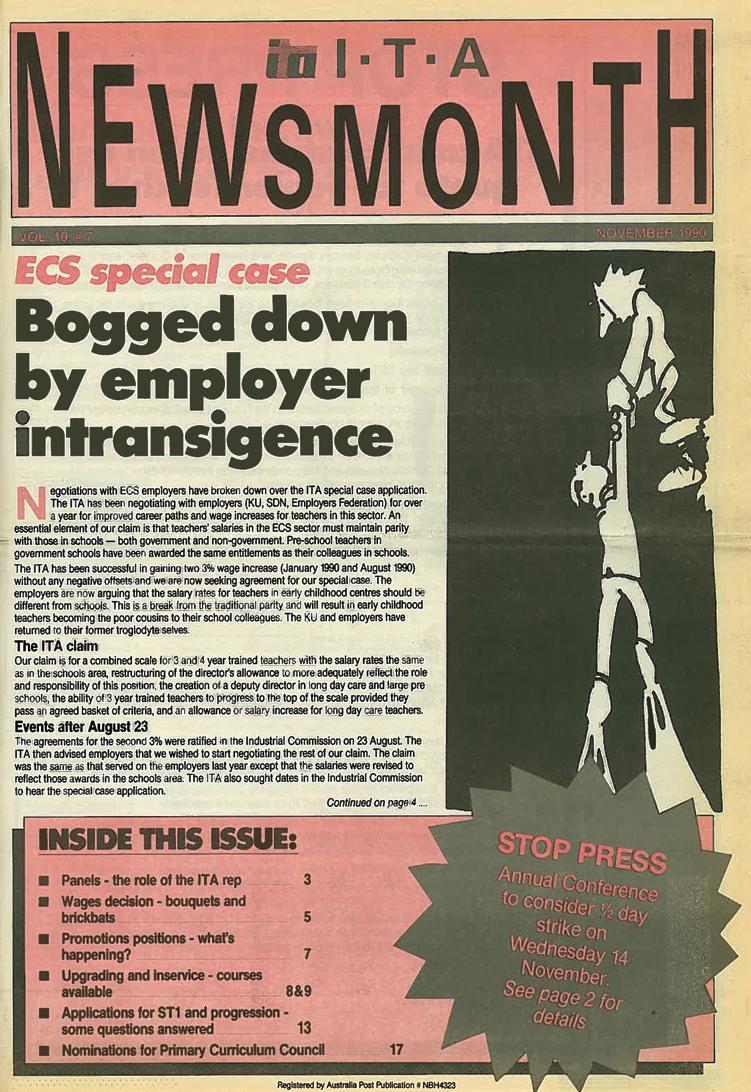
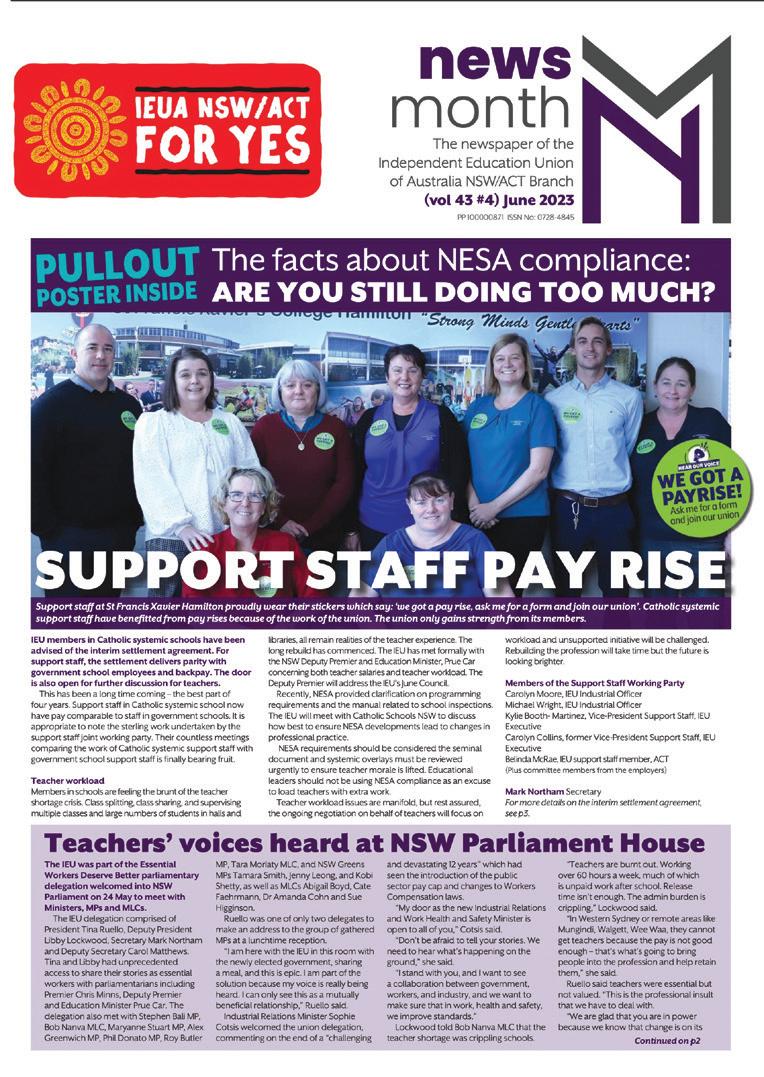
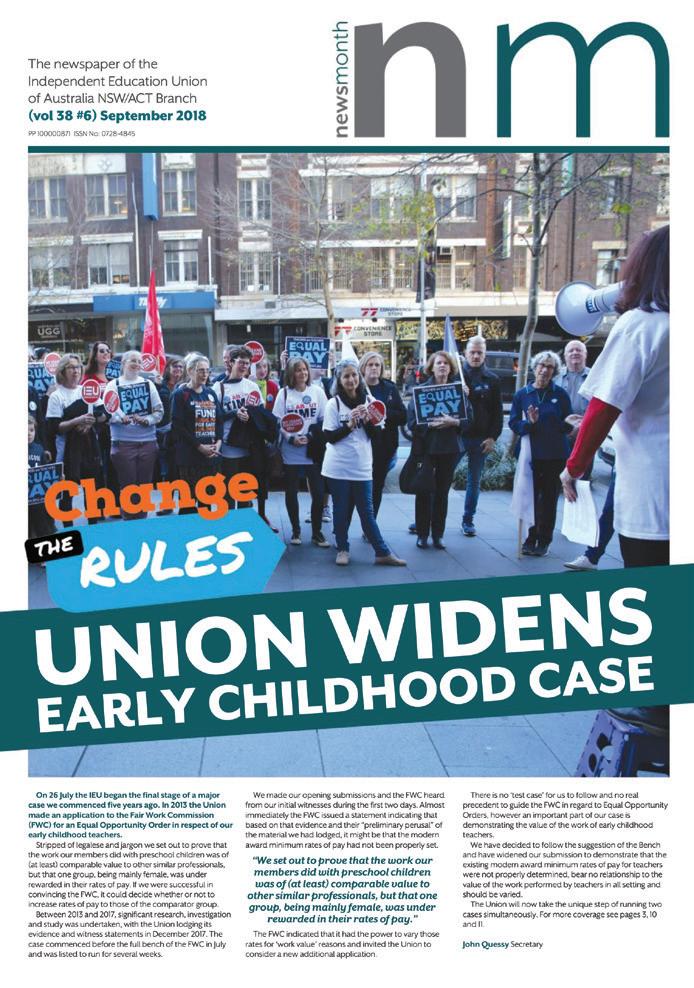
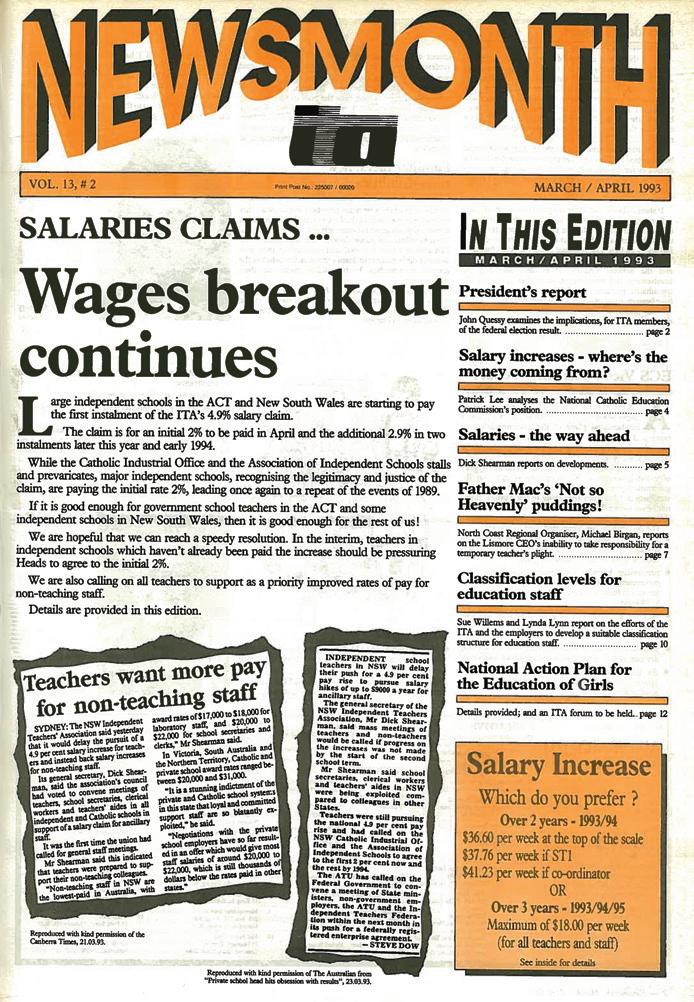
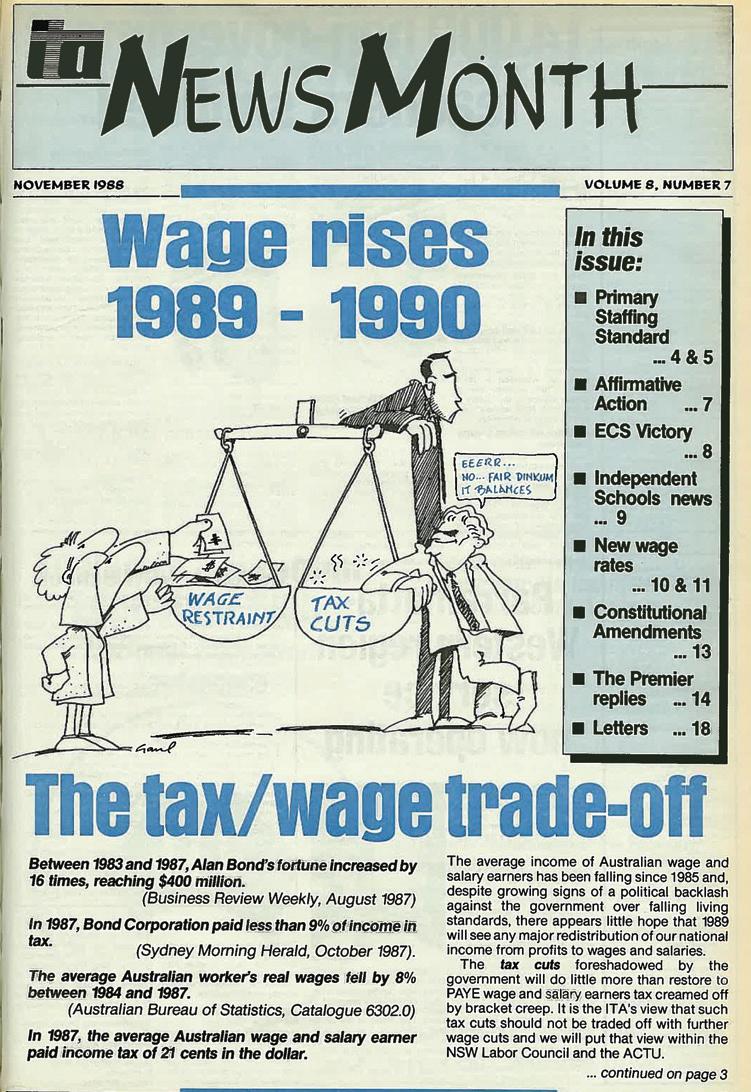
“My agenda as President was always to put the members I represented at the forefront of every decision, every discussion and every campaign, and to get to know the members personally.”
Christine Wilkinson President, 2001–2022

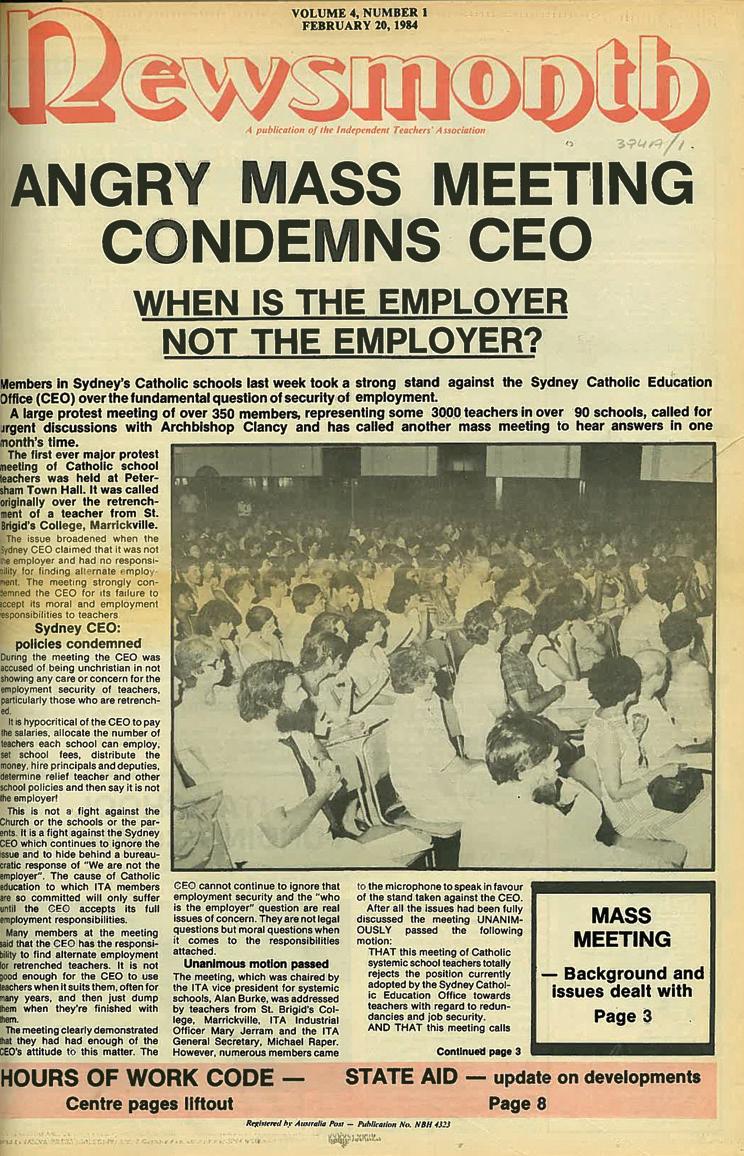
“It was school-based actions that helped insulate the nongovernment schools sector from then Prime Minister John Howard’s regressive WorkChoices policy and other attempts to move towards nonunion agreements or individual contracts.”
Dick Shearman
1989–2012
New syllabus rollout NESA has released a range of new syllabuses in the past weeks, following the revamped schedule the NSW government published upon taking office in 2023.
The IEU welcomes the 2027 implementation date, which will allow teachers appropriate lead time for planning and resource development.
On balance, the new syllabuses appear to address our core concerns around the need to reduce workloads; however, as is often the case, the proof will be in the implementation.
The consent element of the new primary syllabus content focuses on respectful relationships – sharing toys, joining games etc –and the age-appropriate content should hold no concerns for members (or employers) in religious schools. For more, see page 4.
Are you interested in working on a NESA syllabus?
The IEU is regularly asked to recommend academic experts and teachers for the various
syllabus writing and technical advisory groups NESA establishes for the purposes of syllabus development.
As representatives of the union, these members advocate for the interests of teachers, ensuring any changes to the syllabus consider teacher and support staff workloads. If you are interested in joining one of these working groups, please keep an eye on our website and social media.
Reps’ training
In recent weeks, the IEU has conducted several well-attended reps training sessions in Newcastle, Camden, Nepean, Orange, and Wagga Wagga.
Further reps training sessions will take place at Gosford on 20 September, with another one or two sessions to be scheduled at our Wattle St office in Ultimo in Term 4. Keep an eye out for emails and check our website for dates and details: ieu.asn.au/events
Pat Devery Professional Engagement Coordinator
The following NESA and TQI accredited courses will be offered by the union during semester 2. Go to our website to register for these highly regarded courses, presented by Dave Vinegrad: ieu.asn.au/events
Tuesday 27 August Managing difficult conversations in K-6 schools, how to discuss what matters 6pm-8pm
Monday, 9 September Behaviour management – getting it right 6pm-8pm
Monday 16 September Behaviour management – keeping it right 6pm-8pm
Monday 21 October Behaviour management – making it right 6pm-8pm
Monday 11 November Behaviour management – upholding the right 6pm-8pm
Monday 25 November Thriving and surviving for casual teachers* 6pm-8pm (*TQI accredited only)
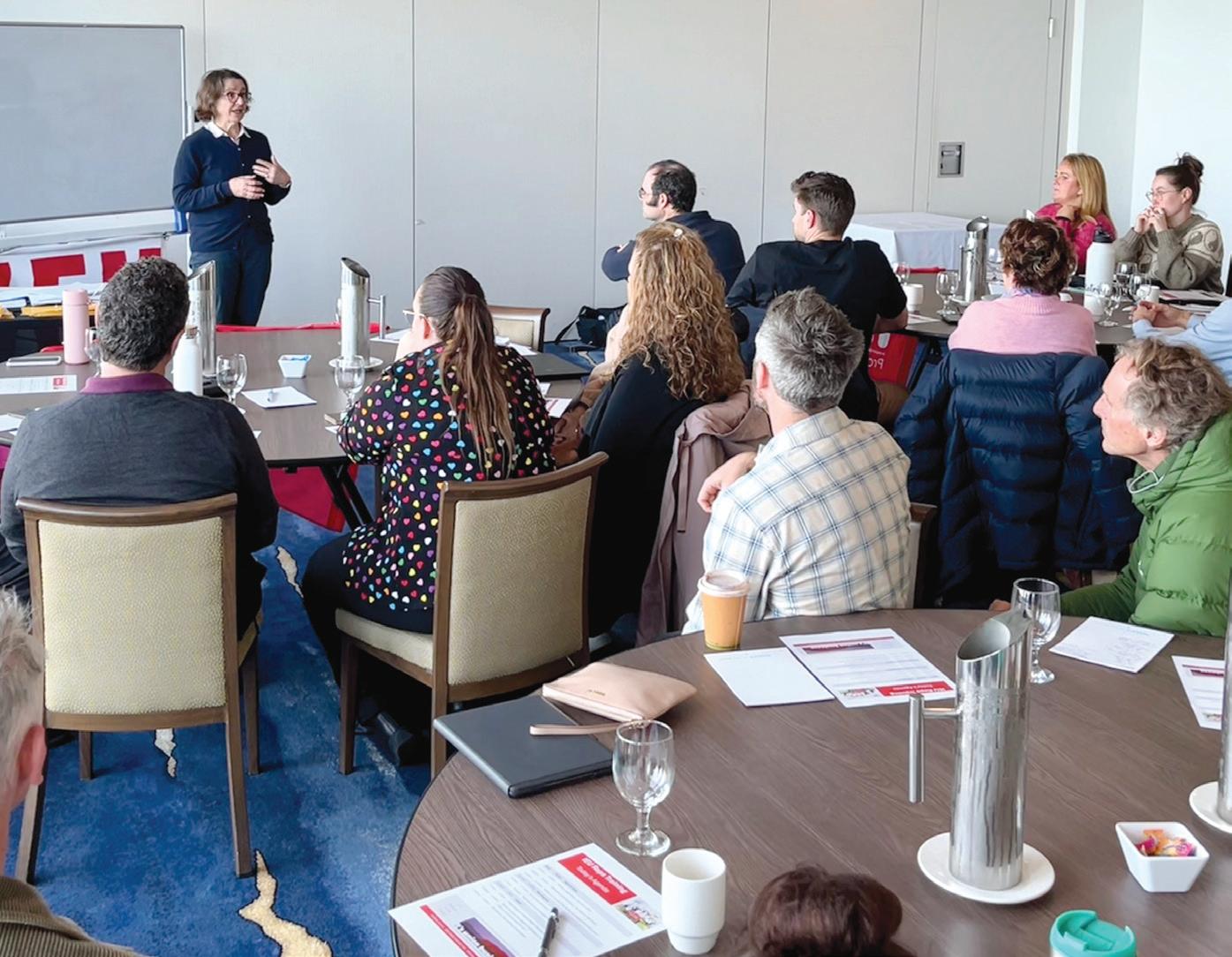
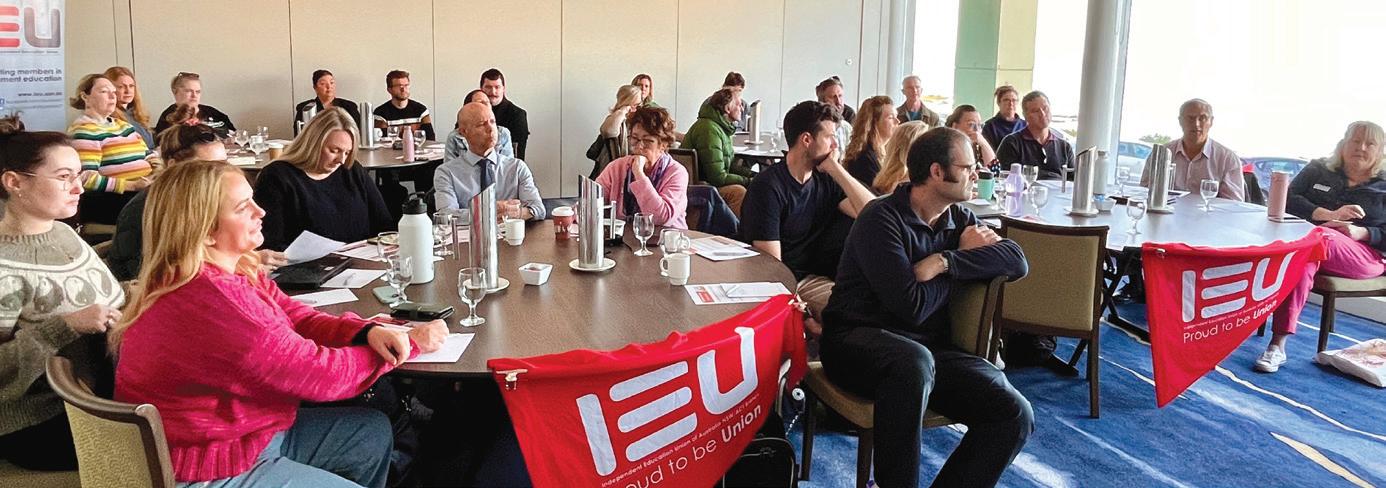
We talk to IEU reps about how they build a strong IEU chapter in their school. Strong chapters make for a strong union and therefore greater bargaining power when we negotiate for your pay and conditions.
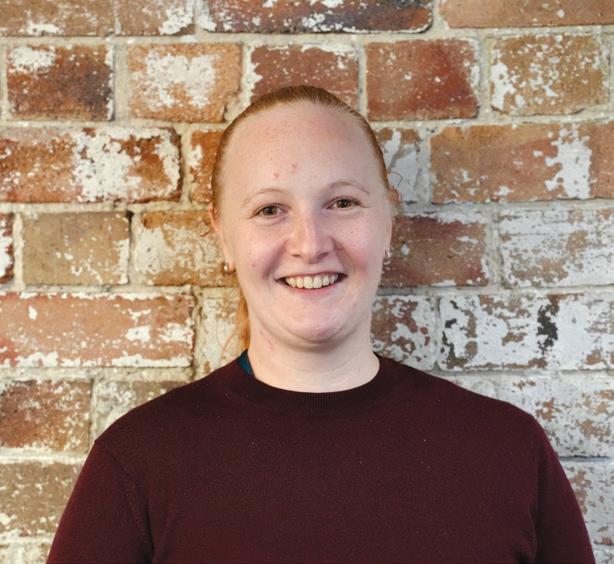

As an instrumental music tutor in the Amadeus program, Adele Sutton works for Sydney Catholic Schools and the Archdiocese of Sydney. She’s the union’s rep for the Amadeus program, a new and growing chapter.
Adele studied at the Conservatorium of Music and teaches woodwind instruments to students in Catholic schools in Sydney. “I just am passionate about music and teaching students,” she said.
Adele joined the IEU over two years ago and was one of the first members of the union from the Amadeus program. Adele’s partner, a union lawyer, encouraged her to be a part of the IEU. “He was kind of like, ‘you know, you’ve got to join’,” she said. But her partner wasn’t the only reason she signed up. A rep at a school she was working at told her and other Amadeus tutors the IEU was for them too, something she hadn’t previously known.
A lot of Amadeus tutors “don’t realise that they can actually join the union”, said Adele. “They think it’s not for them, it’s for the class teachers and for the school staff, they don’t realise as head office employees that they can actually join the union as well.”
“The union is there to help them and support them and that is how our conditions will improve if we have better membership and better representation.”
As a rep, her primary goal right now is growing her chapter. She wants other Amadeus tutors to know that “the union is there to help them and support them and that is how our conditions will improve if we have better membership and better representation”.
Recruiting other tutors can be challenging because she works in different schools and doesn’t see or meet her colleagues regularly. To Adele, it’s about spreading the word to as many people as she can and “hoping that they will also spread the word” so it becomes a chain reaction.


Christoper Modini’s parents inspired him to become a teacher and a union member. “Both my parents are educators,” Christopher said. “So, they’ve taught me so much about being a teacher and they were the major driver behind me actually joining the union, showing all the benefits.”
Christopher wants to pass on the knowledge his parents instilled in him to other members and prospective members. “I hope to increase the members at our school, we do have quite a young cohort of people coming in. They don’t really understand what the union can offer them.”
Christopher has been teaching for six years and, as a young rep, he still feels like he’s learning. “But I’m enjoying the challenges,” he said.
Christopher became a rep over two years ago at a critical time — he was able to play a role in
the Hear Our Voice campaign of 2022. It was “a big step up” for Christopher, who feels fortunate to have had that leadership opportunity.
He knew he was ready to take on the challenge and had supportive fellow unionists encouraging him and letting him know he was doing the right thing. “They were always there to help me if I needed.”
Christopher enjoyed attending a reps training day earlier in the year, and he felt a strong sense of camaraderie. He didn’t know what to expect but came out feeling like “we’re all on the same journey”.
No matter where reps come from or what stage they’re at in their career, everyone always has more to learn and “all of us have that desire, that passion to share our knowledge with everyone,” he said. “And it’s nice to see that everyone really is collegial about it.”
Bede Hart
Retiring principal: Never tired of students
“Every day is a happy day when you’re working with children,” said Bede Hart, who is retiring after 45 years in Catholic systemic schools.
Bede became a principal at the age of 25, just four years after starting his first teaching job at St Michael’s Primary School in Deniliquin.
“I got a call from the director saying they wanted me to move over to the Wagga Diocese to be a principal, and my response was ‘you’ve got to be joking mate’,” Bede said.
But the director also offered Bede’s wife a learning support officer role at the same school and, in the end, convinced the young Bede he had the right skills for the job.
The school, St Thomas Aquinas in Tarcutta, had a cohort of 35 children, and Bede said he was a “half-day” teacher with extra administrative duties.
“I had the best four years ever, it was just incredible –every child came from the land, and they were so well-mannered,” Bede said.
“The parents were wonderfully supportive and appreciative of someone in their town knowing the children. I learned so much,” he said.
children missed life in Albury, so Bede returned to the area to take the reins at St Anne’s in 2009.
In 2016 he was asked to undertake a consultancy with the Diocese of Wagga Wagga. “I wanted to try and promote a better relationship between the office and the principals, I felt communication had become impersonal,” Bede said.
“It was another big learning curve, but I missed the students, so I went back to St Anne’s and that’s where I stayed.
“Whenever you have a bad day, you just have to go and talk to kids. They’re open, you know, just terrific. Fantastic.”
Bede said one of the highlights of his career was being involved in the opening of an Aspect school for students with autism near St Patrick’s, the first such rural school, and being involved in promoting inclusion for special needs students generally.
“I had great staff, and that’s one of the things I’ve learned. You’re as good as your staff.”
“We hardly saw anyone from the office in those days. But once an inspector came out and said we weren’t teaching the right hours for a Catholic school.
The school ran from 9.30am to 3pm. It was reliant on the buses for the local government high school and without the buses, the children had no way of getting to school. When Bede pointed this out, the inspector left them alone.
Bede said cattle would occasionally break through the school’s fence and leave manure on the school grounds, and the children were ready with their shovels to deal with it. “They all came from farms, you see.”
After four years, Bede became the assistant principal of the much bigger St Patrick’s at Albury, which had 550 students, eventually becoming principal, and staying on for 18 years.
“I had great staff, and that’s one of the things I’ve learned –you’re as good as your staff.”
To be closer to his wife’s family, Bede took a principalship at St Peter’s at Port Macquarie after St Patrick’s. But their four
In his time as chairperson of the Diocese of Wagga Wagga Principals’ Association in the 1990s, supporting teachers with inclusive education was one of Bede’s passions.
As well as being chairperson of the Association, Bede, a career-long union member, served as a rep on the IEU’s Principals’ Sub Branch in the early 2000s.
“Obviously it’s always good to have the support, but being active in the sub branch I got to know names and faces, and that’s important to encourage other principals to get in touch with the union.
“It’s a good sounding board for principals, someone to call and clarify things with, and it helps you stay up to date with the latest changes in regulations, things like parental leave entitlements.
“It’s valuable professional support.”
When Bede answered the call from Newsmonth for this interview, he was battling a recalcitrant door, admitting he may have been more successful with students than as a home handyman. We hope the rest of Bede’s retirement proves more relaxing.
Sue
Osborne Journalist

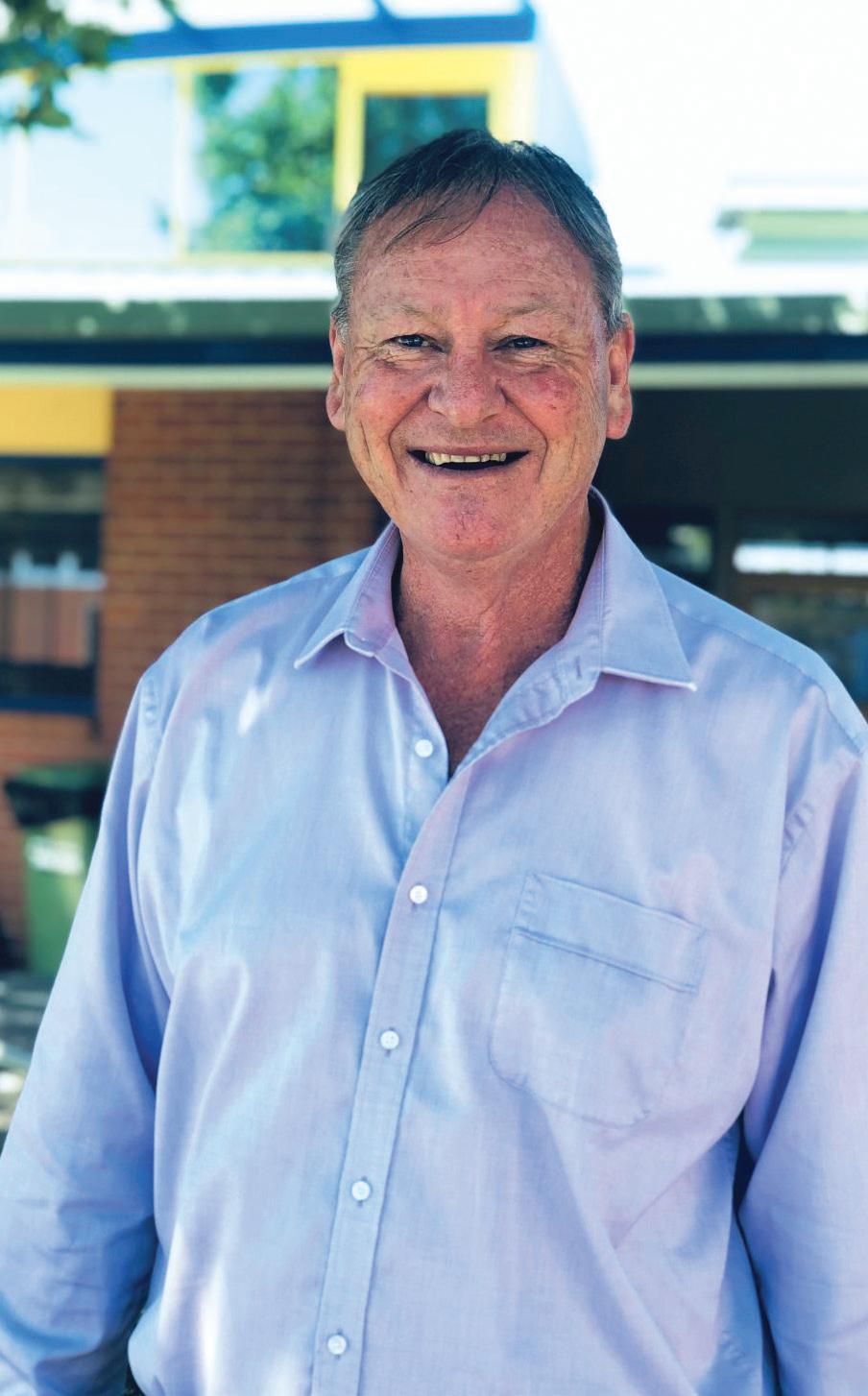
Jessica Raeside Globe-trotting teacher stays in the union loop
Education is a universal profession and IEU members can be found all over the world. Meet Jessica Raeside, who has taught in many countries while retaining her union membership.
Jessica Raeside has been a teacher librarian and K-12 teacher in Australia, the UK, South Korea and the United Arab Emirates.
“My husband was seconded to Seoul for work,” Jessica said. “We didn’t know it at the time, but we ended up living in South Korea for four years. I taught at Seoul Foreign School (SFS) as an educational technology integration specialist from 2013 to 2014 and as a cover teacher in 2014 and 2015. I was educating globally minded international students in both the middle school (grades 6-8) and the British School (reception to year 9).”
During her time at SFS, Jessica was responsible for providing ongoing professional development and support for staff in all areas of technology.
“While living in South Korea, I used my time to reflect, evaluate and improve upon my current teaching practices,” Jessica said.
“I continued to expand my own professional learning journey and was awarded a Master of Education in Teacher Librarianship via distance learning from Charles Sturt University.”
During the Covid pandemic, Jessica was teacher librarian (K-6) at Jumeirah English Speaking School, commonly known as JESS, in Dubai.
“The library remained open at all times serving the needs of temporary and permanent distance learners, as well as students attending school each day,” Jessica said.
In Australia, she has been a teacher librarian (K-6) at Loreto Kirribilli in the Junior School Library and was ICT Integrator and classroom teacher at Kambala in Rose Bay.
“I have enjoyed the experiences of working at international schools around the world, I have gained a wealth of knowledge both professionally and culturally,” Jessica said. “There are slight cultural differences from country to country, and language barriers. But no matter where you’re located, the same books are flying off the shelves! All students love to read the Dog Man and Diary of a Wimpy Kid series and anything by David Walliams.”
“There are slight cultural differences from country to country, and language barriers. However, no matter where you’re located, the same books are flying off the shelves!”
When her husband’s work took her to Switzerland, Jessica saw it as an opportunity to continue her education journey.
She completed a Master of Educational Leadership in Switzerland with the Australian Catholic University.
Jessica is continuing her studies and has just been awarded a Research Training Program scholarship to undertake a higher degree by research as part of the Doctor of Philosophy program at the University of Notre Dame Australia.
In the United Arab Emirates, Jessica was Head Librarian at Dubai International Academy (DIA). “I oversaw the entire DIA Library which caters for 2400 students, over 200 staff members and a large parent community.”
Jessica looks to the IEU for support and recommendations about changing jobs, returning to NSW to teach, and navigating the ever-changing accreditation requirements, especially around higher levels of accreditation and applying for ‘leave of absence’.
“I wouldn’t want to complete the wrong form or miss submitting a form altogether,” she said. “I send the IEU an email for clarification when returning from teaching overseas or when I’m about to embark on another overseas posting Jessica is a regular Newsmonth reader. “The online Newsmonth is easy to navigate, and being an avid reader, I enjoy the professional reading,” she said.
Jessica began her teaching career three decades ago in the Parramatta Diocese. “The first principal I worked for, Mr Ian Jordan, his advice was, ‘never set foot into a classroom without being part of the union’. I remember his advice and think of it regularly.”
Sue Osborne Journalist
Members are the lifeblood of the union, and here four members from different schools, sectors and countries share their stories with us.
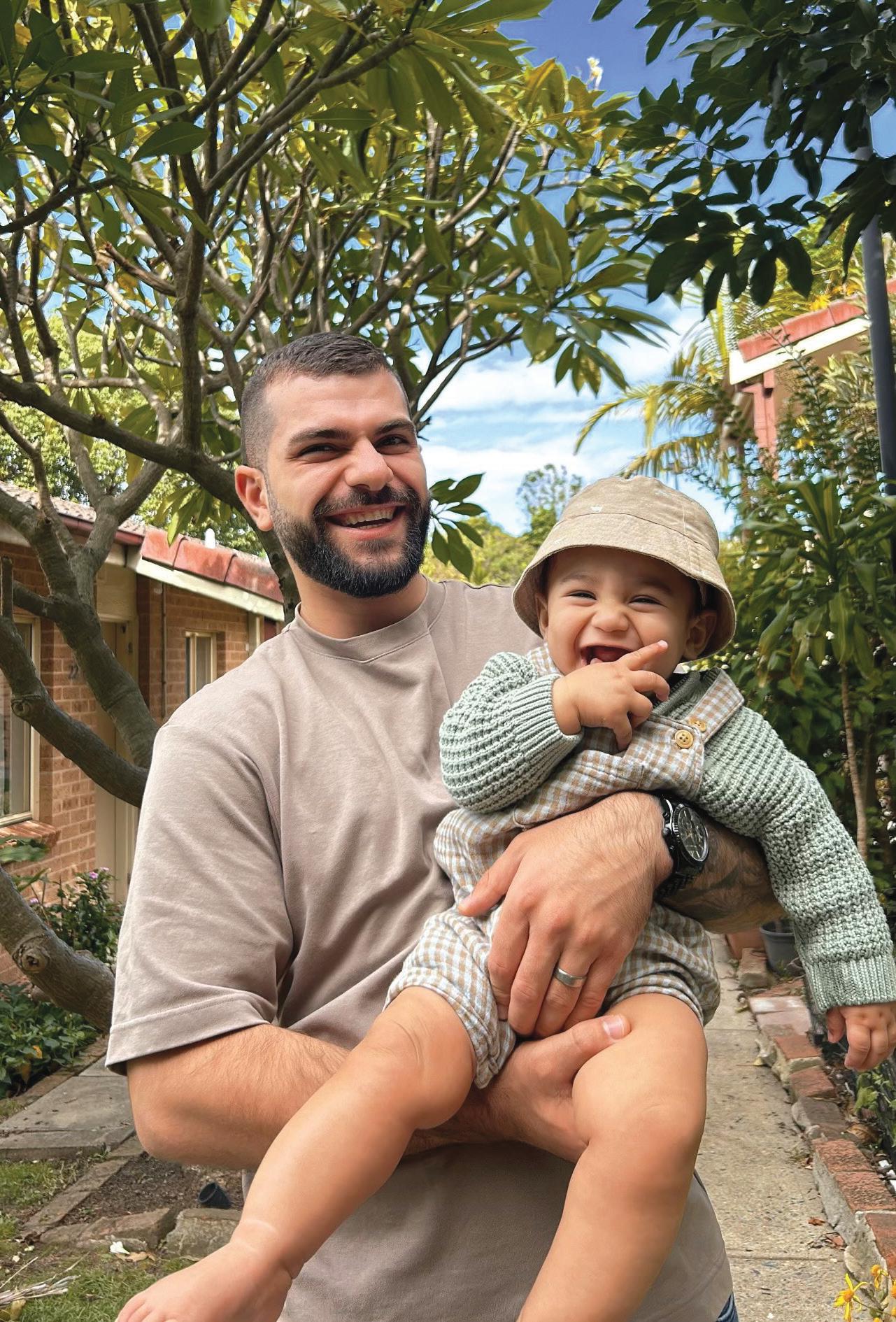
Just two years ago, Muhammed Abdallah, who teaches at Casimir College Marrickville, would not have been able to enjoy several months paid leave with his young son.
But thanks to the concerted efforts of IEU Catholic systemic school members who took to the streets in great numbers in 2022 to fight for better pay and conditions in their new enterprise agreement, Muhammed can bond with 10-month-old Idris.
“Having this time as a father with your child is probably one of the most important times of their life,” Muhammed said.
“They grow so much the first year or two. Being able to be with them during this phase is such a blessing,” he said.
“What an opportunity to be involved in our child’s life for however many weeks you choose to take. You can take up to 12 weeks, which is a significant amount of time.
“We’re lucky in the sense that we can show content not just theory,” Muhammed says.
“We can deliver pracs that help with understanding and make it a little bit exciting and engaging.
“You ask kids, ‘What’s your favourite thing about science?’ and they always say ‘the practicals’.”
“Having this time as a father with your child is probably one of the most important times of their life.”
The IEU chapter at Casimir recently nominated Muhammed to become their rep, and he now shares the role with another member, Laura Proctor.
As a relatively new teacher with four years’ experience, Muhammed didn’t want to take on the rep’s role alone, but he was happy to share it.
Muhammed is grateful that the two previous reps at the school, who have decades of experience, are always on hand to help, as is his IEU organiser.
The enterprise agreement provisions allow Muhammed to take leave as the non-initial carer after his wife, Alyssa, who works for Telstra, took an initial 10 months’ leave to care for Idris, before returning to full-time work.
“Having all these memories that you can look back on and go ‘wow, I got to spend time with my baby when he was growing so much’.
“He’s starting to crawl, stand, interact with us and notice things.”
Muhammed joined the union during his practicum, encouraged by his supervising teacher, and he then attended a chapter meeting at Casimir College as a student member of the IEU. He went on to become a science teacher at Casimir. Science, particularly chemistry, has been Muhammed’s passion since school days.
Bryan Rowe had finished a day of teaching when a former student came to see him.
In his school days, the young man had been in some trouble, but now he had a job just up the road. Looking at him covered in sweat, Rowe, an Aboriginal education teacher, could see his old pupil had been hard at work. “And I went to shake his hand, and he’s just like, ‘nah’ and just gave me this huge, big hug,” Rowe remembers, smiling deeply.
“Do you remember teaching me to play the didge?”, the young man asked him. Rowe certainly did, and his former student told him he had gone on to play the digeridoo at opening ceremonies for NRL games. “And that’s all because of you,” he told Rowe.
It’s one of Rowe’s favourite memories of his many years as an Aboriginal education teacher. The IEU member, who proudly identifies as having Aboriginal heritage, teaches at San Clemente High School in Mayfield.
He feels privileged to be in a role where he can foster a supportive environment for Aboriginal and Torres Strait Islander students and their families.
pupils are painting, they chat about the meaning of their artwork, said Rowe.
“Where’s their mob from? And what’s the totem associated with that mob?” Painting becomes a vehicle for students to discuss their identity and culture.
A few students involved in the Koori Knockout, a netball competition, wanted to organise a similar event for local schools. With Rowe’s guidance, it came to fruition. San Clemente and six other high schools took part in a round robin, plus cultural activities. The competition ran again this year for NAIDOC Week, an important time for the school.
Part of his position as an Aboriginal education teacher is about “helping to heal the wounds of the past”.
Rowe knows that Australia’s treatment of Indigenous people has created a level of mistrust towards some institutions. Part of his position is about “helping to heal the wounds of the past”, he said.
According to Rowe, San Clemente High School has 60 students who identify as Aboriginal or Torres Strait Islander, which helps to create a sense of community. Rowe feels “very fortunate to have a principal who is so supportive of promoting Aboriginal activities in this school”.
Rowe organises a range of educational activities, events and programs for his students. An artist facilitates dot painting workshops, and while the
Every year, an Aboriginal instructor comes to the school in the days leading up to NAIDOC Week, giving Rowe’s students the opportunity to learn traditional dance “And I think that’s the main thing that helps tie the fabric of our Aboriginal students together,” he said.
Rowe is excited about another project being organised by Catholic Schools NSW. Students will be reciting the Our Father (or Lord’s Prayer) in their traditional languages, which will be recorded by a film crew.
It is an opportunity for the students to broaden their experiences of their culture, said Rowe. He believes it will also have a knock-on effect for “all of the Aboriginal and Torres Strait Islander kids in the school seeing that and going ‘oh wow, look at that, we’re being represented up there’.”
For Rowe, the best part of his job is helping people and fostering connections with community. “And that’s what I feel really honoured to be able to do, particularly for Aboriginal and Torres Strait Islander people.”
Lucy Meyer Journalist
Muhammed said that while the focus of the 20222023 Hear Our Voice Catholic systemic campaign was on a long overdue pay rise, the other entitlements, such as the parental leave provisions, were also important.
“The media probably overlooked these things that the union fought for, but they were wins for us,” Muhammed said. “People who had kids before 2023 couldn’t access this leave, so I’m lucky.”
Sue Osborne Journalist
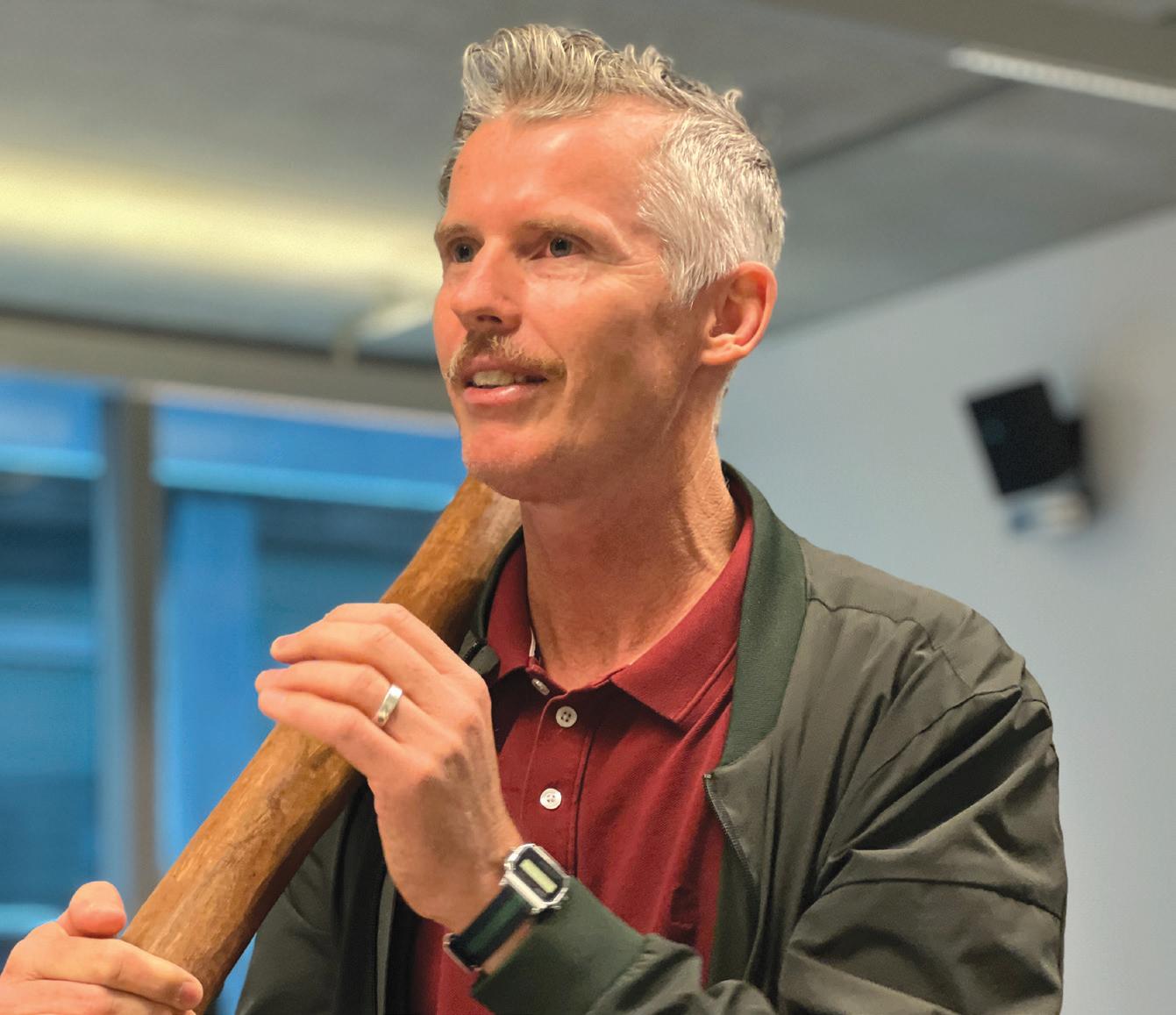
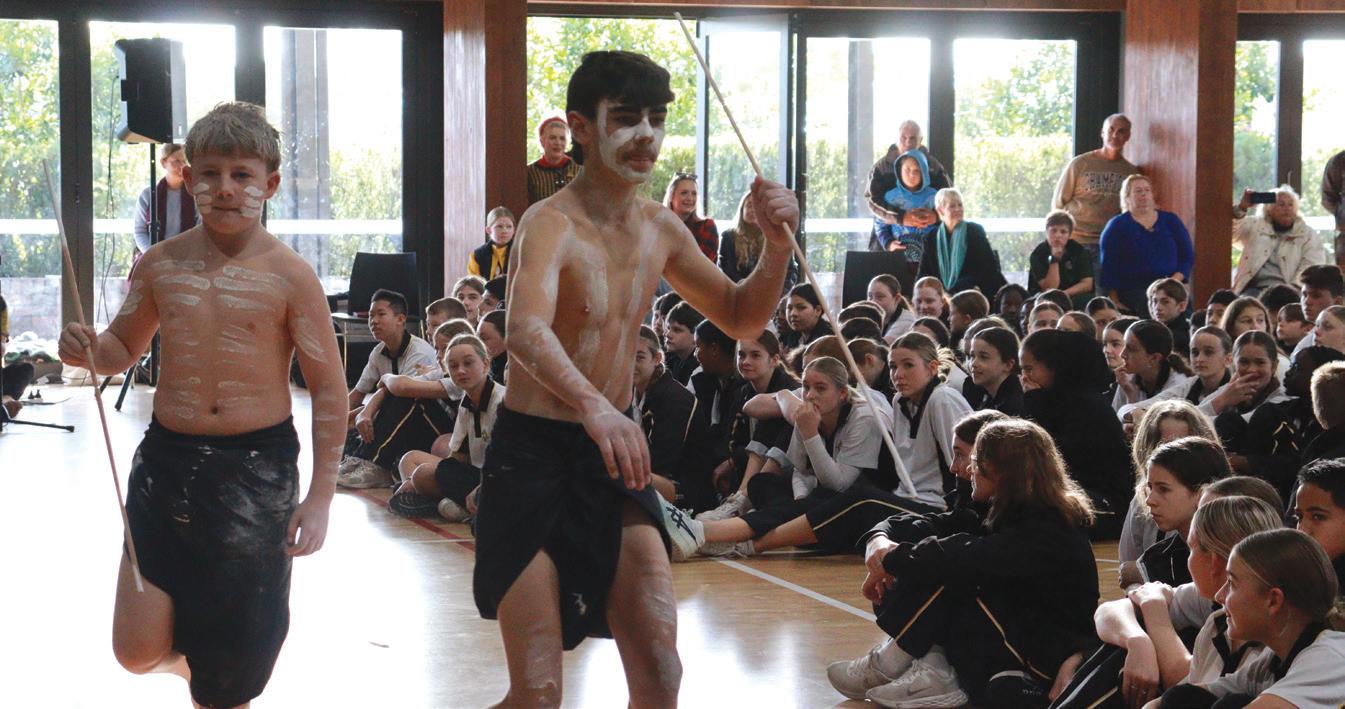
The IEU has 19 geographical sub branches across NSW and the ACT, plus the Principals’ sub branch. Sub branches meet four times a year, usually in the first three or four weeks of each term.
Sub branch meetings are a way for reps and members to provide feedback to the union about what’s happening on the ground in their workplaces. The meetings are also an opportunity for reps and members from each region to hear updates from IEU organisers.
Each sub branch sends four to six delegates to quarterly IEU Council meetings. Council is the union’s decision-making body, bringing together about 115 member delegates from throughout NSW and the ACT.
The IEU Executive of 22 members is elected every three years by members.
All reps and any IEU members who’d like to develop their union activism are warmly invited to attend their region’s sub branch meeting.
Contact your rep or organiser if you’d like more information.
Central Coast
The Central Coast Sub Branch includes Gosford, Erina, Green Point, Lake Munmorah, Tuggerah, Wyong and surrounds.
The Central Coast Sub Branch met on 1 August at the Ourimbah RSL Club, Ourimbah. Five members attended, representing Catholic systemic and AIS schools, along with three IEU staff. We discussed:
AIS negotiations
Broken Bay collaborative planning time teacher release an overview of NSW work value decisions for teachers
• restructures in Catholic high schools
Broken Bay wellbeing booklet.
Jim Hall Organiser
Central Metropolitan and Metropolitan East
The Central Metropolitan Sub Branch includes central Sydney, Sydney’s inner-western suburbs and Rhodes, Concord and Meadowbank. The Metropolitan East Sub Branch covers the eastern suburbs of Sydney, including Bondi, Waverley and Bellevue Hill.
In 2024, the sub branches of Central Metropolitan and Metropolitan East have been trialling combined meetings to revitalise them and connect members across the two sub branches. At the Term 3 meeting, held on Wednesday 7 August, we welcomed 12 members from the two sub branches.
Members were particularly interested in the IEU’s negotiations with the Association of Independent Schools for new multi-enterprise agreements for teachers and professional, administrative and operational staff (see page 3), as well as the briefing on the new delegates’ rights changes recently introduced into the Fair Work Act
The Term 4 meeting will be held at the IEU’s Wattle Street office on Thursday 14 November. Members from both sub branches are warmly invited to attend.
Kendall Warren Organiser
Central West
The Central West Sub Branch includes Dubbo, Bathurst, Orange and Lithgow, as well as Cowra, Mudgee, Parkes, Forbes, Grenfell and Wilcannia.
The Term 3 Central West Sub Branch meeting was held in Dubbo on Friday 2 August at a new venue, Dubbo RSL. We had a good rollup of members from across 13 different chapters meeting to discuss various issues on a broad agenda. Also attending were organisers Donna Widdison, Pat Devery and Assistant Secretary Lyn Caton.
The meeting was opened with a Welcome to Country by Karen Andriske, followed by introductions. The election of the two vacant Council positions was discussed and a vote will take place when the AEC sends out voting forms – hopefully by late October. The three nominees are Peter Nunn from St Laurence’s in Forbes, Geoff Haywood from Scots All Saints in Bathurst and Maureen Milgate from St Mary’s in Wellington.
We discussed campaigns and negotiations in independent schools, Christian schools, preschools and Catholic systemic schools. We talked at length about the reps’ training day to be held in Orange on 20 August. All those present were encouraged to attend and keep abreast of their rights and responsibilities, strategies for running chapter meetings, useful skills for supporting members and an overview of our entitlements.
We then discussed issues by chapter and ways of dealing with them.
Our next meeting will be in Bathurst on Friday 15 November.
Louise Hughes, Sub Branch President
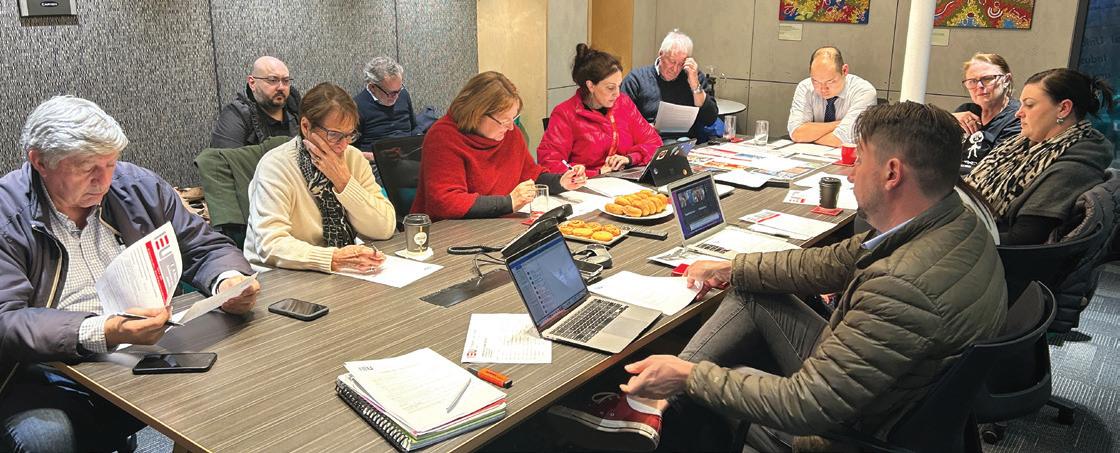
Parramatta, Mt Druitt, Castle Hill, Marsden Park, Blacktown and nearby suburbs.
The Term 3 Cumberland Sub Branch meeting was held on Monday 29 July at the union’s Parramatta office, with a hybrid zoom option.
As part of the union’s commitment to to train and empower reps, the meeting included discussion of delegates’ rights under the Fair Work Act
Catholic systemic reps in primary schools raised concerns about the number of playground duties professional, operational and administrative staff are doing. The union advised that these practices need to be in line with the rights of the staff in the enterprise agreement and diocesan policies.
Independent school reps were keenly interested in discussing the current IEU negotiations for new multi-enterprise agreements (see page 3).
Unregulated workloads in the independent school sector drew most discussion, including the union’s claim for greater transparency and consistency of loads with other sectors. The sub branch was alarmed to learn that their employer’s solution to easing workloads in term time was to increase work demands and expectations in non-term time and to deny staff their right to disconnect after hours.
We urge all reps to hold regular chapter meetings (with or without an organiser present) to ensure all members are up-to-date with union matters and campaigns. We also recommend chapters elect two reps: one for teachers and one for non-teaching staff.
The next meeting will be held on Monday 4 November 2024 at 4.30pm in our Parramatta office, followed by end-of-year dinner and drinks at the Royal Oak Hotel. If reps are unavailable to attend, we encourage you to send another member in your place.
Haddad Organiser
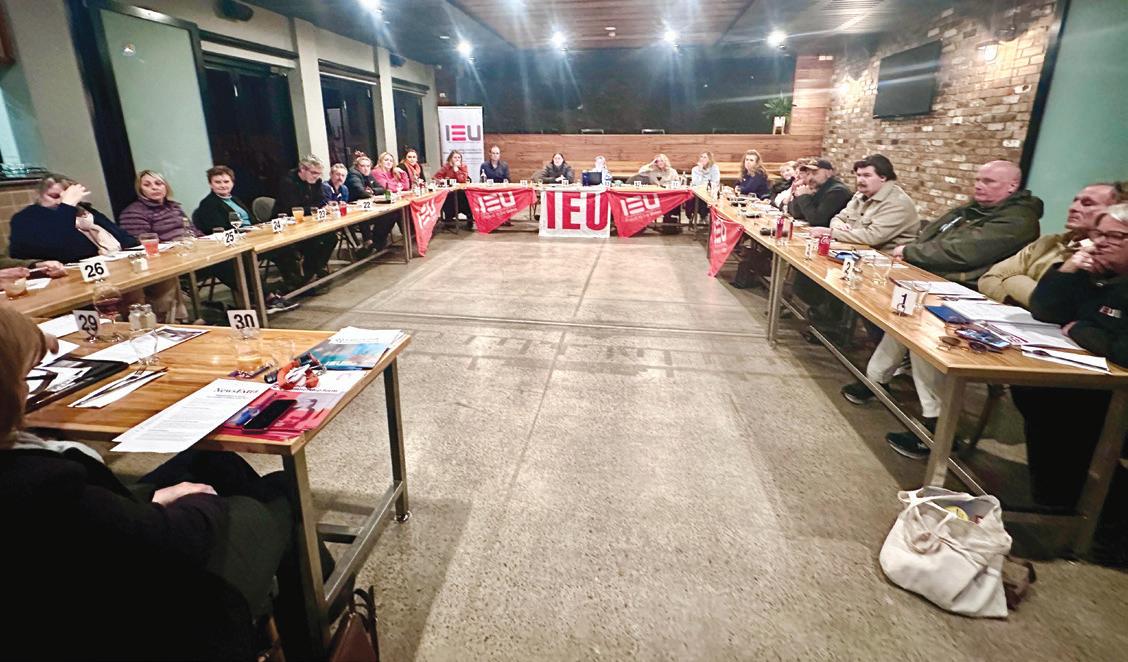
The Hunter Valley Sub Branch includes Newcastle, Maitland, Singleton, Scone, Taree and surrounds.
The Hunter Valley Sub Branch meeting was well attended, with representatives from independent and Catholic schools as well as early childhood teachers. The sub branch welcomed Assistant Secretary Amanda Hioe.
In addition to updates on current and pending bargaining, the sub branch spent considerable time discussing workloads and entitlements across all sectors.
Concerns were raised about the never-ending expectations around programming and evaluation. Most members say they are still being overloaded with unnecessary administration tasks that take them away from their key responsibilities of lesson preparation and teaching. Members also expressed concerns about increasing expectations to attend events out of school hours.
The sub branch celebrated new permanent contracts for learning support assistants in Catholic schools. However, reps explained that cuts to learning support budgets, combined with a new formula emphasising enrolment rather than need, has resulted in high-need students not being supported appropriately. This places considerable extra stress on all members and leads to some students not receiving support.
We discussed payment of allowances and, in particular, travel allowances for members who are required to attend activities away from their workplace. Many members are routinely advised to claim travel on their tax rather than being paid in accordance with the provisions under the relevant agreement. The union will continue to pursue these issues.
The sub branch received an update on bargaining for the Maitland-Newcastle Catholic Schools Office Enterprise Agreement and notes the commitment and dedication of members involved in the bargaining committee.
Thanks as always to all reps who attended. For our Term 4 meeting, please check: ieu.asn.au/events
Therese Fitzgibbon Organiser
Ku-ring-gai
The Ku-ring-gai Sub Branch covers Sydney’s north shore, including Hornsby, Wahroonga, Waitara, Warrawee, Thornleigh, Pymble, Turramurra, Berowra and Asquith.
The Ku-ring-gai Sub Branch held its Term 3 meeting on Monday 5 August at Hornsby RSL. Ku-ring-gai reps and members met with IEU organisers Charles Wheeler and James Jenkins-Flint and Industrial Coordinator Neal Bent.
With several reps from independent schools present, the hot topic for the evening was the proposals for pay and conditions made by the Association of Independent Schools (AIS) in recent bargaining meetings with the IEU (see page 3).
Many concerns were aired and robust debate ensued. Indpendent school members who threw their support behind their Catholic systemic colleagues for the Hear Our Voice campaign in 2022-23 welcomed the reciprocal support and solidarity from their Catholic school counterparts.
Neal talked through delegates’ rights, which was greeted with much interest from members. Constructive conversations followed about how to harness these new protections to grow our union and improve pay and conditions.
Our sub branch meets in the Bistro at Hornsby RSL at 4.30pm on Mondays in Week 3 of each term. Attendees discuss issues by branch, sub branch and school before enjoying a meal and drinks together.
Charles Wheeler Organiser
Lansdowne (Lakemba to Liverpool including Bankstown, Fairfield, Auburn) The Lansdowne meeting was held after Newsmonth went to press.
Mid North Coast
The Mid North Coast Sub Branch includes Coffs Harbour, Kempsey, Port Macquarie, Bellingen, Nambucca Heads and surrounds.
A strong contingent of delegates, all from Catholic systemic schools, attended the meeting at Coffs Harbour on Friday 2 August.
Members talked about several worrying expectations being imposed on members in primary schools, well beyond what could be considered reasonable. We discussed the importance of the new right to disconnect legislation and the need to champion the professionalism of our members in response to managerial overreach and micro-management.
Secondary school representatives reported a rise in students harassing members. It was noted that the Diocese of Lismore Catholic Schools had clear policies on harassment when harassment was initiated by staff but was silent when it was initiated by students against staff. To that end, the sub branch passed a series of motions calling on the Diocese to develop a policy framework to protect staff and comply with its positive duty to provide a safe work environment. A version of these motions will be tabled at Council on 17 August. It was also reported that between schools with similar student populations there is significant disparity in how coordinator points, release and pay are allocated and distributed. A motion was passed calling on the Diocese to standardise and publish this allocation process to ensure equity across all its schools. We asked for this to be codified in the next enterprise agreement and/ or Work Practices Agreement process.
Our Term 4 sub branch meeting will be held at Nambucca Heads RSL on Friday 22 November at 6pm, followed by dinner. We look forward to seeing members there.
Markus Muschal Sub Branch President Monaro
The Monaro Sub Branch covers Canberra and the ACT.
The meeting, held on 1 August at the IEU office in Deakin, was well attended by members from different sectors. The meeting provided a platform for robust discussion on several critical issues affecting members. Key topics included: the possibility of creating Fact Sheets for Teacher Quality Institute (TQI) and ACT-specific requirements to help members clarify where excessive workload demands are coming from • the impact of International Baccalaureate (IB) programs on workload, pay and conditions – it was suggested that sharing information between reps at IB schools would be valuable the purpose of pupil-free days – professional development versus planning timetable clashes, split classes and workload for those assigning and marking lessons caused by timetabling software ensuring time on school camps is properly tracked as part of the working week concerns were also raised about the Independent Schools Teacher Accreditation Authority (ISTAA) and the Nationally Consistent Collection of Data (NCCD).
The sub branch commends the excellent work of reps in ACT Christian schools who are currently in challenging negotiations for new enterprise agreements.
Our next meeting is scheduled for Thursday 14 November 2024.
Alex
Thompson Monaro Sub Branch Deputy President
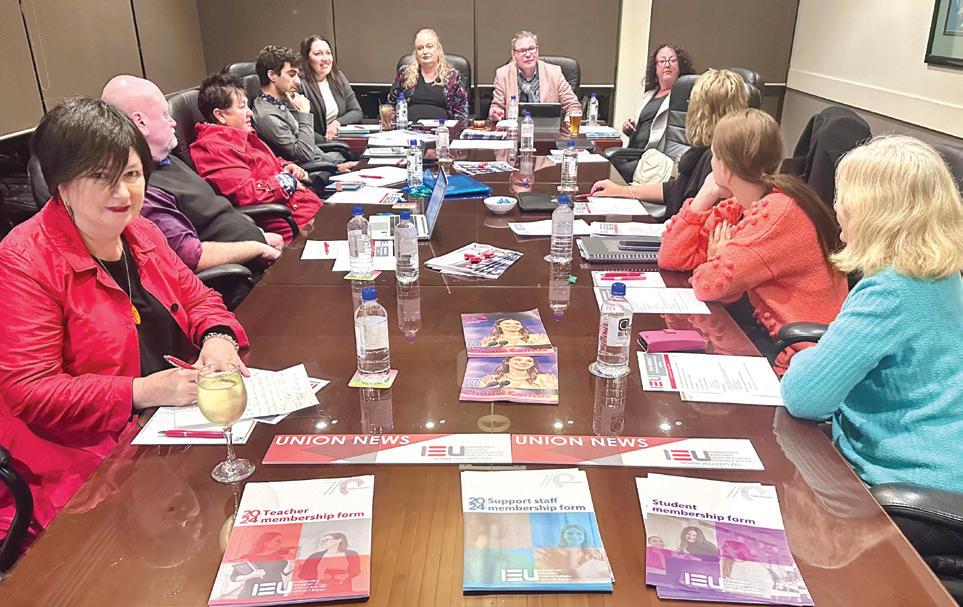
Coast
The North Coast Sub Branch covers Lismore, Tweed Heads, Kingscliff, Pottsville, Murwillumbah, Mullumbimby, Kyogle, Ballina, Lismore, Casino, Coraki, Woodburn, Yamba and Maclean.
The sub branch met on 7 August at the Ivory Hotel in Tweed Heads. Reps came from Catholic systemic, Anglican, Christian and other independent schools throughout the region. There were some reports of rule changes regarding flexible work arrangements (FWA). This was verified by a number of schools. Staff are being told they cannot access FWA if they have already been on a FWA for two years, and that they are welcome to apply to swap from permanent full-time to permanent part-time. This is being offered to all on FWA not just those over 55 years. Other issues raised and discussed included: teachers on part-time load are being expected to attend PD and do extras above pro-rata expectations. teachers are now expected to use some RFF to attend case management meetings to discuss student needs. This is on top of usual demands for which RFF is used. workloads are not decreasing as members have expected. teacher’s aides are not allowed to carry their phones when on playground duty despite the benefit of safety and first aid. Teacher’s aides are not receiving support from the school executive when they report playground behaviours or issues. support staff are being evaluated by the executive and no reason has been given.
The next meeting will be held on Wednesday 6 November at the IEU’s Lismore office.
The North West Sub Branch covers the New England region, including Armidale, Tamworth, Gunnedah, Tenterfield, Inverell, Moree and Narramine.
While shorter days, chilly weather and the cold and flu season saw our numbers down a bit, there were still plenty of reps gathered at the Tamworth Hotel on Friday 2 August to discuss all things union.
We had an extended conversation about accreditation issues across the sectors, including what would become of the Association of Independent Schools (AIS) proposals (see page 3); and where the current ISTAA process would fit alongside NESA Highly Accomplished and Lead Teacher accreditation in terms of portability. The maintenance of accreditation at NESA Proficient level was also discussed, as was the impact of restrictions in recent years across the professional learning calendar and agenda. It was noted that there was increased engagement from members in our AIS schools in the region with a growing awareness of some employer proposals that would see all staff
worse off in crucial ways. The union has not accepted these proposals. It is important that our members continue to raise awareness of industrial matters in their schools.
The North West Sub Branch will hold an AEC election for two positions on the IEU Council. We look forward to a full contingency at the upcoming AGM on 26 October.
Sue McKay Organiser
Northern Beaches
The Northern Beaches Sub Branch includes Manly, Dee Why, Collaroy, Narrabeen, Terrey Hills, Warriewood and surrounds.
The Northern Beaches Sub Branch welcomed a new rep to their first meeting. We also congratulated Sukli Barrell on her election to IEU Council representing the sub branch, but we still have four vacancies to be filled.
The meeting was an opportunity to farewell a long-standing IEU rep from a Catholic independent school and an IEU member of 39 years who retires at the end of the year to take up grandparenting duties.
There was plenty of interest in the independent school negotiations (see page 3), with opportunities for reps to seek clarification around the outstanding issues.
The next meeting is set for Wednesday 6 November.
Megan Bruce Organiser
Northern Suburbs
The Northern Suburbs Sub Branch covers Artarmon, Gordon, Chatswood, Cremorne, Gladesville, Hunters Hill, Kirribilli, Lane Cove, Lindfield, Milson’s Point, Mosman, North Sydney, Roseville, Ryde, St Ives, St Leonards, Willoughby and Woolwich.
The meeting was held on Tuesday 30 July with Sub Branch President and Chair Anna Luedi, (also of a member of the IEU Executive), in attendance. The main topics of discussion were programming expectations in the Sydney Archdiocese, as well as proposed feedback to the Diocesan working party on teacher workloads.
In a similar fashion to work previously done by the IEU with the Broken Bay Diocese, the Sydney Archdiocese is looking to address teaching workloads via discussions with union members.
Also, this year the Sydney Archdiocese provided some primarylevel teaching programs to staff. The programs are of significant length, with a one-term primary English program reaching some 80 pages. There is some confusion among members about the expectations arising from these programs and whether they are intended to be used in their entirety or if teachers can modify and choose the most suitable elements for their class. Further, although the programs are lengthy, extensive resources required to follow them are often not provided.
More training for learning support staff was also discussed, to enable them to assist to a greater extent with students of differing learning needs.
The Term 4 meeting will be held in North Sydney with dinner and drinks and we warmly invite all reps to join us.
James Jenkins-Flint Organiser
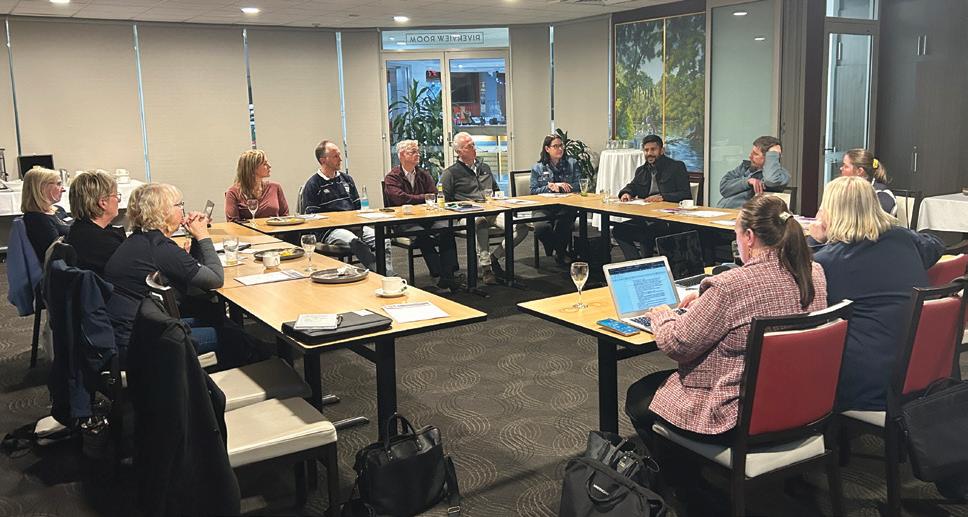
Mountains
The Penrith/Blue Mountains Sub Branch covers Penrith to Glenbrook, Katoomba and Blackheath.
Our Term 3 sub branch meeting was very well attended on 7 August at Nepean Rowers Club. We were glad to welcome some new attendees who were either new reps in their schools or filling in for reps that were unable to attend.
The ‘second chance’ election for Council delegates was successful and we have now filled five of our six spots. It is encouraging to have more members involved at this level of the union.
Schools are still experiencing pressures due to teacher shortages as well as the ever-increasing workloads. There were some questions around the Catholic Schools Parramatta Diocese (CSPD) Teacher Scholarship program and how the ‘Teacher Associates’ should be managed in schools. There doesn’t seem to be any allowance of time and/or pay for staff to supervise them. Organisers will take these concerns to their next meeting with the diocesan office.
Two other major issues discussed were the expectation of part-time staff in independent schools to attend professional development during non-term time or their non-work days and the new payroll system being implemented by CSPD (called Employee Connect). The sub-branch passed unanimous motions in relation to both of these issues for further clarification and action. The outcomes of these motions will be communicated in the next report.
Elizabeth Heggart Sub Branch President
Principals
Principal representatives from across NSW and the ACT convened on Saturday 3 August, both in person at the IEU’s Sydney office and online. The gathering aimed to reflect and discuss crucial matters of governance, change management and workflow parameters.
The discussions were informed by data from two surveys conducted across two dioceses. Key topics included the use of centralised casual cover arrangements and the impact of principals having a teaching load on top of their overall workload. The survey results were unsurprising to many. Numerous principals reported teaching up to 20 hours a week, with over 20 hours on administrative tasks, many of which were duplicative.
Principal members celebrated the recent IEU negotiations that resulted in a 4% pay increase for all Broken Bay principals effective from 1 July 2024. A comparison table of current pay rates across the three Catholic systemic principals’ enterprise agreements (EAs) was presented, revealing a differential of between 1.4% and 5.3% in 10 of the 11 dioceses.
The Sydney Catholic Schools Principals’ EA and the NSW and ACT Catholic Schools Principals’ EA are set to expire on 9 October 2024. Meetings with principal members in each of the 10 dioceses will be scheduled to establish a log of claims.
Principal members also identified the need for increased release time for middle management and promotions positions. Increasing hours for support staff was another key recommendation.
Presentations by Professional Engagement Coordinator Pat Devery and Assistant Secretary Amanda Hioe provided members with the opportunity to seek clarity on various professional and industrial topics.
The next Principals’ Sub Branch meeting will be held in Sydney on Saturday 9 November. All are welcome to attend.
Lyn Caton, Assistant Secretary and Principals Organiser Riverina
The Riverina Sub Branch covers Wagga Wagga, Albury, Griffith, West Wyalong, Leeton, Hay and Thurgoona.
The Riverina Sub Branch meeting was held in Griffith on Friday 26 July. Members extended a warm welcome to Assistant Secretary Lyn Caton, who had been the Sub Branch’s organiser for many years.
Not surprisingly, workloads and related issues were of most concern to members in all the schools represented at the meeting. There was a great deal of interest in the outcomes from the June Council workshops and follow-up at the August Council meeting. The consensus was that the greatest driver for the next Catholic campaign would be workloads.
Challenging behaviours from students in both primary and secondary schools, the failure of behaviour management policies and the lack of appropriate support for both the student and the teacher involved were also of concern. These students are often returned to the classroom without any advice to staff regarding practices for managing the students.
Discussion then segued into work health and safety issues around psychosocial harm, including the powers of health and safety reps and work health and safety committees.
Reps have expressed concern that early career teachers are not receiving their reduced load as agreed with Catholic Education Wagga Wagga. Organiser Jackie Groom contacted CEWW and was advised the schools are receiving the allocation and if the names of the schools are provided to them, they will ensure compliance. An update was provided on the various current campaigns including independent schools, Christians, early childhood education and care and the upcoming Catholic systemic campaign. Lyn gave an update on the IEU’s negotiations with the Association of Independent Schools (see page 3).
Jackie Groom, Organiser
South Coast
The South Coast Sub Branch covers the Macarthur region, the Southern Highlands, Wollongong and the Illawarra region and the northern end of the Shoalhaven region.
The Term 3 South Coast Sub Branch meeting was held at Campbelltown RSL on Wednesday 31 July. The meeting welcomed Emma Ford from the IEU’s industrial team, and while we’d like more reps from the region to join us, the meeting was still rich in the sharing of school-based matters, including: support staff requesting provision of a laptop for their work as the requirement to record information online is becoming more and more prevalent access to the fitness passport as a wellbeing initiative the continuation, or not, of twilight meetings in 2024 and beyond. an increase in meetings for teaching and leadership in 2024 where electronic means would be more efficient diverse learning needs – members are seeing a significant increase in the amount of paperwork and information learning support teachers are required to collect South Coast reps were looking forward to training.
We’d love to welcome more reps to our sub branch meetings, so feel free to join us for the Term 4 meeting and bring another member with you. It’s a great way to have your voice heard.
Luke Breen Organiser
Continued on page 18
Continued from page 17
South East
The South East Sub Branch covers Batlow, Yass, Young, Broulee, Bega, Goulburn, Tumut, Pambula, Googong, Batehaven, Cooma, Queanbeyan.
The South East Sub Branch meeting, held on Friday 2 August, was well attended, with members from Anglican, Islamic, other independent schools and Catholic systemic schools all attending. Reps travelled from Batlow, Young, Jindabyne, Googong, Pambula, Goulburn, Grenfell, Boorowa, and Queanbeyan.
The meeting welcomed acting Assistant Secretary Kendall Warren, who reported on negotiations for new agreements for teachers and professional and operational staff in the independent schools represented by the Association of Independent Schools (see page 3).
The following issues were raised: staff shortages and the increase in teacher workloads
members are experiencing loss/changes to RFF without consultation, unsafe work practices, changes to work hours and increased co-curricular demands
‘grace and favour’ allocation of classes is leading to inequitable workloads and a lack of opportunities for professional growth (with some staff consistently allocated “difficult” classes) affecting staff morale and wellbeing
lack of information on payslips redundancy and the implications for members – the process for deciding who is to be made redundant.
There are also ongoing issues around reporting for NCCD and Teacher Professional Development. There is still duplication and excessive demands on teachers in Catholic systemic schools, with requirements varying across schools. Organisers agreed to meet with the employer to determine what they are requiring of schools and whether it complies with NCCD and NESA/TQI requirements.
Jackie Groom Organiser
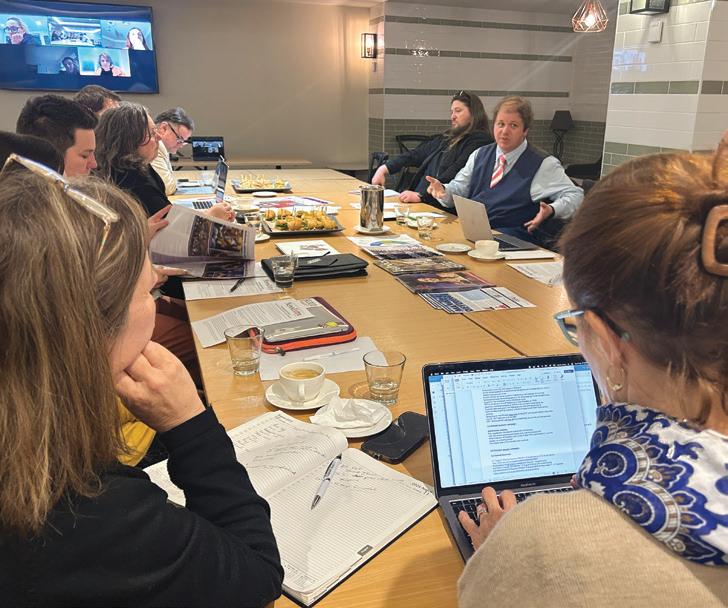
Members at the Southern Suburbs Sub Branch meeting
Southern Suburbs
The Southern Suburbs Sub Branch covers the St George area and Sutherland Shire.
There was a great turnout in person and on Zoom at the Southern Suburbs Sub Branch meeting. A growing number of reps from independent schools expressed concerns about the suggested workload solution presented by the Association of Independent Schools: that is, increased mandatory attendance during student holiday periods, as well as classification of teacher’s aides and support staff pay in general (see page 3).
Catholic systemic reps raised issues concerning time-consuming WHS compliance in TAS classrooms, a lack of support to enable testing of phonics with primary school students, and disruption to learning caused by the Amadeus program. Thinking forward to the renegotiations of their agreement, they suggested a limit on the number of students in prac classes.
The meeting welcomed industrial officer George Maniatis, who talked about the ongoing negotiations for members in Christian schools, and IEU media and communications coordinator Monica Crouch, who updated the sub branch on the union’s campaign for pay rises for community preschool teachers and recent media event (see page 8).
The Term 4 meeting is scheduled for Wednesday 30 October.
Josef Dabbs Organiser
The big discussion in the sector in recent months has been the federal government’s ongoing crackdown on the international student sector.
In the wake of the pandemic, overseas arrivals ballooned, with nearly half a million people coming into the country in 2022-23, a large proportion of whom were international students.
This surge largely involved a fair degree of catch-up following the closed borders of the Covid era and, even if the government did nothing, it’s highly likely numbers would have soon settled down around the long-term average.
A controversial topic
There are fewer issues as contentious in Australian politics as immigration, and the government soon felt the need to ‘do something’ about migration numbers –and given that international students make up a hefty proportion of overall arrivals, that probably seemed like the safest bet.
So late last year, Canberra started its now months-long war on the international student sector, with visas being denied outright to students from certain countries, application fees for student visas more than doubling, and heavy hints that the government would impose caps on total numbers if things did not go the way it wanted.
An overstated problem
For its part, the government is arguing that the industry is rife with bad actors, and that there is a need, as Education Minister Jason Clare said, to “protect the integrity of this system and its social licence to operate”. There’s some truth to this, of
course, but it’s an overstated problem, and the government is putting a largely successful $448 billion program at risk in the name of weeding out a relatively small number of dodgy operators.
There is of course a need for better regulation in the sector, not least in the employment conditions endured by many teachers and general staff, and also by the students themselves, given they typically congregate in the low-wage, gig economy. It’s worth remembering that the Albanese government has indeed introduced some significant improvements for gig workers.
Complaints are nothing new
Employers are not without self-interest in their complaints. If it were up to the industry, there would be no limits at all on the sector, so it is always best to take some of these complaints with a grain of salt.
I’ve been around the industry long enough to know that employers often complain that something or other is about to destroy the industry, and so there is a degree of “boy who cried wolf” about some of their commentary.
But the crackdown has now arguably gone too far, and is putting at risk the livelihoods of IEU members in the sector. Certainly, any suggestion of quotas should be put on hold, and the government should also reconsider the recent visa fee increases. Given immigration numbers have already declined since the peak of 2022-23, it’s time to ease off the crackdown and give education, which is Australia’s largest export industry outside of agriculture and mining, a chance.
Kendall Warren Organiser

Listen to our podcast on saving

Wait for it – drum roll! From 1 July 2024, your superannuation guarantee (SG) contributions increased from 11% to 11.5%.
You may not notice it much now, but it will add up over years thanks to the power of compounding interest.
It’s been a long and winding road from 1988 when NGS Super was set up and Catholic school employers and the Association of Indpendent Schools began contributing 3% of salaries, to 1992 when the Keating Labor government introduced universal super, also at 3%, to the current super guarantee of 11.5%.
The original design, established by the Keating Labor government, aimed for a 12% employer contribution for all workers. It’s just moved up to 11.5% and will move up again to 12% on 1 July 2025.
This increase will assist in providing workers in Australia with a dignified retirement as well as creating a substantial pool of national savings.
Lifting of concessional cap
Another significant change is the lifting of the concessional contributions caps. It moves up from the current $27,500 a year to $30,000 per annum. The caps are called ‘concessional’ because those who contribute receive a tax discount and pay 15% tax when the money goes into super.
It should be noted that employer contributions are counted in the $30,000 limit as are salary sacrifice contributions. So, the real benefit of salary sacrifice contributions is the difference between the marginal tax payable and the concessional 15%.
When planning your level of contributions for the new financial year, it may be advisable to contact your fund or a financial planner or your business manager to set your salary sacrifice amount. There is also a provision to use up unused caps for the previous five years for those who want to build up their super via a lump sum.
The five-year unused cap limit for this financial year is $137,500. Again, tax rules apply so it’s best to check with your fund or financial planner to ensure you’re within the boundaries of the unused caps provisions.
Lifting of non-concessional cap
Non-concessional superannuation caps have also been lifted. This refers to after-tax money you may wish to contribute into super. Since the government assumes that tax has already been paid on these contributions, there is no further tax payable when received by the super fund up to the cap.
The new cap is $120,000, up from $110,000 from the last financial year. Non-concessional contributions can come from the sale of a property, the sale of financial assets such as shares or, in some cases, an inheritance.
It is also possible to gross up these
payments for three years ahead to an amount of $360,000. These contributions are only available to people with balances under $1.9 million. And the maximum transfer balance cap for a superannuation pension (income stream) is also $1.9 million for those under the age of 75.
Pensions and income streams
For those receiving an account-based pension or income stream, the beginning of a new financial year is a good time to ‘refresh’ it. Are you satisfied with your investment options? Are your payments adequate to suit your lifestyle? Do you require the minimum drawdown, or a higher amount?
The minimum drawdown requirements are: 4% for under 65; 5% for those between 65 to 74; 6% for ages between 75 and 79; 7% for ages 80 to 84; 9% for 85 to 89; 11% for 90 to 94; and 14% for 95 or over.
This is because successive governments want members to use and spend their super rather than keep it for estate planning. If you have any questions regarding your accountbased pension, contact your fund to assist you with the ‘refresh’.
Understand insurance
And it’s always important to check and understand your insurance. Most industry funds offer life cover, total and permanent disability insurance and many also offer income protection. As your life circumstances change, it may be prudent to change your insurance cover to ensure you are not paying too much or perhaps your cover is inadequate for your needs.
Are your beneficiaries up to date, or has your situation changed? Events such as the birth of a child, a marriage/divorce or a pay increase may give rise to a need to update your insurance cover. Insurance offered through an industry fund is a genuine benefit because the sheer size of the policy helps to reduce the cost.
So, some things to think about for this new financial year. Contact your fund for help if you think you need it. Take the time to understand how your super and insurance work. You don’t have to be at the end of the long and winding road to retirement to take advantage of the benefits offered through superannuation. You can do it earlier.
Bernard O’Connor (former Company Secretary NGS Super)
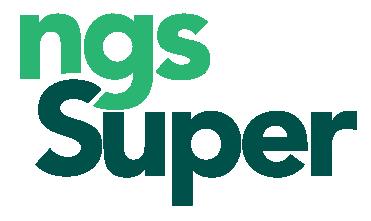

Secretary Carol Matthews
Eora Nation
Deputy Secretary
David Towson
Eora Nation
Assistant Secretary
Lyn Caton
Dharug Nation
Assistant Secretary
Amanda Hioe
Eora Nation
President
Position vacant
Vice President Systemic
Liz Heggart
Penola Catholic College Emu Plains
Dharug Nation
Vice President Non Systemic
Helen Templeton
St Scholastica’s College Glebe Eora Nation
Vice President Support Staff
Kylie Booth-Martinez
Assumption Catholic Primary School and St Stanislaus College Bathurst Wiradjuri Nation
Vice President ECS
Michelle Thompson
Shore Preparatory School
Early Learning Centre Northbridge Eora Nation
Vice President ACT
Andrew Dane Brindabella Christian College Lyneham Ngunawal Nation
Financial Officers
Denise McHugh
NESA Liaison Officer Kamilaroi Nation
Suzanne Penson MacKillop College Port Macquarie Birpai Nation
General Executive Members
Nicole Downey
St Mary’s Catholic Primary School Orange Wiradjuri Nation
Sarah Gardiner
Catherine McAuley Catholic College Medowie
Worimi Nation
Amy Kermode
Mount St Joseph Milperra
Eora Nation
Glenn Lowe
St Joseph’s Catholic High School
Albion Park Dharawal Nation
Anna Luedi
Villa Maria Catholic Primary School
Hunters Hill Dharug Nation
Raelene Maxworthy NESA Subject Matter Officer – Curriculum Kamilaroi Nation
Peter Moore
Our Lady of Mercy College Burraneer Tharawal Nation
Markus Muschal
St John Paul College Coffs Harbour Gumbaynggirr Nation
Christine Wilkinson
St Joseph’s Catholic College East Gosford Darkinjung Nation
Amanda Wood
St Aloysius Primary School Chisholm Awabakal Nation


Author: Dr Billy Garvey
Publisher: Penguin Books
Children of all ages are grappling with anxiety, depression, low self-esteem and behavioural issues, and it can take years to see an expert who can help them.
Regardless of whether you have a young child or a teen on the brink of adulthood, by understanding the foundations of good mental health, you will be able to help them to thrive at any stage in their development.

Author: Paul Murray
Publisher: Penguin Books
Shortlisted for the Booker Prize 2023
The Barnes family are in trouble. Until recently they ran the biggest business in town, now they’re teetering on the brink of bankruptcy – and that’s just the start of their problems. Dickie and Imelda’s marriage is hanging by a thread; straight-A student Cass is careening off the rails; PJ is hopelessly in debt to the school bully. Meanwhile the ghosts of old mistakes are rising out of the past to meet them, but everyone’s too wrapped up in the present to see the danger looming . . .

Authors: Scotty James and Steve Worland
Illustrator: David Atze
Publisher: Penguin Books
Adventure has a new name and it is MOOKi.
Join MOOKi and his best friends Cindy and Ralph as they climb an epic mountain, facing heart-stopping challenges and meeting amazingly unexpected characters along the way. Age six and up.
To go in the draw, email entries to giveaways@ieu.asn.au with the title of the book you would like to receive in the subject line. Write your name, membership number and postal address in the body of your email. All entries must be received by 27 September 2024.

